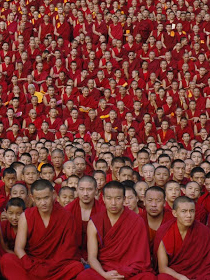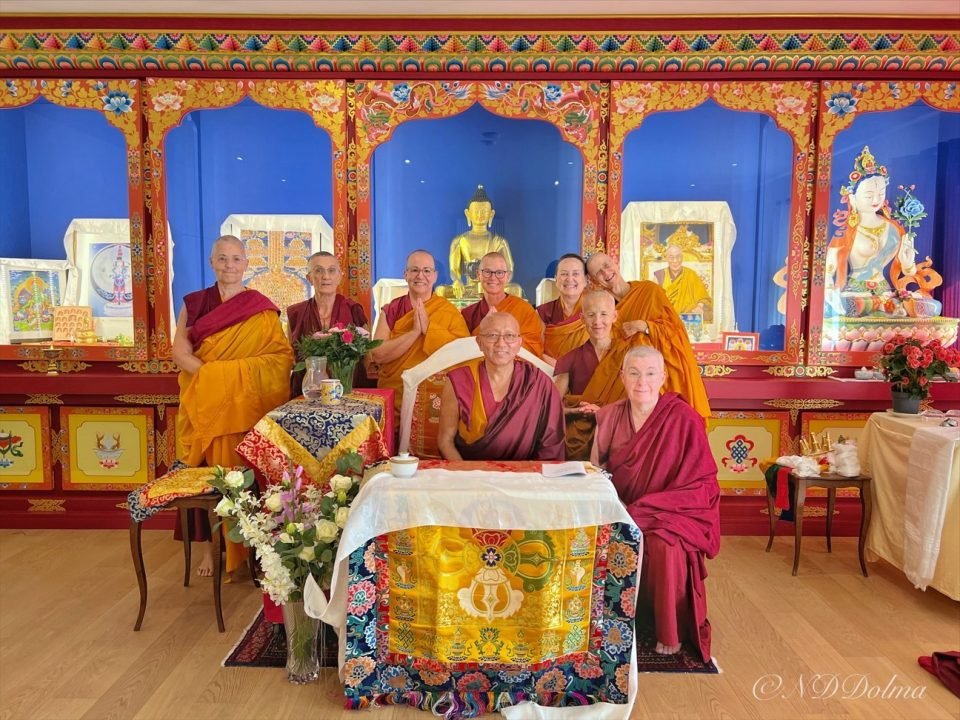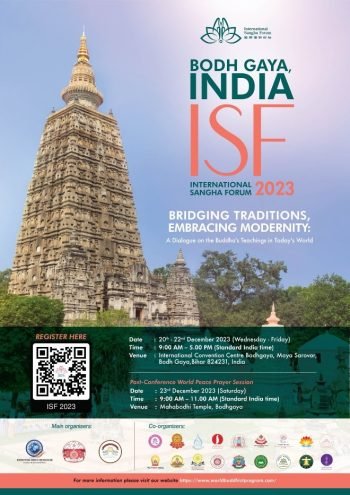- Home
- FPMT Homepage
Foundation for the Preservation of the Mahayana Tradition
The FPMT is an organization devoted to preserving and spreading Mahayana Buddhism worldwide by creating opportunities to listen, reflect, meditate, practice and actualize the unmistaken teachings of the Buddha and based on that experience spreading the Dharma to sentient beings. We provide integrated education through which people’s minds and hearts can be transformed into their highest potential for the benefit of others, inspired by an attitude of universal responsibility and service. We are committed to creating harmonious environments and helping all beings develop their full potential of infinite wisdom and compassion. Our organization is based on the Buddhist tradition of Lama Tsongkhapa of Tibet as taught to us by our founders Lama Thubten Yeshe and Lama Thubten Zopa Rinpoche.
- Willkommen
Die Stiftung zur Erhaltung der Mahayana Tradition (FPMT) ist eine Organisation, die sich weltweit für die Erhaltung und Verbreitung des Mahayana-Buddhismus einsetzt, indem sie Möglichkeiten schafft, den makellosen Lehren des Buddha zuzuhören, über sie zur reflektieren und zu meditieren und auf der Grundlage dieser Erfahrung das Dharma unter den Lebewesen zu verbreiten.
Wir bieten integrierte Schulungswege an, durch denen der Geist und das Herz der Menschen in ihr höchstes Potential verwandelt werden zum Wohl der anderen – inspiriert durch eine Haltung der universellen Verantwortung und dem Wunsch zu dienen. Wir haben uns verpflichtet, harmonische Umgebungen zu schaffen und allen Wesen zu helfen, ihr volles Potenzial unendlicher Weisheit und grenzenlosen Mitgefühls zu verwirklichen.
Unsere Organisation basiert auf der buddhistischen Tradition von Lama Tsongkhapa von Tibet, so wie sie uns von unseren Gründern Lama Thubten Yeshe und Lama Thubten Zopa Rinpoche gelehrt wird.
- Bienvenidos
La Fundación para la preservación de la tradición Mahayana (FPMT) es una organización que se dedica a preservar y difundir el budismo Mahayana en todo el mundo, creando oportunidades para escuchar, reflexionar, meditar, practicar y actualizar las enseñanzas inconfundibles de Buda y en base a esa experiencia difundir el Dharma a los seres.
Proporcionamos una educación integrada a través de la cual las mentes y los corazones de las personas se pueden transformar en su mayor potencial para el beneficio de los demás, inspirados por una actitud de responsabilidad y servicio universales. Estamos comprometidos a crear ambientes armoniosos y ayudar a todos los seres a desarrollar todo su potencial de infinita sabiduría y compasión.
Nuestra organización se basa en la tradición budista de Lama Tsongkhapa del Tíbet como nos lo enseñaron nuestros fundadores Lama Thubten Yeshe y Lama Zopa Rinpoche.
A continuación puede ver una lista de los centros y sus páginas web en su lengua preferida.
- Bienvenue
L’organisation de la FPMT a pour vocation la préservation et la diffusion du bouddhisme du mahayana dans le monde entier. Elle offre l’opportunité d’écouter, de réfléchir, de méditer, de pratiquer et de réaliser les enseignements excellents du Bouddha, pour ensuite transmettre le Dharma à tous les êtres. Nous proposons une formation intégrée grâce à laquelle le cœur et l’esprit de chacun peuvent accomplir leur potentiel le plus élevé pour le bien d’autrui, inspirés par le sens du service et une responsabilité universelle. Nous nous engageons à créer un environnement harmonieux et à aider tous les êtres à épanouir leur potentiel illimité de compassion et de sagesse. Notre organisation s’appuie sur la tradition guéloukpa de Lama Tsongkhapa du Tibet, telle qu’elle a été enseignée par nos fondateurs Lama Thoubtèn Yéshé et Lama Zopa Rinpoché.
Visitez le site de notre Editions Mahayana pour les traductions, conseils et nouvelles du Bureau international en français.
Voici une liste de centres et de leurs sites dans votre langue préférée
- Benvenuto
L’FPMT è un organizzazione il cui scopo è preservare e diffondere il Buddhismo Mahayana nel mondo, creando occasioni di ascolto, riflessione, meditazione e pratica dei perfetti insegnamenti del Buddha, al fine di attualizzare e diffondere il Dharma fra tutti gli esseri senzienti.
Offriamo un’educazione integrata, che può trasformare la mente e i cuori delle persone nel loro massimo potenziale, per il beneficio di tutti gli esseri, ispirati da un’attitudine di responsabilità universale e di servizio.
Il nostro obiettivo è quello di creare contesti armoniosi e aiutare tutti gli esseri a sviluppare in modo completo le proprie potenzialità di infinita saggezza e compassione.
La nostra organizzazione si basa sulla tradizione buddhista di Lama Tsongkhapa del Tibet, così come ci è stata insegnata dai nostri fondatori Lama Thubten Yeshe e Lama Zopa Rinpoche.
Di seguito potete trovare un elenco dei centri e dei loro siti nella lingua da voi prescelta.
- 欢迎 / 歡迎
简体中文
“护持大乘法脉基金会”( 英文简称:FPMT。全名:Foundation for the Preservation of the Mahayana Tradition) 是一个致力于护持和弘扬大乘佛法的国际佛教组织。我们提供听闻,思维,禅修,修行和实证佛陀无误教法的机会,以便让一切众生都能够享受佛法的指引和滋润。
我们全力创造和谐融洽的环境, 为人们提供解行并重的完整佛法教育,以便启发内在的环宇悲心及责任心,并开发内心所蕴藏的巨大潜能 — 无限的智慧与悲心 — 以便利益和服务一切有情。
FPMT的创办人是图腾耶喜喇嘛和喇嘛梭巴仁波切。我们所修习的是由两位上师所教导的,西藏喀巴大师的佛法传承。
繁體中文
護持大乘法脈基金會”( 英文簡稱:FPMT。全名:Found
ation for the Preservation of the Mahayana Tradition ) 是一個致力於護持和弘揚大乘佛法的國際佛教組織。我們提供聽聞, 思維,禪修,修行和實證佛陀無誤教法的機會,以便讓一切眾生都能 夠享受佛法的指引和滋潤。 我們全力創造和諧融洽的環境,
為人們提供解行並重的完整佛法教育,以便啟發內在的環宇悲心及責 任心,並開發內心所蘊藏的巨大潛能 — 無限的智慧與悲心 – – 以便利益和服務一切有情。 FPMT的創辦人是圖騰耶喜喇嘛和喇嘛梭巴仁波切。
我們所修習的是由兩位上師所教導的,西藏喀巴大師的佛法傳承。 察看道场信息:
- FPMT Homepage
- News/Media
-
- Study & Practice
-
-
- About FPMT Education Services
- Latest News
- Programs
- New to Buddhism?
- Buddhist Mind Science: Activating Your Potential
- Heart Advice for Death and Dying
- Discovering Buddhism
- Living in the Path
- Exploring Buddhism
- FPMT Basic Program
- FPMT Masters Program
- FPMT In-Depth Meditation Training
- Maitripa College
- Lotsawa Rinchen Zangpo Translator Program
- Universal Education for Compassion & Wisdom
- Online Learning Center
-
- Prayers & Practice Materials
- Overview of Prayers & Practices
- Full Catalogue of Prayers & Practice Materials
- Explore Popular Topics
- Benefiting Animals
- Chenrezig Resources
- Death & Dying Resources
- Lama Chopa (Guru Puja)
- Lama Zopa Rinpoche: Compendium of Precious Instructions
- Lama Zopa Rinpoche: Life Practice Advice
- Lama Zopa Rinpoche Practice Series
- Lamrim Resources
- Mantras
- Prayer Book Updates
- Purification Practices
- Sutras
- Thought Transformation (Lojong)
- Audio Materials
- Dharma Dates - Tibetan Calendar
- Translation Services
- Publishing Services
- Ways to Offer Support
- Prayers & Practice Materials
-
- Teachings and Advice
- Find Teachings and Advice
- Lama Zopa Rinpoche Advice Page
- Lama Zopa Rinpoche: Compendium of Precious Instructions
- Lama Zopa Rinpoche Video Teachings
- ༧སྐྱབས་རྗེ་བཟོད་པ་རིན་པོ་ཆེ་མཆོག་ནས་སྩལ་བའི་བཀའ་སློབ་བརྙན་འཕྲིན།
- Podcasts
- Lama Yeshe Wisdom Archive
- Buddhism FAQ
- Dharma for Young People
- Resources on Holy Objects
- Teachings and Advice
-
-
*If a menu item has a submenu clicking once will expand the menu clicking twice will open the page.
-
-
- Centers
-
- Teachers
-
- Projects
-
-
-
-
*If a menu item has a submenu clicking once will expand the menu clicking twice will open the page.
-
-
- FPMT
-
-
-
-
-
If we want to understand how we are ordinarily misled by our false projections and how we break free from their influence, it is helpful to think of the analogy of our dream experiences. When we wake up in the morning, where are all the people we were just dreaming about? Where did they come from? And where did they go? Are they real or not?
Lama Thubten Yeshe
-
-
-
- Shop
-
-
-
The Foundation Store is FPMT’s online shop and features a vast selection of Buddhist study and practice materials written or recommended by our lineage gurus. These items include homestudy programs, prayers and practices in PDF or eBook format, materials for children, and other resources to support practitioners.
Items displayed in the shop are made available for Dharma practice and educational purposes, and never for the purpose of profiting from their sale. Please read FPMT Foundation Store Policy Regarding Dharma Items for more information.
-
-
Ordained Sangha
20
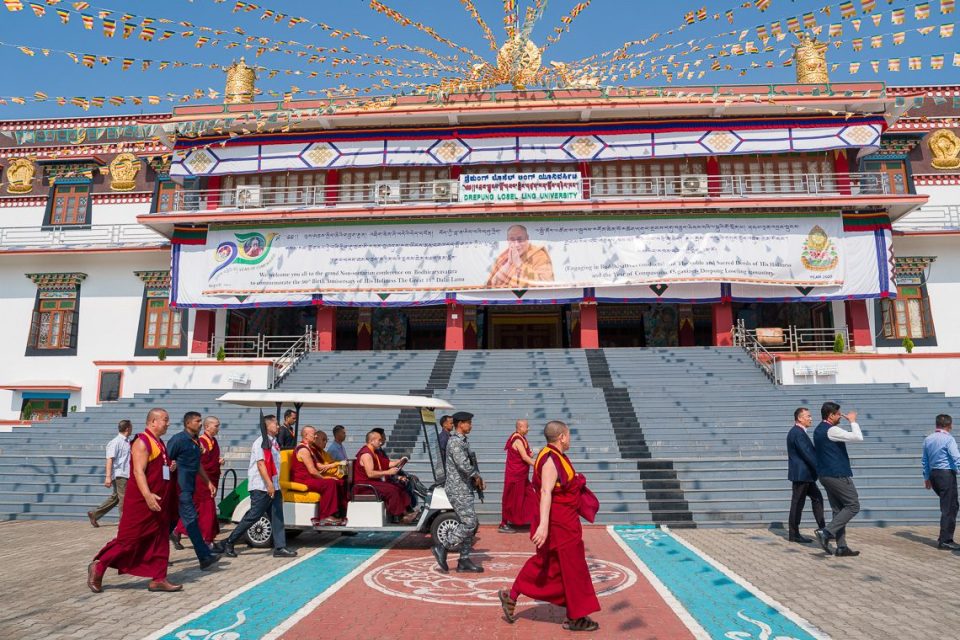
His Holiness the Dalai Lama arriving at the final session of the annual Winter Jang Debate at Drepung Monastery, January 18, 2026. Photo by Tenzin Choejor/OHHDL; courtesy of dalailama.com
As a tremendous blessing to all of the monks participating, His Holiness the Dalai Lama attended the annual Winter Jang Debate, held this year at Drepung Monastery, South India. Two-thousand monks participated from over twenty monasteries.
This annual debate dates back to the time of Lama Tsongkhapa and was continued each year until 1959. In 1981 the present and former abbots of the three great monasteries met to revive this debate. However, due to costs the monasteries were only able to sponsor about 200 monks to attend. Seeing the incredible importance of this tradition of bringing together the best scholars to hone their understanding of the Buddha’s highest teachings, Lama Zopa Rinpoche, through the Lama Tsongkhapa Teachers Fund, became the primary sponsor for this debate over twenty years ago. Read more about the history of the Winter Jang Debate.
Sera Jey Monastery recently released a paper, written by the monks, about the history of this powerful tradition and the schedule and activities during the program:
The schedule during winter debate starts at 8.45 a.m. and goes each day to 10.30 p.m., but often the debates last well past midnight. There is prayers, a teaching and six debate sessions throughout the day.
The sangha attending the Jang Gun Choe includes monks from Sera, Ganden, Drepung, Tashi Lhunpo, Gyumed, Gyuto, Zongchoe, Rato, Sedgyu, and Namgyal monasteries, as well as monks from other non-sectarian monasteries in India, Nepal, and Bhutan. In total, thousands of monks gather for this Winter Debate Program.
The main subject studied during this session is logic (Pramāṇa). The study is based primarily on the works of the great Indian master Dharmakīrti, such as:
-
- Tsema Namdrel (Pramāṇavārttika (Commentary on Valid Cognition)
- Tsema Namnye, Pramāṇasamuccaya (Compendium of Valid Cognition)
- Rigthik, Tattvasaṅgraha (Essence of Logic)
In addition, the works of Master Dignāga, especially Pramāṇasamuccaya and its commentaries, are studied. Important Indian and Tibetan commentaries are also included, such as:
-
- Tharlam Sal-byed (Illumination of the Path to Liberation) by Gyaltsab Rinpoche
- Tika Chen Rigpai Gyatso (Great Commentary, Ocean of Reasoning) by Khedrup Je
- Tsadma Deden Yikyi Munsel (Dispelling the Darkness of the Mind on the Seven Pramāṇa Treatises)
- Tsadma Riggyen (Ornament of Logic) by Gyalwa Gendun Drub
The letter also includes a gracious thank you to FPMT for the years of sponsorship:
We would like to express our heartfelt gratitude for the generous financial support that has been continuously provided over many years to promote and strengthen monastic education, including the Winter Debate Program. This support has been of great benefit to the study centers and the monastic community.
We also continually offer prayers and take refuge during our assemblies, sincerely wishing that all the activities of the FPMT may proceed smoothly and without any obstacles.
Please read their full paper.
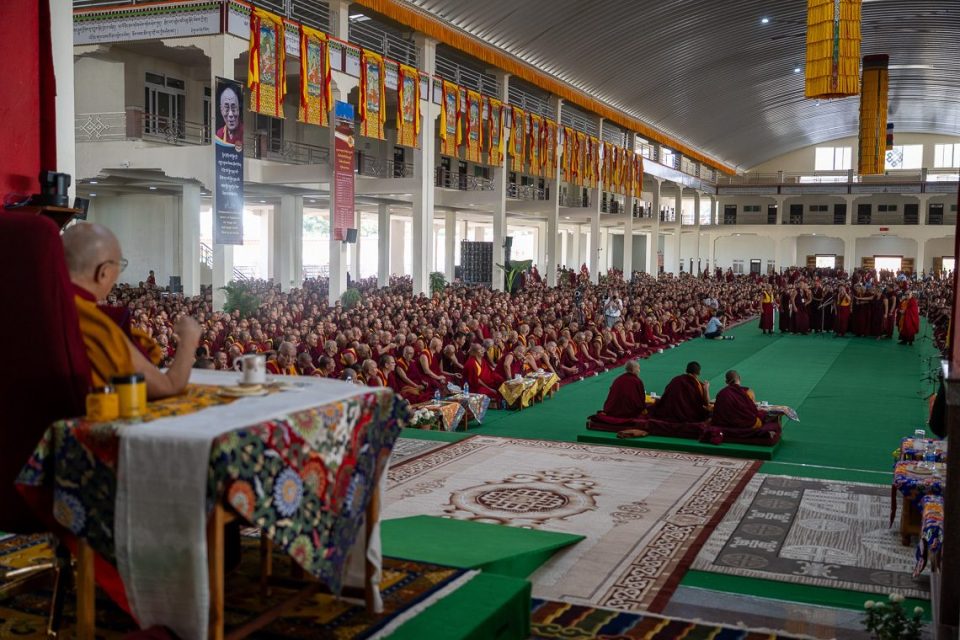
His Holiness the Dalai Lama attending a debate presentation at Drepung Monastery, January 4, 2026. Photo by Zamling Norbu/OHHDL; courtesy of dalailama.com
Many photos of this year’s Winter Jang Debate including His Holiness the Dalai Lama are available to view.
Please join us in rejoicing in this tremendous blessing of His Holiness’s presence to all participants of the Winter Debate program!
The Lama Tsongkhapa Teachers Fund supports the annual Gelugpa exam and monks and nuns to attend the annual winter debate among many other activities.
- Tagged: winter debate, winter jang debate
16
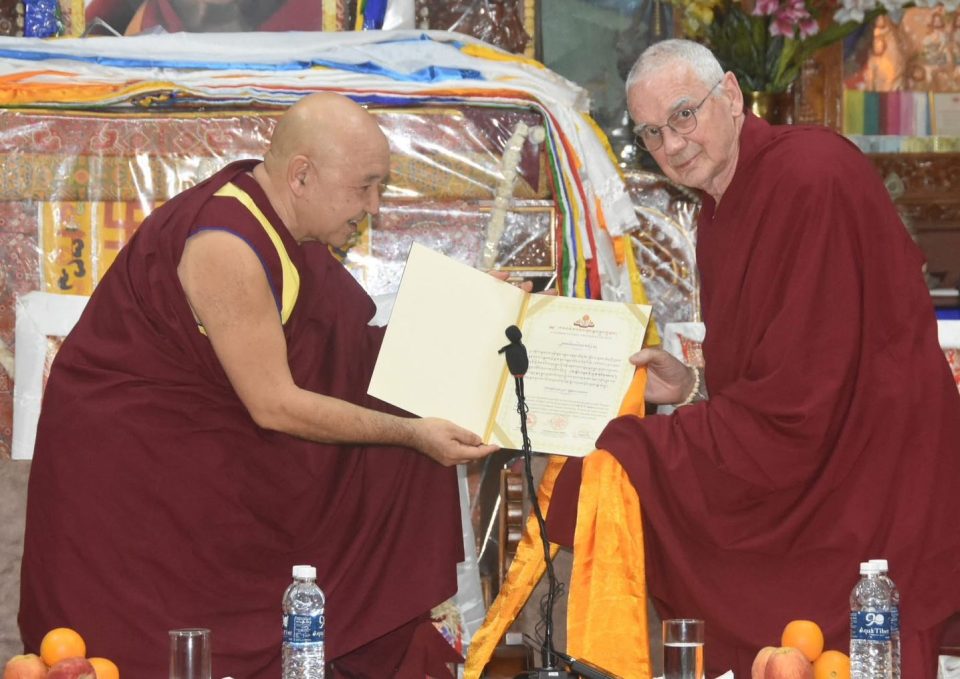
Ven. Roger Kunsang receiving a certificate of thanks from Khen Rinpoche Geshe Ngawang Sangye, on behalf of Lama Zopa Rinpoche and the FPMT organization for the offerings made towards the Gyudmed Monastery Food Fund. (close up of certificate can be seen below).
Supporting monks and nuns is one of the highest priorities for the FPMT organization, because the preservation of the Buddhadharma is dependent on the existence of Sangha. The Supporting Ordained Sangha Fund (SOSF) was created to uphold this commitment by offering practical and compassionate assistance to ordained individuals and communities around the world.
The scope of the SOSF is broad and inclusive – it provides support for food, accommodation, health care, education, and practice to monasteries, nunneries, and individual Sangha members across many traditions and regions. The fund is not limited to any one institution, allowing it to respond flexibly and generously to the needs of the global Sangha.
In 2025, we were honored to have offered a total of US$932,361 in grants, helping ensure that monks and nuns can live, study, and practice with dignity and stability. Two of these grants fulfilled long-standing commitments made by Lama Zopa Rinpoche, allowing us to bring two of Rinpoche’s heartfelt wishes to completion in 2025. Please join us in rejoicing in these offerings to the Sangha and we invite you to take a closer look at the various ways we have been able to offer this collective support.
Gyudmed Food Fund | Ribur Rinpoche Tenzin Pasang | Tashi Chime Gatsal Gumba | Jamyang Buddhist Centre | International Mahayana Institute | Nalanda Monastery | Thame Dechen Chokhorling Monastery | Zigar Thupten Shedrupling Institute | Shalu Monastery | Osel Labrang at Sera Jey | Idgaa Choizinling Monastery | Geshe Support | Thank you!
Founded in 1433 by Jetsun Sherab Sengye, a direct disciple of Lama Tsongkhapa, Gyudmed Tantric University is one of the most important centers for Tantric studies in the Gelugpa tradition of Tibetan Buddhism. Lama Tsongkhapa personally appointed Jetsun Sherab Sengye as His spiritual successor in Tantra, entrusting him with the preservation and transmission of the Tantric lineage.
Inspired by ancient Indian universities like Nalanda, Gyudmed was established to complement the Sutra-focused institutions of Sera, Drepung, and Ganden Monasteries. It became a hub for Tantra philosophy, mandala construction, ritual arts, and intact lineage transmission, including teachings on Guhyasamaja and other deities.
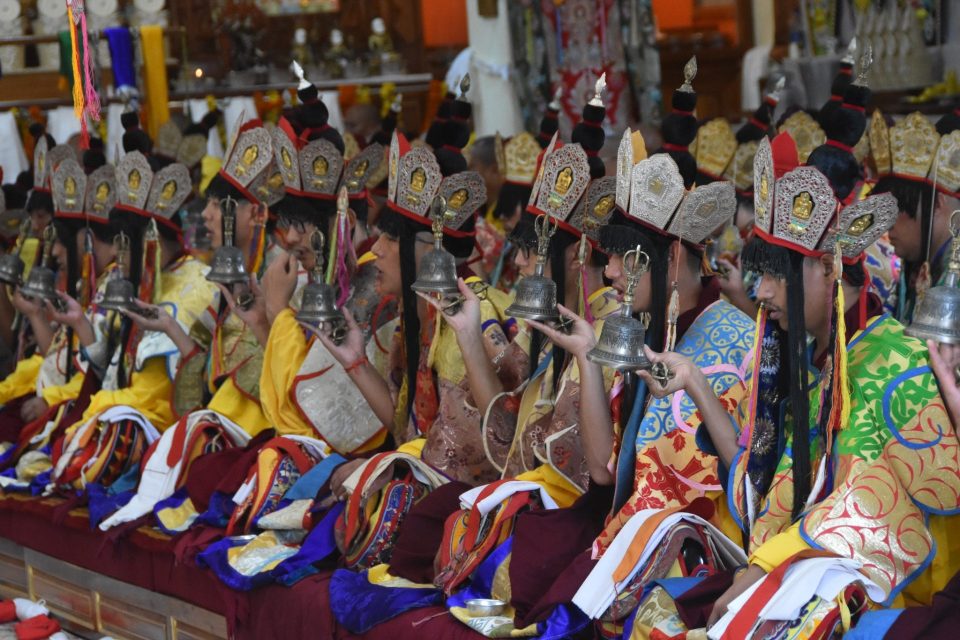
Gyudmed monks engaged in puja.
Following the 1959 Tibetan uprising, 150 monks from Gyudmed fled to India and temporarily settled in Dalhousie. In 1972, with support from His Holiness the 14th Dalai Lama and the Government of Karnataka, the monastery was permanently relocated to Gurupura, South India. Today, it houses over 600 monks and continues to uphold its rich Tantric traditions.
Gyudmed offers a 15-year curriculum combining Sutra and Tantra studies. Monks engage in daily memorization, chanting, and evening debates. Upon completion, monks earn the Geshe Ngarampa degree, recognized by the Central Tibetan Administration (CTA). Each year, Geshes from major monasteries undertake a one-year Tantra course at Gyudmed, culminating in examinations witnessed by abbots of the six great monasteries.
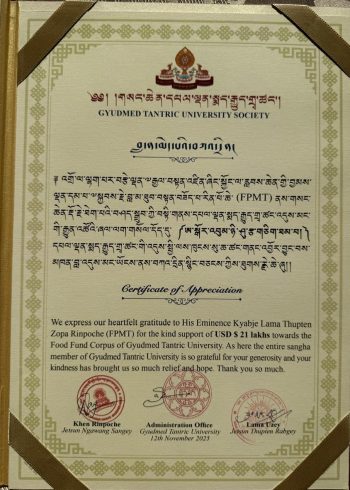
Certificate of thanks offered to Ven. Roger Kunsang from Gyudmed Monastery.
Unfortunately, Gyudmed Monastery has no stable source of income, particularly to meet the daily food needs of its monks. Recognizing this urgent need, the monastery requested Lama Zopa Rinpoche and the FPMT to establish a long-term solution. Rinpoche immediately accepted, and the Gyudmed Food Fund was created in 2021 to provide reliable, lasting support.
In 2025, we were able to fulfill Rinpoche’s commitment and four installments totaling US$681,942 were offered toward the Gyudmed Food Fund. Most of this money raised in 2025 was from specific private donations, thus we were able to also preserve the existing funds in SOSF. With this contribution, we have now completed the US$2.1 million endowment, which will ensure that all Gyudmed Tantric University’s food expenses are covered sustainably from the interest. Please rejoice in this incredible offering and achievement, in fulfilling one of Rinpoche’s heart requests and in the long term sustainability that we as an organization are offering to the Sangha of Gyudmed. In November 2025, Ven. Roger Kunsang went to Gyudmed to make the final offering in person, on behalf of FPMT and Lama Zopa Rinpoche.
On behalf of the current Ribur Rinpoche Tenzin Pasang, a request was made for financial support to complete renovations at his Labrang (residence) at Sera Mey Monastery, India. The residence was originally built by the previous Ribur Rinpoche, a highly realized master and guru of Kyabje Lama Zopa Rinpoche, to serve as a place for study and practice for his future incarnation.
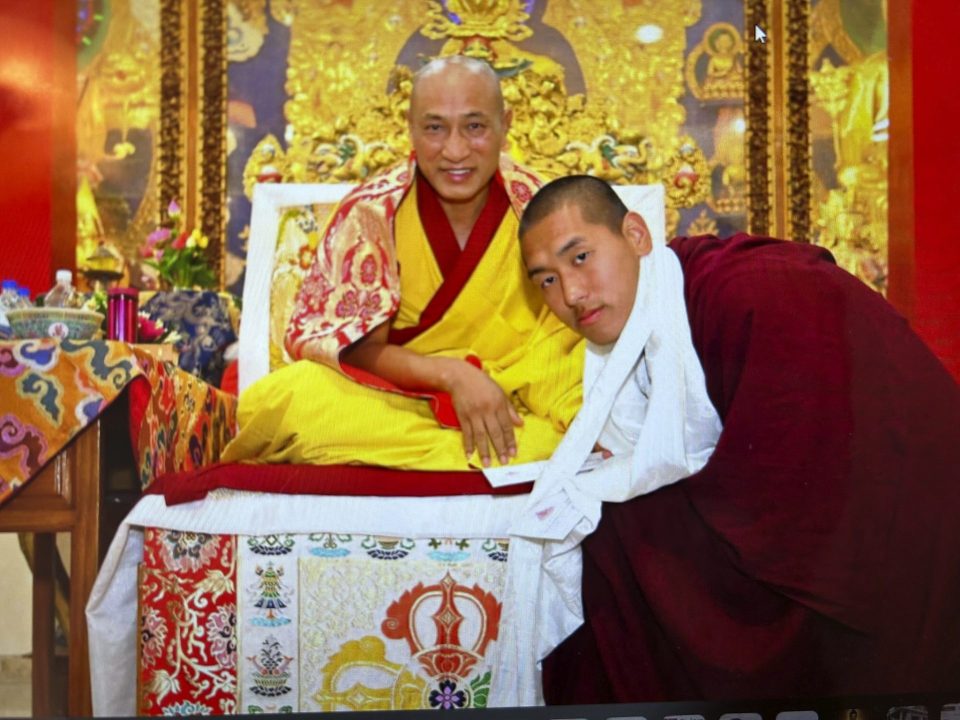
Ribur Rinpoche Tenzin Pasang with the current Abbot of Sera Mey Monastery Khen Rinpoche Neten Rinpoche.
In 2025, the SOSF offered a grant toward this project, honoring the lineage and ensuring the continuity of Dharma activities.
Nestled in the serene hills of Bigu, Northeastern Nepal, Tashi Chime Gatsal Gumba is a small Drikung Kagyu nunnery with a profound spiritual connection to Lama Zopa Rinpoche, who once described it as “being in the lap of Mother Tara.” Rinpoche personally initiated a beautiful arrangement over 14 years ago: for the nunnery to offer 100 million mani retreats once or twice a year, dedicating the merit to benefit the entire FPMT organization.
To date, the nuns have completed an astonishing 26 retreats, totaling 2.6 billion recitations of OM MANI PADME HUM – a testament to their unwavering dedication and compassion.
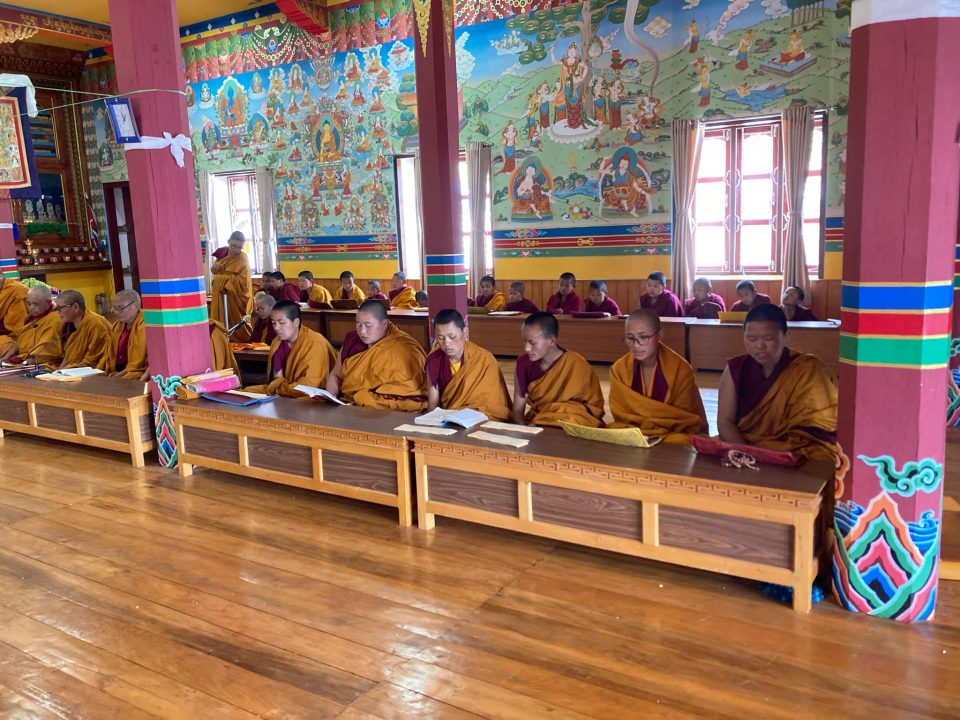
Tashi Chime Gatsal Gumba nuns.
In 2025, the SOSF contributed US$31,166.23 to support the nunnery’s ongoing activities. This funding has been vital in sustaining both spiritual and educational efforts, including:
- 150 million mani retreats, with offerings to the Sangha upon completion.
- Medical care for the nuns, ensuring their well-being during intensive practice periods.
- Salaries for six teachers, allowing younger nuns to receive a secular education within the nunnery itself – eliminating the need for long, difficult walks to distant schools.
The nunnery’s expense report and receipt documents reflect careful stewardship of the funds, covering essentials such as fresh milk, firewood, gas, transportation, and medical costs. The nuns have expressed heartfelt gratitude to all benefactors and continue to dedicate their prayers for the long life of His Holiness the Dalai Lama, the swift return of Kyabje Lama Zopa Rinpoche, and the flourishing of the Buddhadharma.
For nearly 50 years, Jamyang Buddhist Centre in London has been a place of Tibetan Buddhist practice, education, and community life. Housed in the historic Old Lambeth Magistrates’ Court, the Centre has transformed a once-defensive civic building into a vibrant spiritual home rooted in compassion, inclusivity, and sustainability.
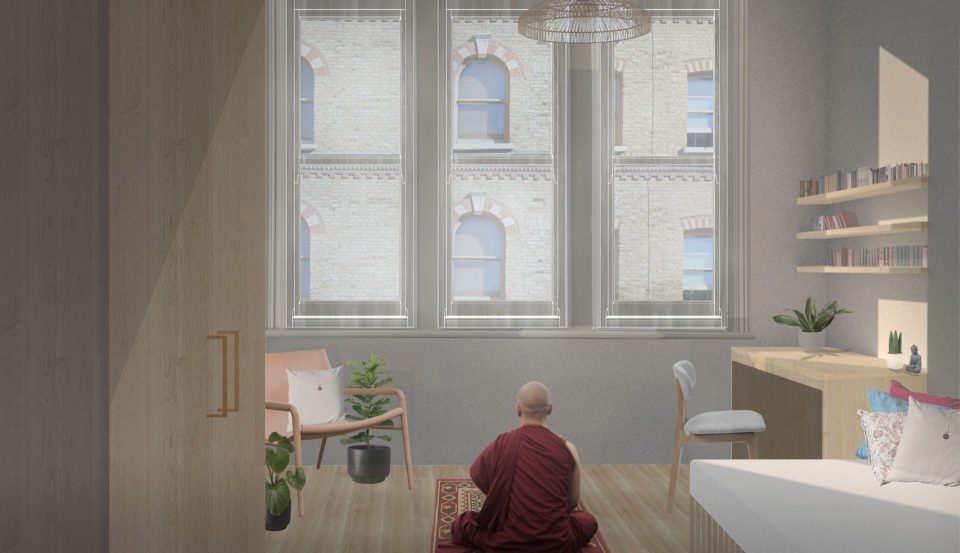
Rendering of a monastic bedroom at Jamyang Centre.
In 2025, the SOSF offered a grant of US$30,750 to support the Sanctuary Project, a visionary initiative to modernize and preserve this Grade II-listed building while expanding its role as a hub for learning, wellbeing, and social outreach. The project will provide expanded accommodation for monastics, teachers, and volunteers, alongside new accessible facilities including a lift, ramps, and inclusive design features. Environmental upgrades such as air source heat pumps, solar panels, and sustainable building materials will ensure that the Centre embodies ecological responsibility, while careful restoration will preserve its heritage character.
The Sanctuary Project also envisions revitalized gardens, with the north side becoming a contemplative space and the south courtyard opening as a community area with edible plants, prayer wheels, and water features. Inside, new teaching and gathering spaces will be created, including a renovated basement and improved access to the Temple, ensuring the Centre can welcome more people in meaningful ways.
Guided by the Buddhist principles of interdependence, non-harm, and care for all beings, Jamyang is shaping a true living sanctuary, a place where people from all walks of life can find peace, purpose, and connection.
In 2025, the SOSF granted US$1,038 to the International Mahayana Institute (IMI) to support its new Video Sharing Experience Project.
This initiative will produce a series of short, professionally edited videos, each lasting 5–10 minutes, featuring IMI monks and nuns as they share their personal experiences, challenges, and insights as ordained practitioners. The content will address questions collected from FPMT centers and aims to:
- Bridge the gap between laypeople and the Sangha.
- Provide guidance and inspiration for FPMT center staff, students, and those considering ordination.
- Make teachings accessible in multiple languages (English, Spanish, French, and Italian).
Currently in its early stages, the project already has at least seven ordained participants and several topics planned. Its goal is to create a meaningful resource that nurtures understanding, connection, and spiritual growth throughout the global FPMT community.
In 2025, the SOSF contributed US$5,000 to Nalanda Monastery, a long-established FPMT-affiliated monastic community in France.
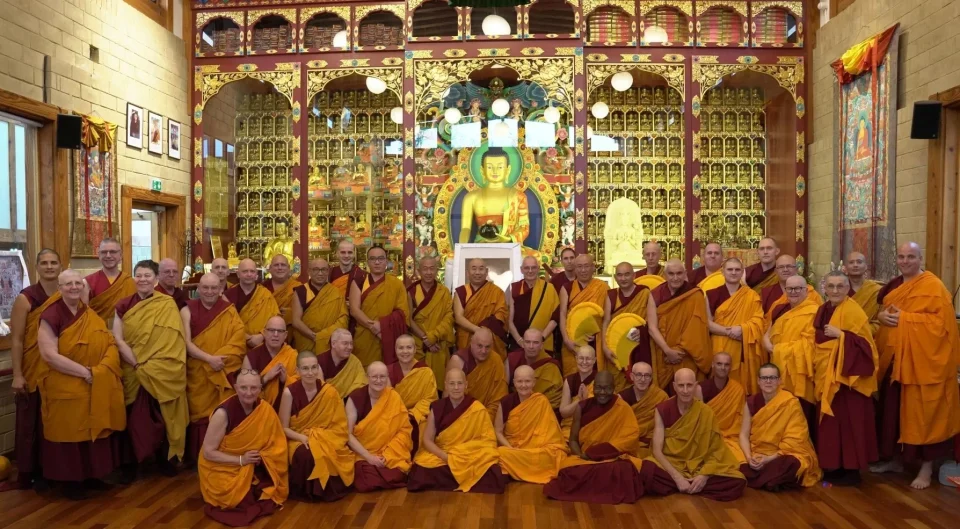
The first Gelug Monlam Festival in Europe, February 23-25, 2024, at Nalanda Monastery.
The grant supported two essential initiatives:
- Cavimac Insurance Support – US$3,500
Nalanda Monastery sought assistance to cover Cavimac, France’s private social and health insurance program for religious communities. The monastery pays about €3,300 each month to insure six monks who are not covered by their home countries. With an aging community and limited regular income, this support ensures the monks have access to healthcare and can legally reside at Nalanda. While donors often prefer to fund visible projects, such as building works or statues, the monastery emphasized that health insurance is a vital yet often overlooked need.
- Poor Monks Fund – US$1,500
The Poor Monks Fund provides emergency financial assistance to monks without personal income or savings. It helps cover travel expenses for visiting family or attending teachings, as well as medical costs not covered by insurance or IMI. By allowing the monastery to respond quickly to urgent needs without relying on direct donations to individuals, the fund offers both dignity and security. Nalanda expressed the hope that this fund will grow, as many monks hesitate to draw on it when resources are scarce.
Perched nearly 4,000 meters above sea level in the Solu Khumbu region, Nepal, Thame Dechen Chokhorling Monastery continues to be a spiritual sanctuary for the Himalayan community. As the birthplace of Lama Zopa Rinpoche and near the retreat cave of his previous incarnation, Lawudo Lama Kunsang Yeshe, Thame holds a special place in the heart of the FPMT family.
In 2023, the monks of Thame offered special daily prayers during the 49 days after Lama Zopa Rinpoche has shown the aspect of passing in front of Rinpoche’s kundung (holy body) in Kopan Monastery. In 2024, they participated in the consecration of the Victory Stupa in Lawudo, built for Rinpoche’s swift return. Their continued prayers and practice reflect a deep spiritual bond and commitment to Rinpoche’s vision.
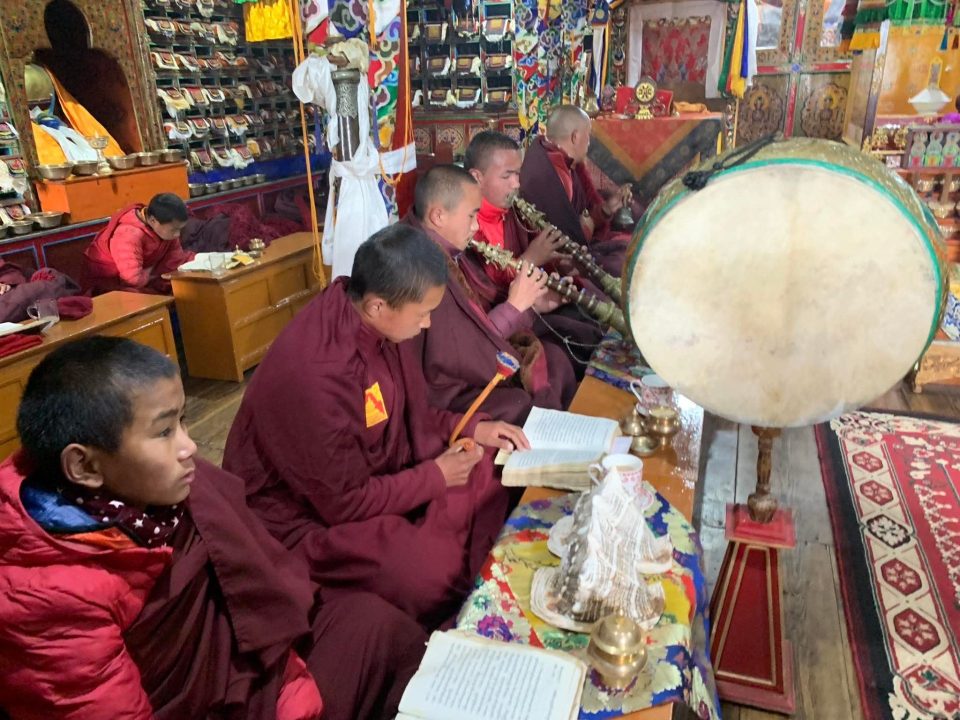
Thame monks performing a puja.
In 2025, the SOSF contributed US$9,106.28 to support the daily food needs of the 22 resident monks at Thame Monastery. This ongoing sponsorship, which began in 2017, ensures that the Sangha receives three nourishing meals a day, along with support for food transport and cook salaries.
In a heartfelt letter dated April 29, 2025, the monastery expressed profound gratitude for the support and shared their joy at the recent announcement by the FPMT and His Holiness the Dalai Lama, confirming that the reincarnation of Kyabje Lama Zopa Rinpoche has been born in Nepal and is yet to be discovered. The monks continue to offer daily prayers with deep devotion and hope.
Zigar Thupten Shedrupling Institute, nestled in the serene hills of Darjeeling, West Bengal, India, is dedicated to preserving the Drukpa Kargyud lineage. The monastery traces its origins to the first Zigar Rinpoche, Sonam Gyatsho (1608–1669), regarded as a manifestation of Guru Padmasambhava. Successive Zigar Rinpoches are recognized as incarnations of King Trisong Detsen, an emanation of Manjushri, the Wisdom Buddha.
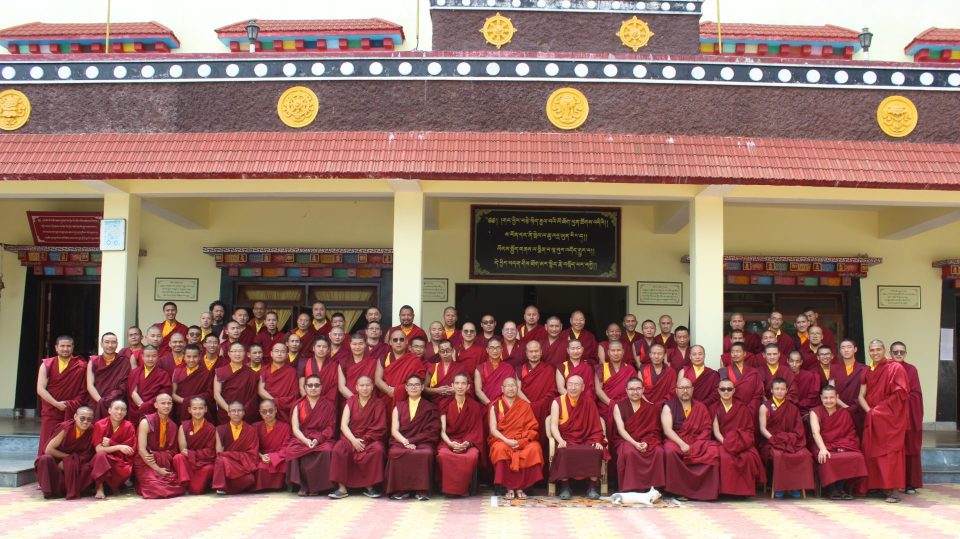
Zigar monks.
This is also the monastery of one of Lama Zopa Rinpoche’s own gurus – Khenpo Thinley Dorje, who attended the second anniversary since Rinpoche has shown the aspect of passing at Kopan Monastery. Although he does not reside at Zigar Monastery permanently, he helps guide the monastery, and Lama Zopa Rinpoche wished to support him in this way.
Since 2019, the SOSF has been honored to provide ongoing support for the monastery’s food expenses, ensuring that the monks are properly nourished and able to continue their studies and practice.
In 2025, SOSF contributed US$122,033, completing Lama Zopa Rinpoche’s compassionate pledge of US$200,000 specifically for food at the monastery. With these final installments, the pledge has now been fully realized, offering vital nourishment to the monastic community and sustaining the flourishing of this monastery.
In the peaceful foothills of Himachal Pradesh, India, Shalu Monastery continues its mission of reviving the Bhulug lineage tradition of Tibetan Buddhism. Founded by the great Sakya master Buton Rinchen Drub, this lineage is cherished for its depth of scholarship and spiritual clarity. With the blessings of His Holiness the 14th Dalai Lama, Shalu Monastery has become a vibrant center of study, prayer, and community.
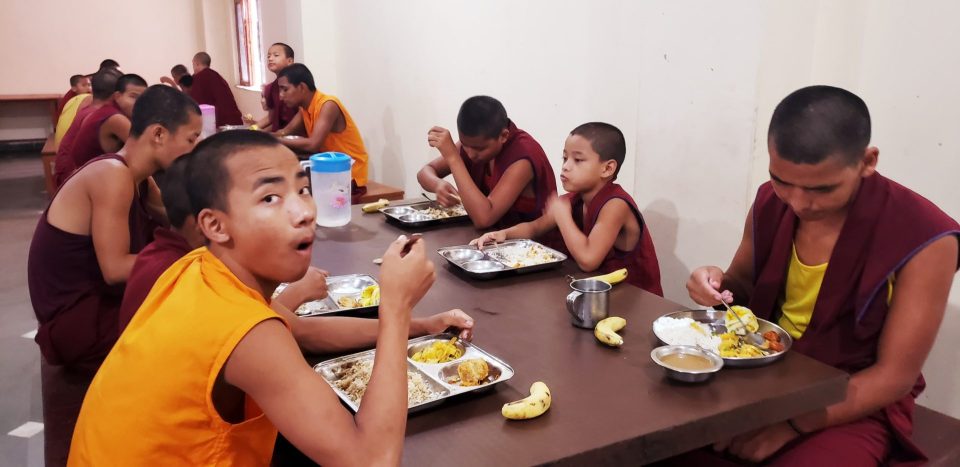
Shalu monks are enjoying their lunch.
In 2025, the SOSF contributed US$12,093 to support annual food needs of the monks of Shalu Monastery. This support has been a lifeline since 2018, helping the Shalu Sangha overcome previous hardships and ensuring they receive nourishing meals while continuing their studies and practice.
In a series of letters, the monastery expressed deep gratitude for this ongoing support. The monks shared that they are in good health, studying diligently, and joyfully engaging in their summer retreat. They emphasized how the food funding has made a tangible difference in their daily lives and spiritual practice.
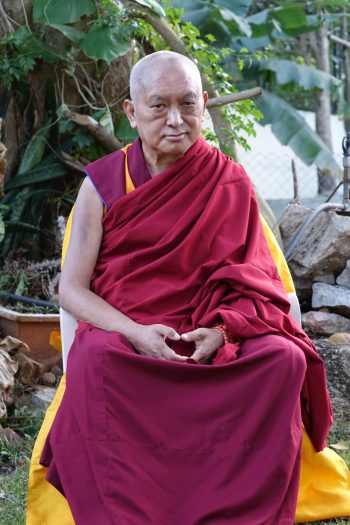
ama Zopa Rinpoche in the garden at Osel Labrang, Sera Jey Monastery, India, December 2015.
Photo: Ven. Roger Kunsang.
The monks continue to offer daily prayers and pujas for the swift return of Kyabje Lama Zopa Rinpoche. With unwavering devotion, the monks regularly recite prayers such as Jampal Tsenjö, Dolchok, and Trinchoel at the monastery, dedicating them to all sentient beings and to peace on earth.
Osel Labrang at Sera Jey Monastery in South India maintains a close connection with FPMT. In 2025, the SOSF offered US$26,630 to cover Osel Labrang’s annual budget for 2025 and 2026. This ongoing support helps ensure the smooth functioning of the Labrang and its activities, sustaining the important link it shares with the FPMT community.
Founded in 2003 through the vision of Lama Zopa Rinpoche and the support of many benefactors, Idgaa Choizinling Monastery in Ulaanbaatar, Mongolia, has become a vital center for Buddhist learning and practice. Closely connected to Sera Je Monastery in India, Idgaa serves as a monastic college for young Mongolian monks, many of whom come from disadvantaged backgrounds.
Since 2015, the SOSF has provided annual support for the Young Monks Feeding Program, ensuring that the monks receive nutritious meals in a clean and supportive environment.
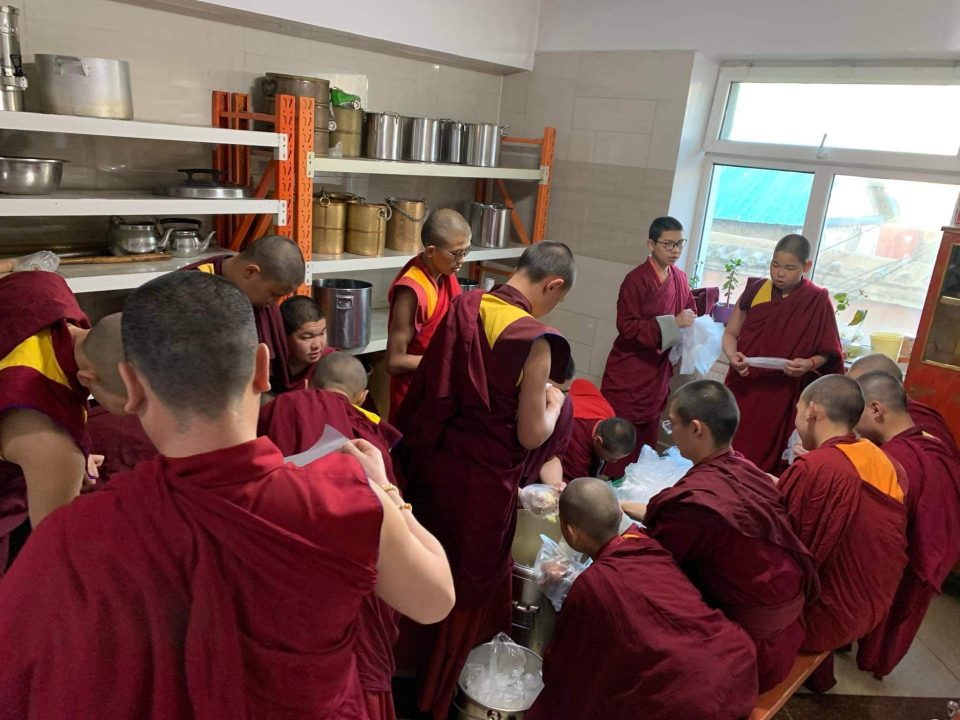
Idgaa monks are supporting the food preparation.
In 2025, US$10,800 was allocated to feed 32 Mongolian monks throughout the year. The funding has been used to:
- Provide daily lunch and dinner for monks during the winter months.
- Cover travel food expenses for young monks practicing in the countryside.
- Maintain a full-time cook, who ensures healthy meals are prepared.
- Purchase cleaning supplies to maintain hygiene and promote well-being.
The monastery also hosts FPMT Mongolia’s annual Mani Retreat since 2013.
The Idgaa Choizinling Monastery has expressed deep gratitude for the continued support. This program not only nourishes the monks physically but also strengthens their ability to study, practice, and preserve the Dharma for future generations in Mongolia.
Other smaller grants were offered in 2025 such to assist an FPMT geshe who experienced a medical emergency while traveling. As well as offerings on behalf of the organization to the geshes who helped during the first Most Secret Hayagriva retreat that was held at Nalanda Monastery.
Thank you!
The grants offered in 2025 reflect the heart of FPMT’s mission: to preserve and spread the teachings of the Buddha by supporting those who dedicate their lives to the Dharma. From food and health care to education and infrastructure, the SOSF has helped sustain Sangha communities in Nepal, India, Mongolia, France, the UK, and beyond.
We extend our deepest gratitude to all donors and supporters who make this work possible. Your generosity ensures that ordained Sangha, who are the living transmission of the Buddhadharma, continue to thrive for generations to come!
All are welcome to contribute to the Supporting Ordained Sangha Fund, to help ensure grants like these continue for the benefit of monks and nuns around the world.
- Tagged: Gyudmed Monastery, idgaa choizinling monastery, international mahayana institute, jamyang buddhist centre, nalanda monastery, osel labrang, ribur rinpoche, shalu monastery, tashi chime gatsal nunnery, thame, zigar thupten shedrupling institute
7
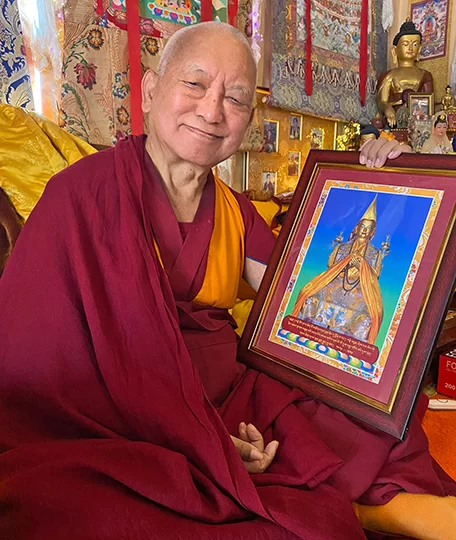
Lama Zopa Rinpoche with a picture of Lama
Tsongkhapa that Rinpoche liked very much,
Kopan Monastery, Nepal, February 2022.
Photo by Ven. Roger Kunsang.
The Lama Tsongkhapa Teachers Fund (LTKTF) continues to be a cornerstone in preserving the Geluk lineage of Tibetan Mahayana Buddhism. Named after the 14th-century master Lama Tsongkhapa (1357–1419), the Fund embodies His vision of integrating deep scholarship, ethical discipline, and meditative insight. In 2025, the Fund has already disbursed US$174,568, reinforcing its commitment to sustaining the living transmission of Dharma teachings.
Lineage Teachers | Annual Geluk Exam | Annual Winter Debate | Scholastic Achievement | Geluk Lineage | Medical Research | Thank you!
Supporting Our Lineage Teachers
Since its inception in 1997, the Fund has provided monthly stipends to 141 senior Geluk teachers, including past and present abbots of the main geluk monasteries, umzes, and teachers from major monasteries such as Sera Je, Sera Mey, Gaden Jangtse, Gaden Shartse, Drepung Loseling, Drepung Gomang, Gyudmed, Gyuto, Rato, and Tashi Lhunpo. These stipends – totaling around US$14,080 annually – ensure that these scholars can focus fully on their spiritual and academic pursuits.
On August 31, 2025, the annual graduation ceremony of Great Examination of Gelugpa University was successfully completed with the graduation of second-year Lhopon, and a closing ceremony was held. During the ceremony, certificates and tokens of appreciation were also presented to the participants.
Supporting the Annual Geluk Exam
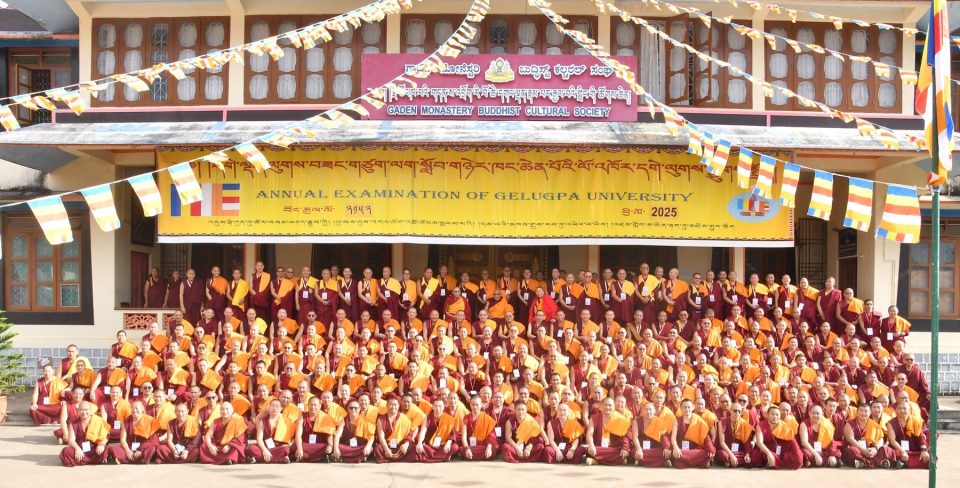
Supporting the Annual Geluk Exam.
During the event, Geshe Sonam Norbu, Director of the Gelugpa Cultural society, spoke about how the great patron of the teachings, the late Lama Zopa Rinpoche, who from 1997 until now, through the Lama Tsong Khapa Teachers Fund, has provided food, provisions, and travel expenses to retired abbots from the three great monastic seats, great teachers, and participants in the Gelug debate examinations. The director dedicated the merit of such extensive service to the teachings and expressed prayers and encouragement that Rinpoche’s unmistaken reincarnation would quickly arrive and be able to continue his predecessor’s legacy of spiritual accomplishments.
In 2025, US$10,841 was allocated to support the Geluk Exam, a rigorous test of philosophical understanding.
Supporting the Annual Winter Debate
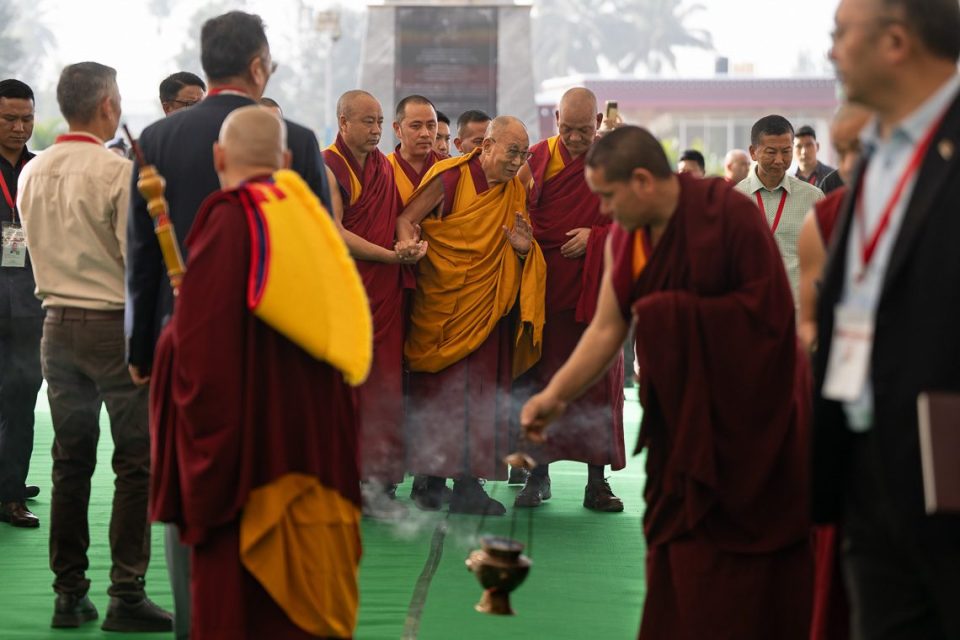
His Holiness the Dalai Lama arriving at debate ground of Tashi Lhunpo Monastery to attend the Winter Debating Session in Bylakuppe, Karnataka. Photo by Tenzin Choejor. January 2025
The Fund also sponsors the annual Winter Debate, which bring together hundreds of monks from the eight major Geluk monasteries.
The Winter Debate, hosted this year at Gaden Monastery, received US$16,609 in funding. This covered round-trip bus travel and offerings of milk and fruit, and organizational costs for nearly 500 monks.
Honoring Scholastic Achievement
Since 2000, a cherished tradition has been upheld through the offering of complete sets of robes to monks who successfully memorized the Migsel Loguk Chenpo text. For 25 years, this offering has honored their dedication and inspired continued excellence in Dharma study. In 2025, 119 students were recognized with robes and ceremonial scarves, representing a total offering of US$3,038.
Strengthening the Geluk Lineage
The LTKTF and its partner, the Geluk International Foundation (GIF), have made remarkable strides in 2024–2025 in preserving and advancing the Geluk tradition of Tibetan Buddhism. Through sponsorship and coordinated efforts, this initiative has empowered scholars, teachers, and monastic institutions across India to deepen their study and transmission of the Dharma.
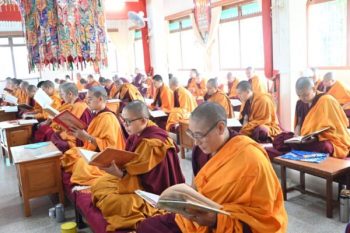
Jangchup Choeling Nunnery nuns are celebrating Lama Tsongkhapa’s Day on December 25th, 2024.
Source: Jangchup Choeling Nunnery’s website.
The Research and Training of Specialist Geshes and Geshemas project, initiated in 2020 under the guidance of His Holiness the Dalai Lama, has grown to include dozens of scholars from over 10 major monasteries, including: Sera Jey & Sera Mey, Gaden Jangtse & Gaden Shartse, Drepung Gomang & Drepung Loseling, Gyuto & Gyumed Tantric Monasteries, Tashi Lhunpo Monastery, Rato Monastery, and Jangchup Choeling Nunnery.
Each scholar is engaged in a three-year research program focused on one of the five major treatises of Buddhist philosophy: Pramana (Logic), Prajnaparamita (Perfection of Wisdom), Madhyamaka (Middle Way), Abhidharma (Phenomenology), and Vinaya (Monastic Discipline). Their work includes quarterly submissions of research papers, guided by appointed instructors and supervisors, and culminates in a thesis reviewed by an expert committee.
The Geluk International Foundation has implemented a robust monitoring system, including:
- Regular workshops on research methodology
- Quarterly progress tracking and feedback
- Personalized mentorship for each scholar
- Coordination with abbots and monastic leaders to ensure timely submissions and project alignment
This year, the annual grant for the Research and Training Project for Specialist Geshes and Geshemas reached US$77,500, while the Third Research and Training Project received US$37,500.
These funds, were used to provide stipends to scholars, instructors, and supervisors across all participating monasteries. Together, these initiatives cultivate the next generation of Buddhist scholars, ensuring the Geluk tradition remains intellectually robust and accessible to future generations.
Funding Tibetan Medical Research
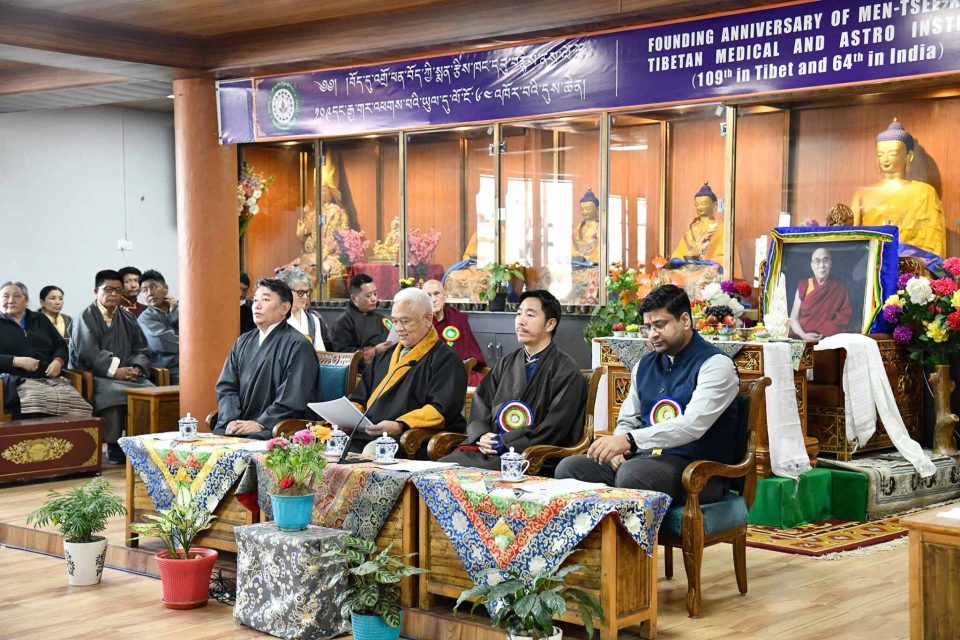
On March 25, 2025, Men-Tsee-Khang celebrated its 109th founding anniversary since its establishment in Lhasa, Tibet, in 1916 by His Holiness the 13th Dalai Lama, and its 64th year since its re-establishment in Dharamsala, India, in 1961 by His Holiness the 14th Dalai Lama. Source: Men-Tsee-Khang’s official website.
In 2025, a grant of US$15,000 was offered to Men-Tsee-Khang. Men-Tsee-Khang’s Clinical Research Department has launched a retrospective observational study to evaluate the role of Traditional Tibetan Medicine (TTM) in cancer care. Led by Dr. Dorjee Rabten Neshar and a team of Tibetan medical researchers, the study explores how ancient Sowa Rigpa principles can complement modern oncology.
TTM views cancer as an imbalance among the body’s three energies: rlung (wind), mkhris-pa (bile), and bad-kan (phlegm), and treats it holistically through herbal formulations, dietary changes, external therapies, and mental well-being practices.
The two-year study will analyze patient records from Men-Tsee-Khang clinics to assess survival rates, quality of life, symptom changes, and safety outcomes among cancer patients who received TTM for over three months. Results will be compared to existing cancer survival data to evaluate TTM’s potential as a complementary, safe, and affordable treatment option.
This initiative marks a significant step toward integrating Tibetan healing wisdom with global cancer research—bridging tradition and modern science for compassionate, holistic care and this research continues to advance knowledge and share valuable findings at Tibetan medical conferences in Dharamsala.
Full funding for the Research and Training projects, as well as the Tibetan Medical Research, has already been received and is being administered by the Lama Tsongkhapa Teachers Fund.
Thank You!
Your continued support is not only sustaining the Geluk lineage but actively nurturing its future. With your help, these scholars are building bridges between tradition and contemporary understanding, ensuring that Lama Tsongkhapa’s legacy continues to illuminate minds across generations!
The Lama Tsongkhapa Teachers Fund preserves the unbroken Tsongkhapa lineage, and cultivates the foremost scholars of tomorrow. The fund provides support to the abbots and senior teachers of the Lama Tsongkhapa tradition, supports the annual Gelugpa exam and monks and nuns to attend the annual winter debate among many other activities.
- Tagged: lama tsongkhapa teachers fund, supporting ordained sangha, supporting ordained sangha fund, winter debate, winter jang debate
23
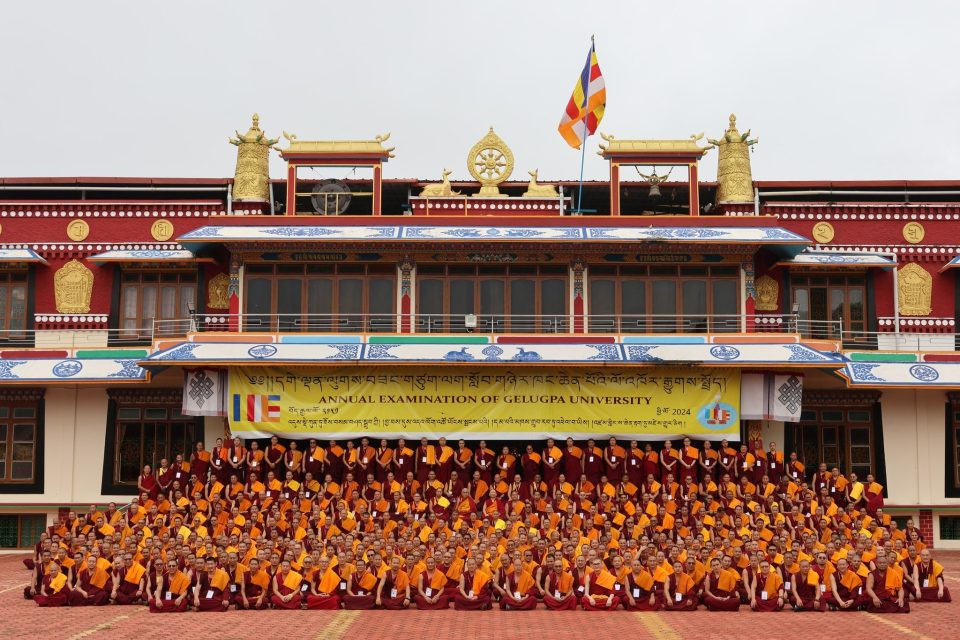
Annual Gelug Examination 2024.
The Lama Tsongkhapa Teachers Fund is dedicated to upholding the Gelug lineage of Tibetan Mahayana Buddhism.
The Lama Tsongkhapa Teachers Fund (LTKTF) has had another impactful year in 2024, supporting a variety of projects aimed at preserving and spreading the teachings and traditions of Lama Tsongkhapa and Gelug lineage. Through generous contributions, LTKTF has continued to fulfill its mission of providing crucial support to teachers, scholars, and institutions.
The LTKTF is named after the Gelug lineage founder Lama Tsongkhapa (1357-1419), who emphasized a synthesis of scholarly insight, ethical discipline, and deep meditation. His approach has guided generations of monastic communities across the Tibetan plateau and beyond. By supporting these dedicated monastic institutions, the LTKTF ensures the lineage’s unbroken transmission of profound Buddhist teachings from teacher to student remains vibrant and accessible.
In 2024, the Lama Tsongkhapa Teachers Fund disbursed a total of US$152,296.64. Each initiative reflects a commitment to preserving and advancing the teachings and traditions of Lama Tsongkhapa. These contributions ensure the flourishing of a lineage that has inspired countless practitioners and scholars worldwide.
Supporting Our Lineage Teachers | Specialized Studies for Geshes and Geshemas |
Funding Educational Research for Future Tibetan Medical Doctors | Thank you
Supporting Our Lineage Teachers
The Annual Gelug Exam, Winter Debate, & Memorization Exams
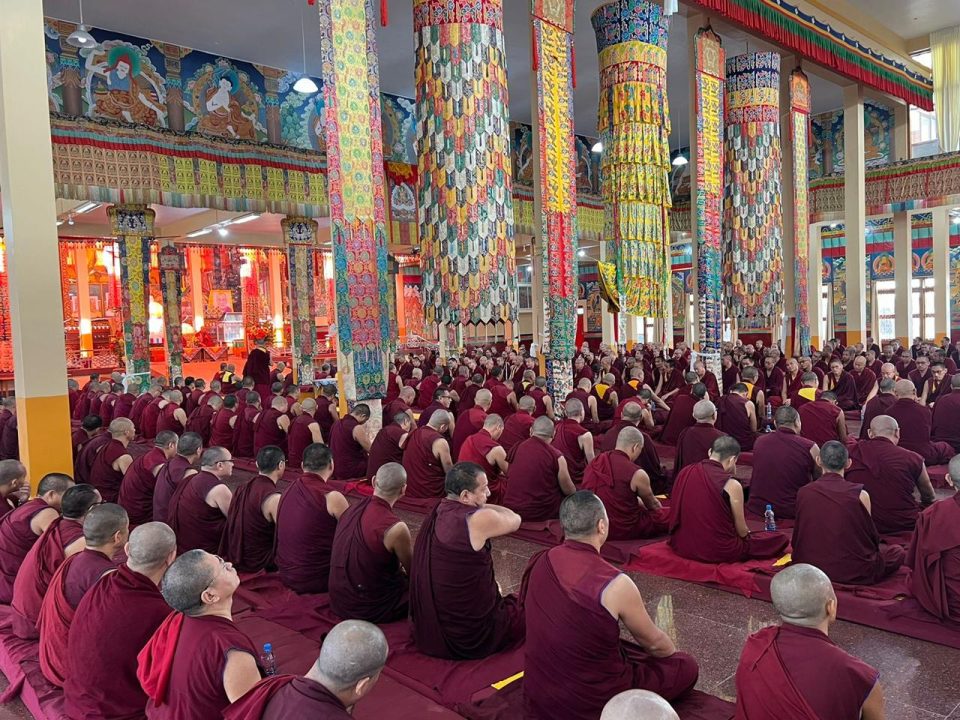
Annual Gelug Examination 2024.
Grant Offered: US$22,391 and future grant to be disbursed of US$23,500
Since 1997 this fund provides a monthly stipend to 139 of the main teachers of the Lama Tsongkhapa tradition, including current and past abbots, Umze’s and main teachers of Sera Je, Sera Mey, Tashi Lhunpo, Gaden Jangtse, Gaden Shartse, Drepung Loseling, Drepung Gomang, Gyudmed, Gyuto and Rato Monasteries. This small offering of money supports these teachers’ basic needs and allows them to focus more of their time on transmitting Dharma to their students at the monasteries. In 2024, US$10,770 was offered for this.
Furthermore, the fund covered food and travel expenses of the 594 monks from eight monasteries who undertook the annual Geluk exam and all the staff, this came to US$11,621.
One of the significant endeavors the fund supports is the annual Winter Debate, as well as assistance to the monks who successfully passed their examinations. The Winter Debate, a prestigious event that attracts the brightest scholars from the eight major Gelug monasteries, and in 2024 will be hosted Gaden Monastery in 2024, the fund will cover the travel expenses and food for 600 monks from Sera Je Monastery to attend.
A full set of robes will also be offered to 119 monks who have successfully memorized special texts (Migsel Loguk Chenpo).
The Sera Jey Monastic University for Advanced Buddhist Studies has outlined the estimated expenses for these two key programs: the Winter Debate Program 2024 involving over 600 monks and the Migsel Logyuk Scripture Memorization Examination Prize distribution to be US$23,500.
Specialized Studies for Geshes and Geshemas
Fifth Annual Grant to Geluk International Foundation
Grant offered: US$77,500 (including US$10,000 designated for four Geshemas [female geshes] pending placement)
The Geluk International Foundation has made significant progress in its Research and Training Project for specialist Geshes and Geshemas. This initiative, launched in June 2020, aims to deepen expertise in Buddhist studies within monastic communities.
The project focuses on specialization in Buddhist studies, enabling researchers to explore major subjects such as Pramana, Prajnaparamita, Madhyamaka, Abhidharma, Tantra, and Vinaya. Each researcher engages in a three-year intensive study that culminates in a thesis evaluated by an expert committee. Over the past year, researchers have contributed to the field through quarterly submission of papers on specialized topics, including Kalachakra Tantra, Valid Cognition, Mandala of Deity, Generation Stage, and Completion Stage, with feedback provided by assigned supervisors. Regular workshops on research methodology and guidance sessions have supported their progress, while quarterly monitoring ensured alignment with project objectives.
Second Research Grant to Geluk International Foundation
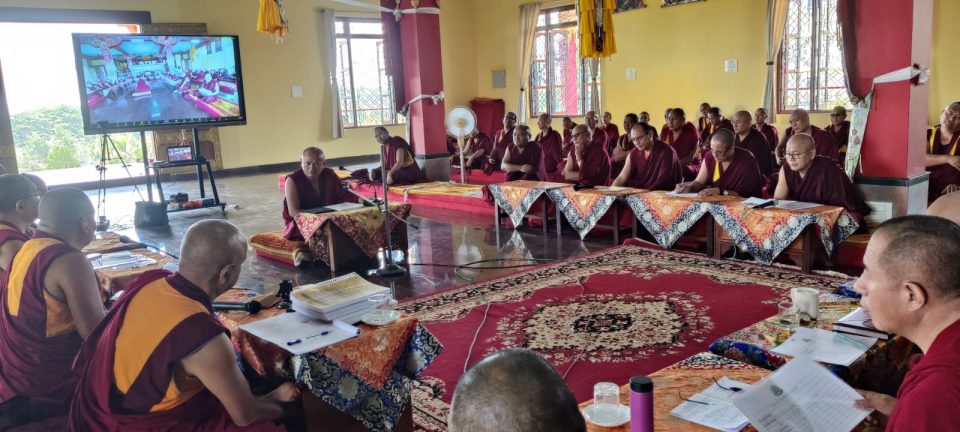
Oral examination of training of specialist Geshes and Geshemas Phase I, April 2024
(source Geluk Internation Foundation Facebook).
Grant offered: US$37,500
We are pleased to report the completion of Phase I of the Research and Training Project, funded through the LTKTF. This phase included the participation of 35 research scholars: five Geshes each from the monasteries of Sera, Drepung, and Gaden branches; along with five Geshemas from various nunneries.
The scholars completed their final year by submitting research papers, which were evaluated by 21 subject matter experts appointed by the Geluk International Foundation. After a thorough review process and a final oral examination conducted under the supervision of examiners, supervisors, and abbots in April 2024, 33 scholars successfully passed and were awarded passing certificates.
The success of Phase I paves the way for Phase II, which is progressing with strong enthusiasm and dedication from all involved. This grant has significantly contributed to advancing scholarship and study within the Geluk tradition.
Funding Educational Research for Future Tibetan Medical Doctors
Grant to Men-Tsee-Khang for Nyepa-sum (Three principal energies) Research
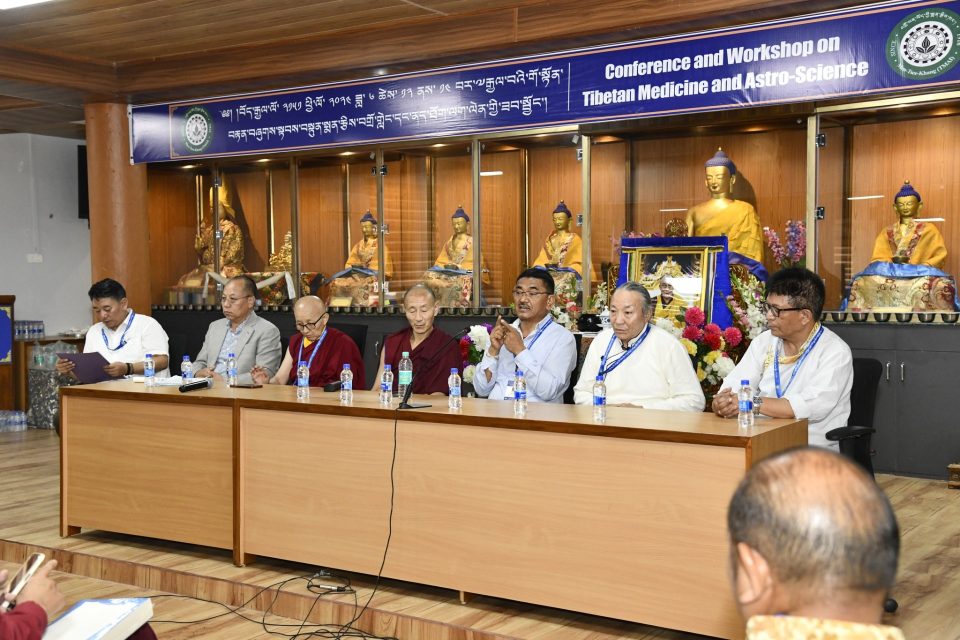
Men-Tsee-Khang held a 3-day conference and workshop on Tibetan Medicine and Astro-science in June 2024
(source: Men-Tsee-Khang Facebook).
Grant offered: US$15,000
From April to September 2024, significant progress was made in Tibetan medical research, focusing on various disorders and the practical applications of traditional treatments. One major area of study involved tripa disorders, particularly patients with tripa-blood and tripa-mukpo combined disorders and gallbladder cancer. These patients showed positive responses to Tibetan medicinal treatments, though research faced challenges with patient availability due to seasonal festivals.
In the study of nyes pa rlung, the research delved into its critical role in embryonic development. Rlung was analyzed for its influence on cellular organization, nutrient distribution, and energy flow during the first month of pregnancy. This work bridged traditional Tibetan medical concepts with modern embryological understanding, highlighting rlung’s function in the formation of bodily structures and the establishment of consciousness.
Another key area of focus was the baekan research, the researcher worked extensively on comparing traditional Tibetan medical texts with patient symptoms and collaborating with mentors to strengthen their research.
In June 2024, the team participated in a Tibetan medical conference in Dharamsala, discussing cancer, benign tumors, and neurological disorders. This event fostered collaboration and provided valuable insights for ongoing research.
Looking ahead, the team aims to continue patient evaluations for various disorders, refine research papers, and enhance the practical application of findings in clinical practice. These efforts underscore a commitment to advancing Tibetan medicine through diligent study and patient care.
Thank you
We express our heartfelt gratitude to all donors and supporters who made these achievements possible. Together, we continue to rejoice in the enduring legacy of Lama Tsongkhapa and the profound impact of these activities on the global Buddhist community.
We invite you to be part of this auspicious journey. Your support can help us reach even greater heights in the coming years and help preserve the wisdom and compassion of Lama Tsongkhapa for generations to come!
If you would like to support the Lama Tsongkhapa Teachers Fund, which preserves the unbroken Tsongkhapa lineage, and cultivates the foremost scholars of tomorrow. The fund provides support to the abbots and senior teachers of the Lama Tsongkhapa tradition, supports the annual Gelugpa exam and monks and nuns to attend the annual winter debate among many other activities.
- Tagged: gelug exam, geluk foundation, lama tsongkhapa teachers fund, supporting ordained sangha fund, tibetan medicine, winter debate
2
Rejoicing in Support Offered to Ordained Sangha in 2024
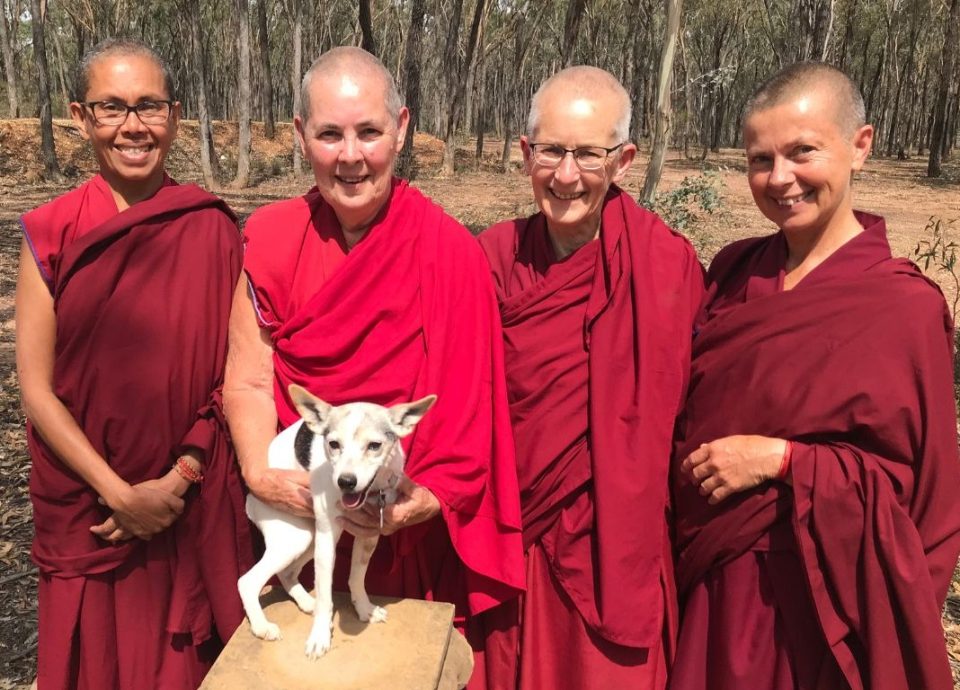
Nuns of Machig Labdron Nunnery, a new Australian Buddhist nunnery, and a friend.
The Supporting Ordained Sangha Fund (SOSF) is offering comprehensive support to nunneries, monasteries, and individual monks and nuns across the globe. This essential support includes providing food, accommodation, healthcare, education, and practice resources. This fund is not limited to any specific institution, lineage, or ethnicity and benefits numerous nunneries, monasteries, and Sangha members requesting assistance.
Within the FPMT organization, the support of monks and nuns is of utmost importance as the preservation of the Buddhadharma is linked to the existence and wellbeing of the Sangha.
So far in 2024, the Supporting Ordained Sangha Fund contributed a total of US$342,986 toward the needs of our Sangha. We invite you to take a closer look at the various ways we have been able to offer this collective support.
Tashi Chime Gatsal Gumba Nunnery | Thame Dechen Chokhorling Monastery | Shalu Monastery | Idgaa Choinzinling Monastery | Gyudmed Tantric Monastery | Lhungtok Choekhorling Monastery | Nalanda Monastery |
Machig Labdron | Department of Religion and Culture | New Robes
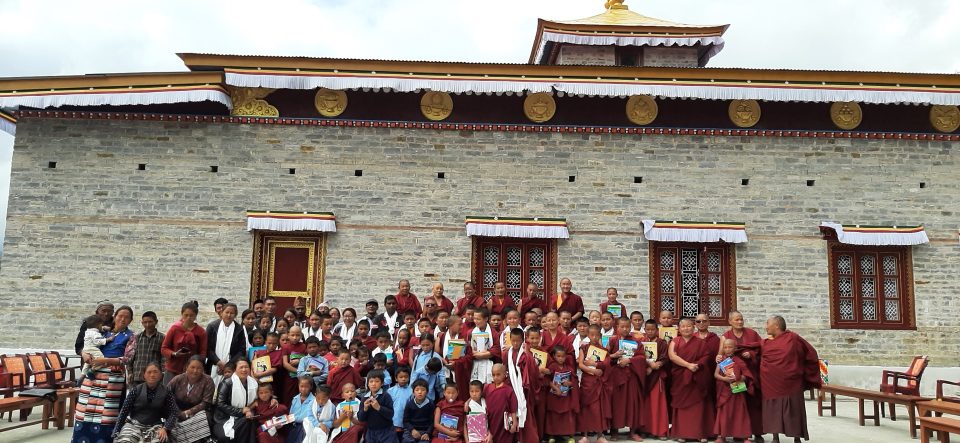
The teachers and nuns of Tashi Chime Gatsal Gumba.
Tashi Chime Gatsal Gumba Nunnery is a small Drikung Kagyu Nunnery in Bigu, Northeastern Nepal. The nunnery has a close connection with Lama Zopa Rinpoche, who visited in 2022 and commented that the nunnery feels like it is in the lap of Mother Tara. Rinpoche directly wished for FPMT to support this nunnery and in turn for the nunnery to dedicate the prayers of 100 million mani recitations (once or twice a year) for the benefit of the FPMT organization. Rinpoche personally set up this arrangement 14 years ago and we are honored to continue to fulfill Rinpoche’s wish.
To date an incredible 24 different 100 million mani retreats have been offered by the nunnery, that is 2.4 billion recitations of OM MANI PADME HUM for the benefit of all beings.
In 2024, the SOSF contributed US$20,302 to support this nunnery. This sponsorship encompasses vital necessities such as food, gas, firewood, transportation, medical expenses, and offerings to the Sangha upon completion of the retreat.
In addition, we are supporting the salaries of six teachers who teach at the small school in the nunnery, so that the younger nuns can receive a secular education, in addition to their religious training. This allows the nuns to stay at the nunnery and not have to walk the long distance to the local school and ensures they do not miss out on their education.
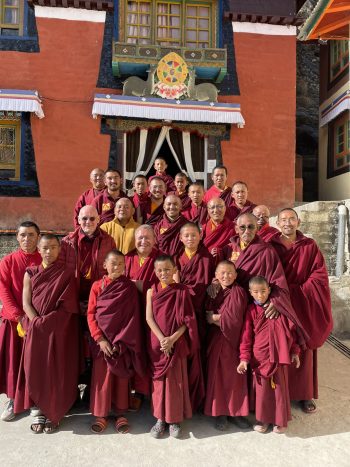
Thame Rinpoche and the monks of Thame Dechen Chokhorling Monastery.
Thame Dechen Chokhorling Monastery is located in the region of Solu Khumbu, Nepal. Thame was also the birthplace of Lama Zopa Rinpoche and is situated near Lawudo, where Rinpoche’s previous incarnation, the Lawudo Lama Kunsang Yeshe, practiced in strict retreat for many years.
The Thame Monastery is a small Nyingma Monastery perched upon a rock, nearly four thousand meters above sea level. It is the oldest monastery in Solu Khumbu, more than 350 years old, and is the residence of the Thame Rinpoche.
The monks of Thame Monastery offered special prayers every day during the 49 days after Lama Zopa Rinpoche showed the aspect of passing away, in front of Rinpoche’s kundung (holy body) in Kopan Monastery. They offered special prayers to Chenrezig, that is unique to their monastery. They also attended the consecration of the Victory Stupa built in Lawudo for the swift return of Lama Zopa Rinpoche.
Since 2017, the SOSF has been providing support for three meals a day to the 22 monks residing in Thame Monastery and in 2024 we offered US$9524 for this.
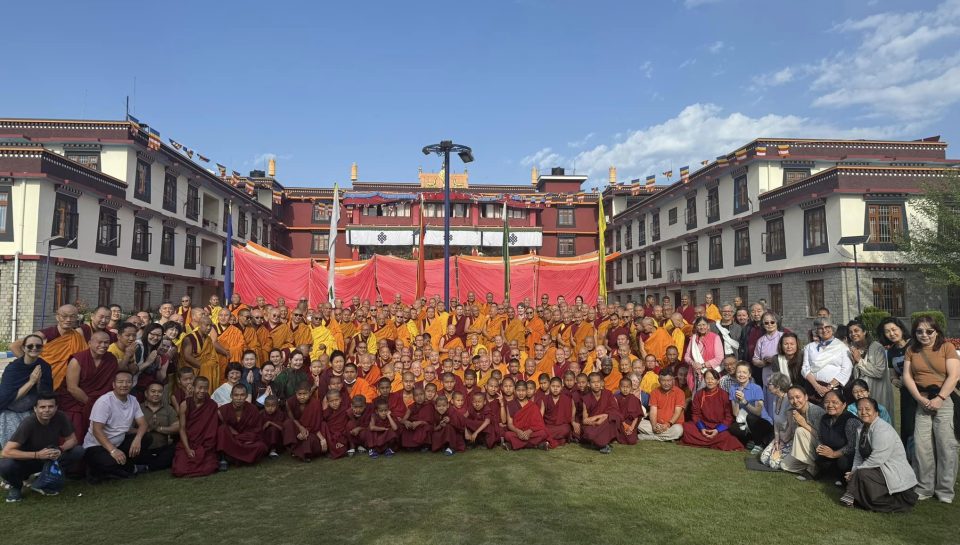
His Eminence Jhado Rinpoche and the monks and participants of the Kalachakra Mind Mandala retreat held at Shalu Monastery.
Shalu Monastery in Himachal Pradesh, India, is a Sakya Monastery and is committed to reviving and preserving the Bhulug lineage tradition of Tibetan Buddhism, which was founded by the Sakya master Buton Rinchen Drub in the fourth century. Recognizing the importance of this lineage, His Holiness the 14th Dalai Lama has blessed and supported the establishment of Shalu Monastery. This year His Eminence Jhado Rinpoche led a Kalachakra Mind Mandala approaching retreat at the monastery with over 300 participants, mostly Sangha, and including Ven. Joan from Kopan Monastery and Ven. Tsomo from FPMT International Office.
Since 2018, the SOSF has been offering all the food for the monks of Shalu Monastery, and this year we have allocated US$15,328 for their food.
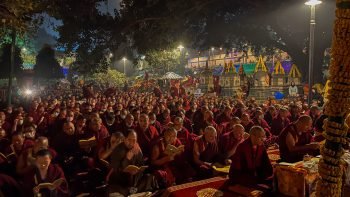
Prayer session for the swift return of Lama Zopa Rinpoche in Bodhgaya, India, December 31, 2023. Photo by Ven. Tenzin Michael.
The monks of Shalu Monastery feel a very close connection to Lama Zopa Rinpoche and FPMT, due to the support we have offered for the last six years. They were experiencing a lot of hardship prior to this, being unable to cover the costs of food for the Sangha. Their daily prayers include the heartfelt request for the swift return of Lama Zopa Rinpoche.
On December 31, 2023 a powerful prayer session was held in Bodhgaya, India, under the Bodhi tree for the swift return of Kyabje Lama Zopa Rinpoche, where 2,500 ordained Sangha participated including Ganden Tri Rinpoche, His Eminence Ling Rinpoche, His Eminence Serkong Tsenshab Rinpoche. Over 2,500 recitations of Chanting the Names of Manjushri and Lama Zopa Rinpoche’s swift return prayer was offered.
We were honored, on behalf of the entire FPMT, to make offerings to all the 2,500 Sangha, and this came to US$17,928.
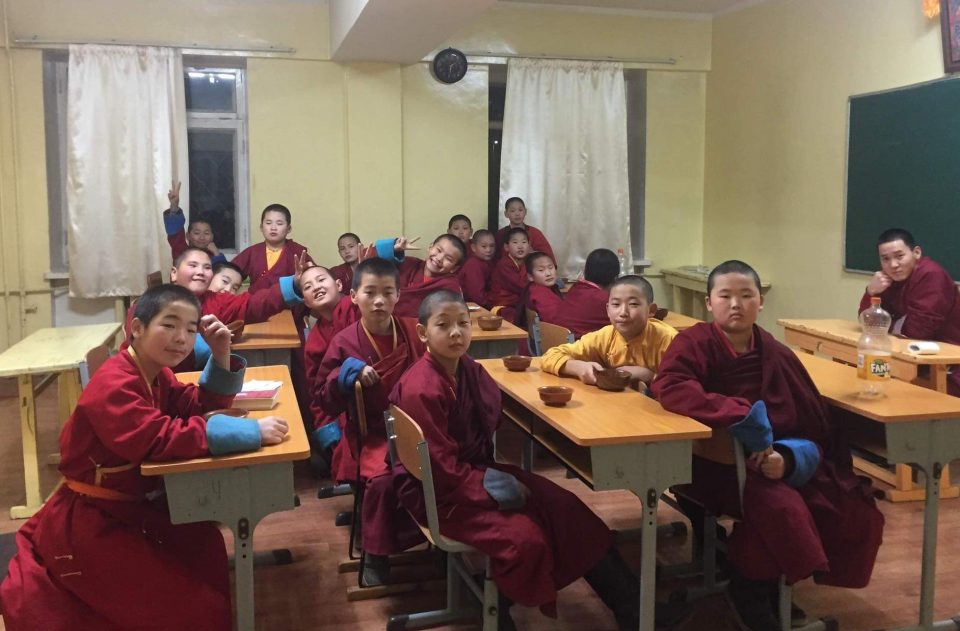
Monks of Idgaa Choinzinling Monastery.
Idgaa Choinzinling Monastery in Ulaanbaatar, Mongolia, shares a longstanding relationship with the FPMT organization and since 2015, the SOSF has been providing funds for all the food for the monks each year.
In 2024, US$10,800 has been allocated so that the 32 Mongolian monks are provided with nourishing meals throughout the year.
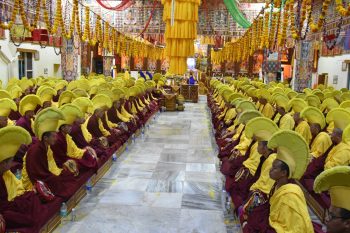
Monks at Gyudmed Tantric Monastery.
Gyudmed Tantric Monastery is a distinguished center for the study, practice and preservation of the Guhyasamaja Tantra lineage. The monastery accommodates approximately 600 monks and offers the best education, free food, and accommodation for all the monks. The monastery does not have any stable source of income, particularly for the food expenses for the monks. Realizing the need to set up a long term plan and Food Fund to support the monastery, the monastery requested Lama Zopa Rinpoche and the FPMT organization to help. Lama Zopa Rinpoche immediately accepted their request and the food fund proposal. The Food Fund was then established in 2021 and to date we have raised US$1,418,056. We are committed to continuing Lama Zopa Rinpoche’s sincere wish for the Food Fund and in 2024 SOSF contributed an additional US$100,000 toward it. The overarching goal is to raise US$2.1 million.
Lhungtok Choekhorling Monastery in Pomaia, Italy, is 2 kilometers (1.2 miles) from Istituto Lama Tzong Khapa. The future monastery will be built on the rock just like the monasteries of Tibet and the project envisages an ecological architecture in harmony with the surrounding area, and the use of natural and clean energy resources. The monastery aims to provide hospitality to about one hundred monks and nuns. In 2022 the building permit was signed. After 18 years of waiting and bureaucratic procedures, this was a tremendous accomplishment. Last year His Holiness the Dalai Lama personally offered a donation toward the building of the monastery and gave essential advice.
In 2024 due to the kindness of a benefactor, through the SOSF we offered US$100,000 as a matching grant for the building of the monastery. The monastery building is in a critical stage now and still needs a lot of support to be actualized. This is a precious opportunity to be part of the first Tibetan Buddhist Monastery in Italy.
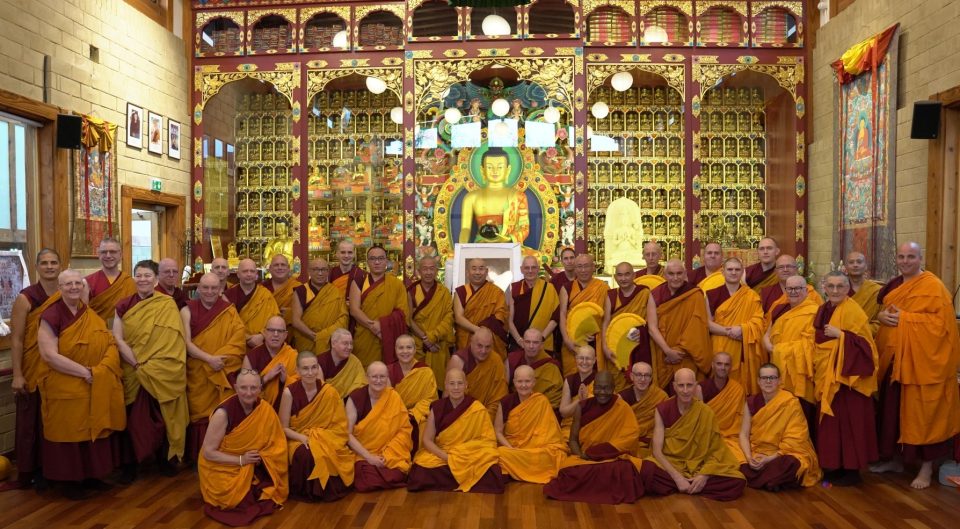
Participants of the first Gelug Monlam held at Nalanda Monastery, France. Photo by Sonam Sherpa.
Nalanda Monastery held the first historic Geluk Monlam in the West, in February 2024. Known as the Great Prayer Festival, Monlam is regarded as one the “four great activities” of Lama Tsongkhapa’s life. Chant leaders from Sera Monastery came from Bylakuppe to Nalanda Monastery and taught the chanting to most of the Sangha and about 15 lay people. Six geshes, the chant master, forty-four sangha and about sixty lay people participated in the Monlam, chanting the profound prayers celebrating Buddha Shakyamuni, Lama Tsongkhapa, and Maitreya and concluding with the traditional procession and offering bath to Maitreya, circumambulating the main temple.
Ven. Roger Kunsang attended the Monlam and on behalf of the FPMT organization, through the SOSF, offered US$5259 to the Sangha community on this auspicious occasion.
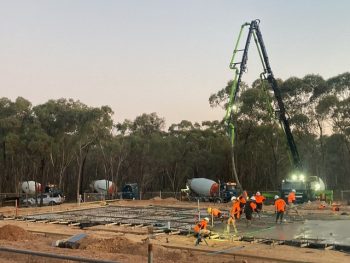
Building underway of two buildings for Machig Labdron, Bendigo.
Machig Labdron is a new Australian Buddhist nunnery located north of the Great Stupa of Universal Compassion, in Bendigo. After a lengthy planning stage, the building of the nunnery is now underway. The nunnery location is peaceful with a natural beauty surrounded by bush. Two single story buildings are planned for the site.
In 2024, the SOSF, due to the kindness of a benefactor, was happy to offer US$63,066 toward the nunnery building. The nunnery is in need of more support to be able to complete the building project.
The Department of Religion and Culture of the Central Tibetan Administration presented an important project to assess the current challenges and opportunities in strengthening monastic institutions. The aim is to conduct surveys involving 20,000 monks and nuns across 80 larger monasteries and nunneries, comprising 18 from India and 62 from Nepal. From this survey to then categorize and identify the challenges encountered by monastic institutions and propose viable solutions to address them and also to explore opportunities for the development of the monastic education system with the aim to achieve increased enrollment and decrease dropout rates within monastic institutions and to implement improvements to the overall monastic education system and in this way to contribute to the preservation and continuity of monastic institutions.
Understanding the importance of this work, the SOSF offered US$10,215 toward this project and long-term plan to assess the overall needs within the monastic institutions in India and Nepal.
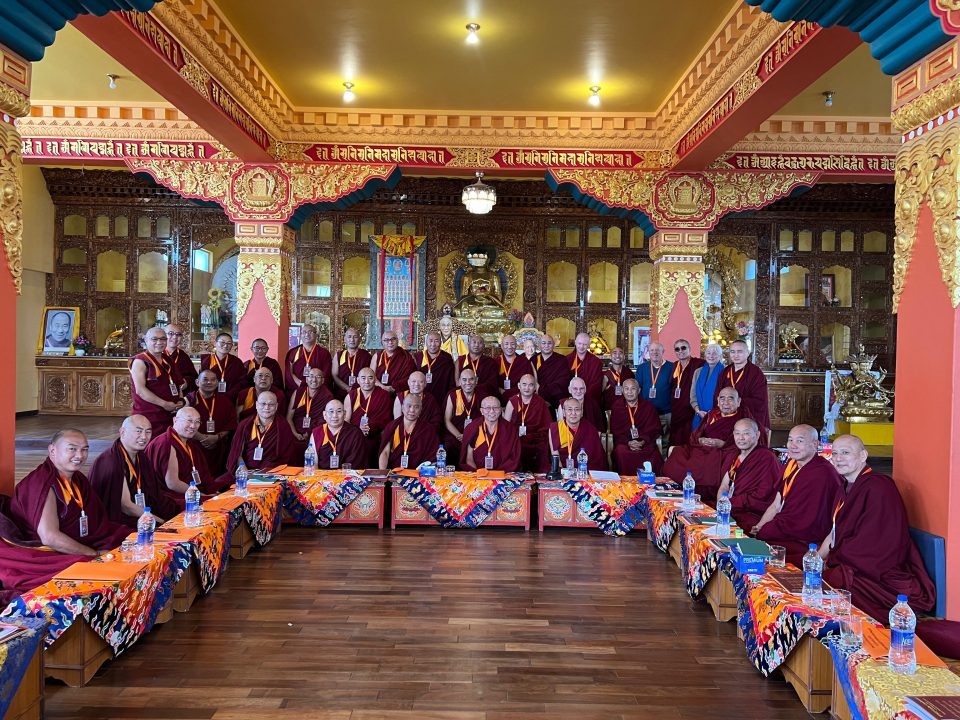
Many robes were offered to the Geshes attending the Geshe Conference at Kopan, January 2024.
One of Lama Zopa Rinpoche’s wishes was to offer a set of robes to each of the resident and touring teachers who offer service in FPMT, including all the geshes, as a token of thanks for their kind service within the organization. This year, 30 sets of robes were offered and SOSF offered US$1632 to cover that.
Each of these offerings were made on behalf of the whole FPMT organization to support our precious Sangha. The ability to make these offerings each year is made possible by each and every donor who has contributed to the Supporting Ordained Sangha Fund. We would like to take this opportunity to express our heartfelt gratitude and hope the transparency in the grants offered in 2024 is a means for rejoicing.
All are welcome to contribute to the Supporting Ordained Sangha Fund, to help ensure grants like these continue for the benefit of monks and nuns around the world.
- Tagged: Gyudmed Monastery, idgaa choizinling monastery, lhungtok choekhorling, shalu monastery, supporting ordained sangha fund, tashi chime gatsal nunnery, thame monastery
20
Rejoicing in the Activities of Lama Tsongkhapa Teachers in 2023
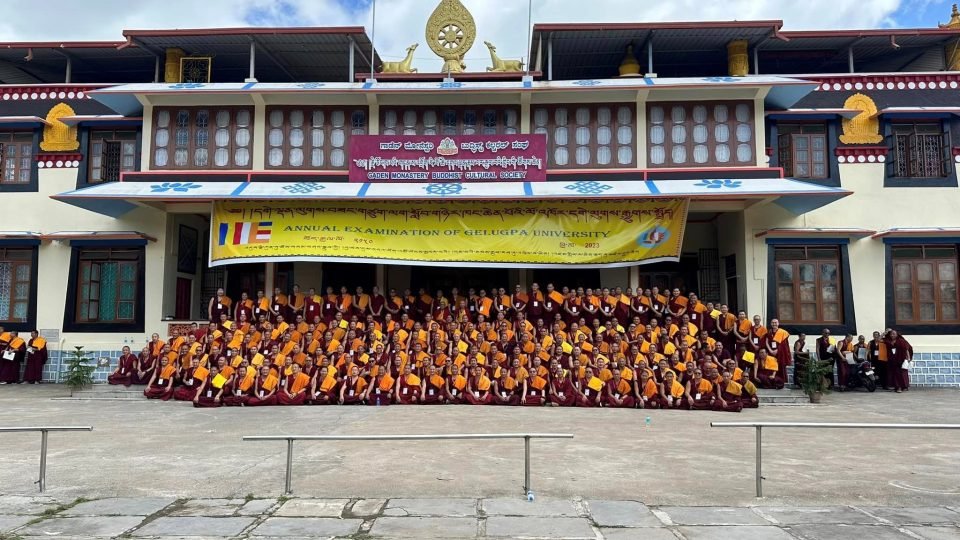
2023 Winter Debate Participants, Drepung Monastery.
The Lama Tsongkhapa Teachers Fund (LTKTF) is dedicated to upholding the Gelug lineage of Tibetan Mahayana Buddhism and has been instrumental since its establishment in 1997 at the request of His Holiness the Dalai Lama. Named after the Gelug lineage founder Lama Tsongkhapa (1357-1419).
Below are the activities that the Lama Tsongkhapa Teachers Fund supported through a total of US$174,162 in grants in 2023. Please join us in rejoicing!
Supporting Our Lineage Teachers, the Annual Gelug Exam, Winter Debate, & Memorization Exams
One of the significant endeavors the fund supports is the annual Winter Debate, as well as assistance to the monks who successfully passed their examinations. The Winter Debate, a prestigious event that attracts the brightest scholars from the eight major Gelug monasteries, was hosted at Drepung Monastery in 2023 with the fund covering the travel expenses for 600 monks from Sera Je Monastery to attend.
Furthermore, the fund ensured that 134 monks from the eight monasteries who passed the memorization examination of classical texts (that are very long) such as the The Five Treatises of Maitreya, Six Collections of Reasoning by Arya Nagarjuna, General Meaning of the Middle Way by Jetsun Chokyi Gyaltsen, Bodhisattvacaryavatara (Guide to the Bodhisattva’s Way of Life) by Shantideva and texts on Abhidharma, Vinaya, Paramita, Madyamika and Lekshay Nyingpo all received a full sets of monks’ robes.
Another notable initiative supported by the fund is the support to the basic needs of 137 main teachers of the Lama Tsongkhapa tradition by providing small monthly stipends, freeing up their time to focus on their service in teaching students and deepening their own practice. The fund also sponsored the Gelukpa Examinations by covering the food and travel expenses of 540 examinees and 118 staff members, as well as providing cash offerings and meals to all participants.
These efforts, including the support provided to the Winter Debate, the stipends to teachers, and the Gelukpa Examinations, reflect the ongoing commitment of the Lama Tsongkhapa Teachers Fund to preserve the Gelug tradition, in line with the vision of His Holiness the Dalai Lama, Lama Zopa Rinpoche, and other senior Gelug masters.
The total amount disbursed for the supported activities in 2023 is US$44,162. This includes the $20,672 for the Winter Debate Program and Monk Support, as well as the US$23,489 for the stipends to teachers and support for Gelukpa Examinations.
Specialized Studies for Geshes and Geshemas
Each year we are offering support towards the Research and Training of Specialist Geshes and Geshemas, with a grant of US$77,500 being provided for the stipend to candidates, supervisors, and instructors. This initiative supports the specialized studies for 35 geshe lharampas and geshemas in the subjects of Pramana, Prajnaparamita, Madhyamaka, Abhidharma, and Vinaya, allowing them to deeply focus and expand their knowledge on one of the five main monastic treatises. This project, advised by His Holiness the Dalai Lama and initiated by the Geluk International Foundation in 2020 with the guidance of the Gaden Phodrang Foundation and Office of His Holiness the Dalai Lama, aims to provide tools for developing new interpretations or synthesized presentations of ancient Buddhist wisdom, making them practically suitable and theoretically digestible to modern mindsets.
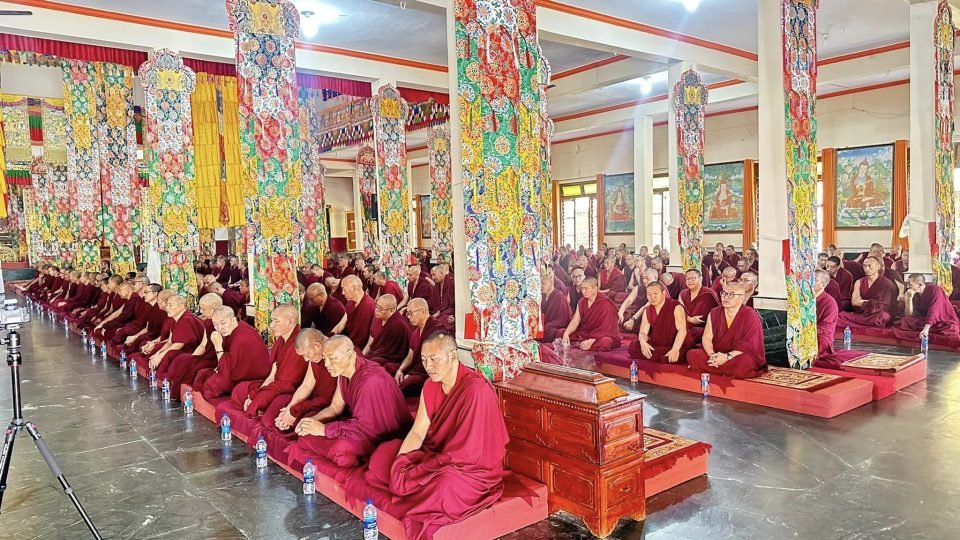
Participants in the 2023 Winter Debate.
Researchers in each field of Buddhist studies have been engaged in intense individual research activity for a period of three years, culminating in the presentation of a written thesis on their chosen topic. The full funding for this project has been provided through the generous support of the US-based Kaya Mandala Foundation, with the Lama Tsongkhapa Teachers Fund agreeing to support the administering of grants until the geshes and geshemas complete their specialized studies. The recipients of the grant funds come from the six major monasteries in India and various nunneries, including Geshema Namdol Phuntsok from Khachoe Ghakyil Ling Nunnery (Kopan Nunnery) in Kathmandu, Nepal. This year marks the conclusion of phase one of the project.
The first phase of the Geluk International Foundation’s major research project was the Research and Training of Specialist Geshes and Geshemas. The second phase, launched in June 2023, will focus on the topics of Vinaya, Abhidharma, Madhyamika, Prajnaparamita, and Buddhist Logic. We are pleased to offer the support required for 15 exceptional scholars from three esteemed monasteries: Gyume Lower Tantric Monastery (5 scholars), Gyuto Upper Tantric Monastery (5 scholars), and Tashi Lhunpo Monastery (5 scholars). This second phase will span 8 years, with the fund committed to granting US$37,500 each year. We are eagerly anticipating the upcoming new phase and are hopeful for fruitful results.
Funding Educational Research for Future Tibetan Medical Doctors
Committed to backing educational research and training programs aimed at cultivating the next generation of Tibetan medical practitioners. This support not only benefits Tibetan communities by providing them with qualified doctors but also contributes to the preservation of this invaluable medical science and cultural tradition. Tibetan medicine, an ancient yet relevant discipline, is regarded as the time-honored science and art of healing from Tibet. It promotes the belief that the ultimate purpose of life is happiness and emphasizes that wellbeing is a continuous journey of living in harmony with one’s constitution. For centuries, Tibetan medicine doctors have engaged in research, and now modern Tibetan researchers are carrying on this authentic tradition.
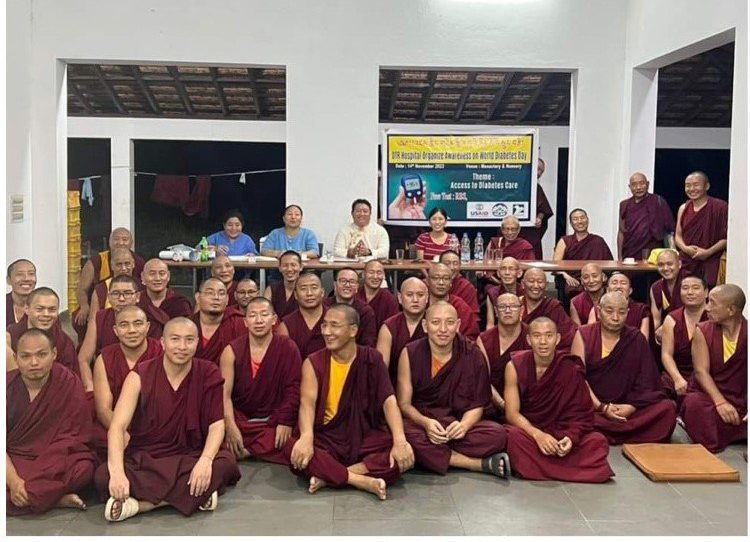
Doeguling Branch Clinic Participates in World Diabetes Day Awareness Program, November 2023. Photo courtesy of Men-Tsee-Khang’s official website.
A sum of US$15,000 was allocated to the Tibetan Medical & Astro-science Institute in India, Men-Tsee-Khang, along with a branch clinic in Kathmandu, Nepal, to provide stipends for six participants of the Nyepa Sum Project. The Nyepa Sum Project focuses on researching the three principal energies: baekan (water & earth or cold energy), lung (air or movement energy), and tripa (fire or heat energy); and their impact on various health conditions. The dedicated doctors are conducting research on imbalances in lung, tripa, and baekan energies to address conditions such as depression, insomnia, headaches, heart and blood pressure issues, mental health problems, skin rashes, inflammations, indigestion, hormonal issues, respiratory disorders, kidney and bladder dysfunction, obesity, and diabetes.
We express our deep appreciation and heartfelt gratitude to all the kind sponsors of Lama Tsongkhapa Teachers Fund for their generous support towards these projects! Your assistance is invaluable and immensely beneficial to humanity. The total of US$174,162 in grants offered in 2023 has contributed to these impactful initiatives. We invite you to join us in celebrating the positive outcomes of these endeavors!
All are welcome to support the Lama Tsongkhapa Teachers Fund, which preserves the unbroken Tsongkhapa lineage, and cultivates the foremost scholars of tomorrow. We also invite you to read about all the other charitable projects of the FPMT organization.
- Tagged: gaden phodrang foundation, gelug exam, lama tsongkhapa teachers fund, man-tsee-khang, supporting ordained sangha fund, winter debate
21
Rejoicing in Support offered to the Sangha in 2023

The monks of Sera Je Monastery offering prayers for Lama Zopa Rinpoche’s swift return.
The Supporting Ordained Sangha Fund (SOSF) is offering comprehensive support to nunneries, monasteries, and individual monks and nuns across the globe. With a wide range of charitable activities, including providing food, accommodation, healthcare, education, and practice resources, the SOSF aims to cater to the diverse needs of those in the Sangha community. This fund is not limited to any specific institution, allowing it to extend its benefits to numerous nunneries, monasteries, and Sangha members seeking assistance.
Within the FPMT organization, the support of monks and nuns holds a position of utmost importance. Recognizing that the preservation of the Buddhadharma is linked to the existence and well-being of the Sangha, prioritizing their support becomes essential.
In 2023, the SOSF has contributed a total of US$330,468.02 towards various projects aimed at benefiting and uplifting the Sangha. We invite you to take a closer look at the reports provided below.
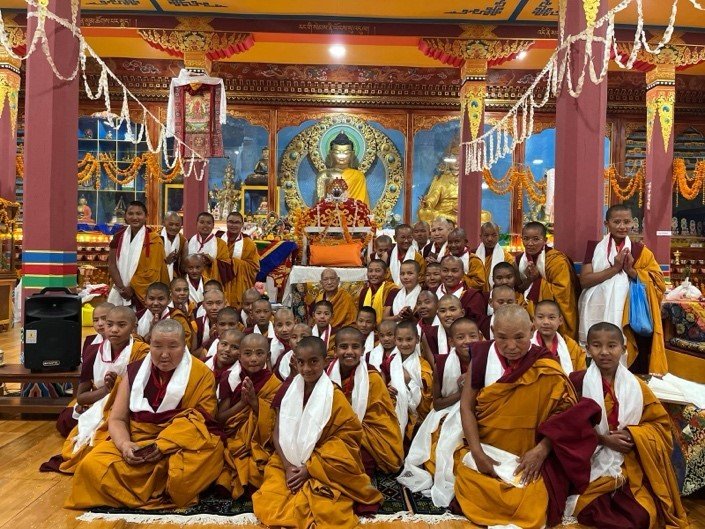
The nuns of Tashi Chime Gattsal Gumba in their new gompa with Lama Zopa Rinpoche in 2022.
In Tashi Chime Gatsal Gumba Nunnery, located in the heart of Bigu, a rural municipality in Northeastern Nepal, a truly inspiring story of courage and perseverance took shape. The small village of Bigu, which bore witness to the aftershocks of the devastating earthquake that shook Nepal in May 2015, suffered greatly, and the nunnery was not spared from its relentless force. But amidst the ruins, a remarkable story of reconstruction emerged. In the face of adversity, the FPMT extended their hand to alleviate the profound impact of the earthquake. It has played a pivotal role in the gradual rebuilding of the nunnery, ensuring a safe and secure environment for the seventy nuns who call it their home.
Twice a year, these dedicated nuns of Kagyu lineage of Tibetan Buddhism embark on a spiritual journey known as the 100 Million Mani Retreat. This retreat involves the recitation of the mantra of the Chenrezig, Buddha of Compassion, OM MANI PADME HUM, a staggering 100 million times. This profound practice brings immeasurable benefits, not only for themselves but also for the entire world.
Within the vast visions of Lama Zopa Rinpoche lies the aspiration to sponsor the 100 Million Mani Retreats across the globe. In line with this cause, the SOSF has been extending sponsorship to the nuns of Bigu since 2010. This sponsorship encompasses vital necessities such as food, gas, firewood, transportation, medical expenses, and offerings to the Sangha upon completion of the retreat.
In 2023, the SOSF contributed $18,873.56 to support this auspicious endeavor. Engaging in the practice for approximately six hours each day, nuns dedicate their virtues towards the success of Lama Zopa Rinpoche’s holy wishes and the utmost benefit to all sentient beings.
We rejoice so much in the incredible journey undertaken by these nuns, a testament to their unwavering faith, spirit, and loving kindness. May their virtuous actions inspire us all on our own paths towards compassion and enlightenment.
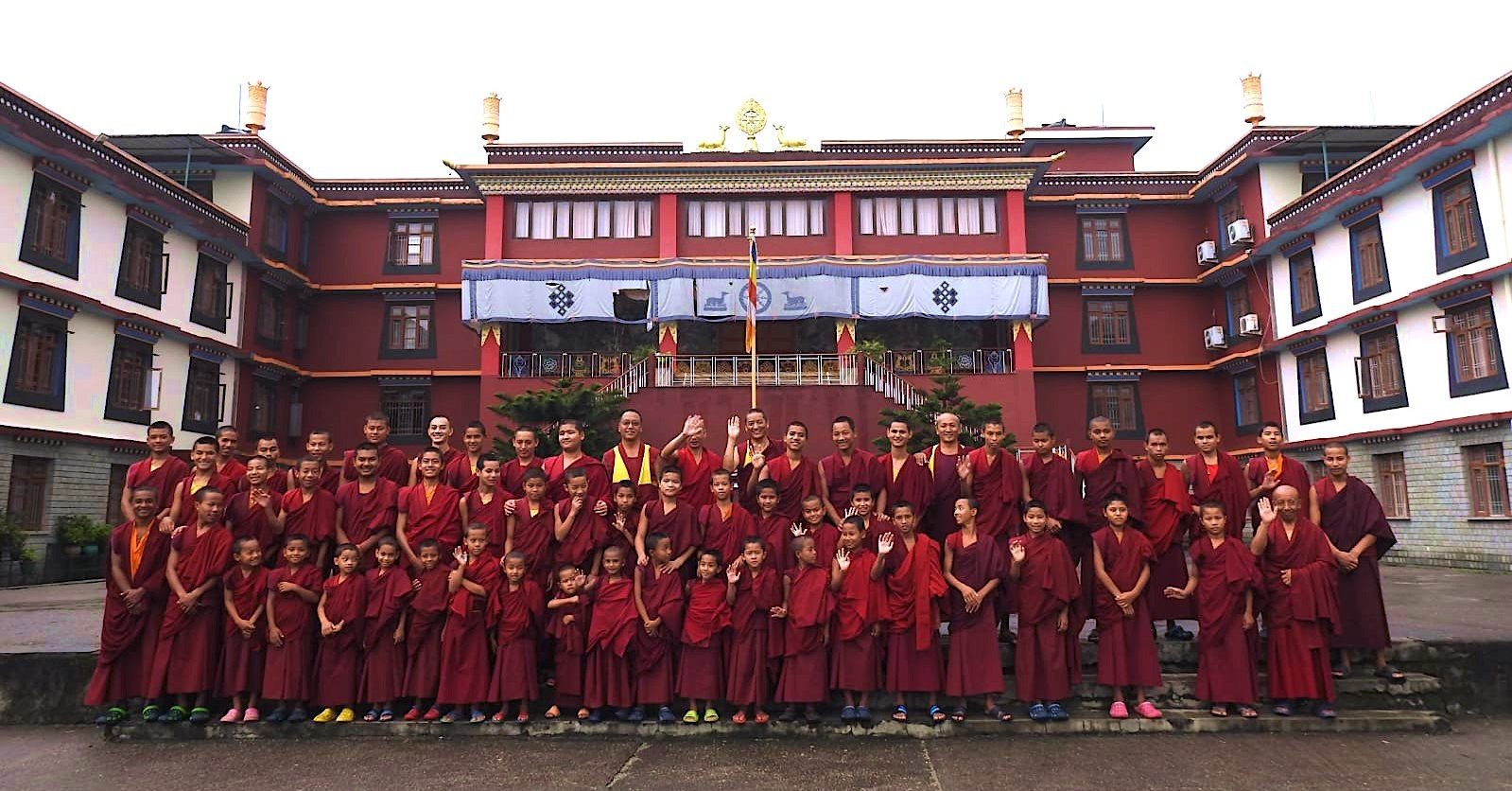
The monks of Shalu Monastery.
Located in Himachal Pradesh, India, Shalu Monastery is an embodiment of devotion and dedication. This monastery is committed to reviving and preserving the Bhulug lineage tradition of Tibetan Buddhism, which was founded by the Sakya master Buton Rinchen Drub in the 4th century. Recognizing the importance of this lineage, His Holiness the 14th Dalai Lama has blessed and supported the establishment of Shalu Monastery in 2005 within the Paonta Tibetan settlement.
Since 2018, the SOSF has been offering funds to Shalu Monastery. In a joyous continuation of this support, the SOSF is delighted to contribute $15,417.10 in 2023, catering to the essential food expenses of the 55 monks residing within the monastery. This year, the monastery is also welcoming a new group of young monks from the Himalayan region, bringing the monk community to even greater numbers.
The monks of Shalu Monastery serve as shining examples of true devotion and profound gratitude. They have courageously taken upon themselves the responsibility of preserving their unique tradition while demonstrating deep respect and appreciation for the unwavering support of Lama Zopa Rinpoche throughout the years. Their daily prayers include the heartfelt request for the swift return of Lama Zopa Rinpoche. May their auspicious prayers be fulfilled!
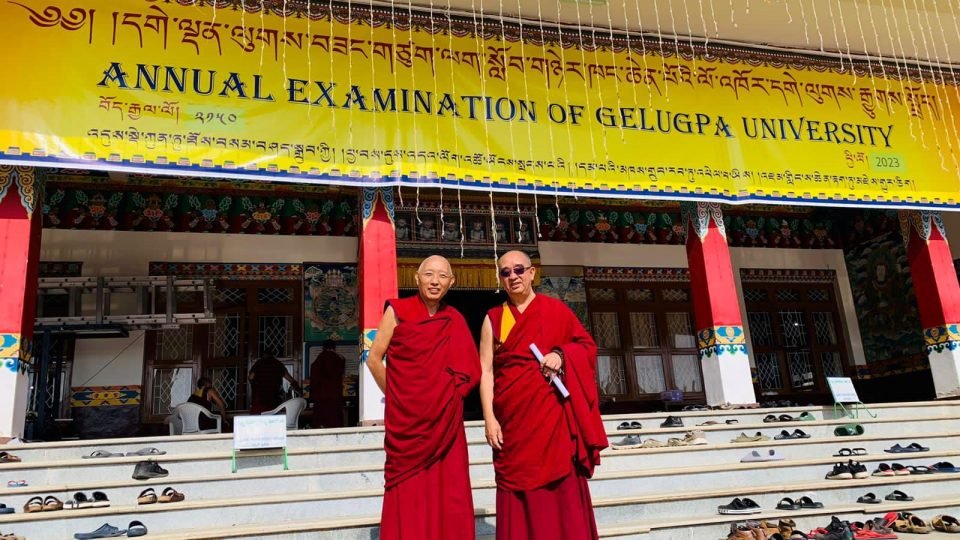
Abbots of Sera Je and Sera Mey Monasteries attending the Annual Examination
of Gelugpa University 2023 at Sera Lachi.
Sera Thekchenling Lachi Cultural Society, situated in the region of Bylakuppe in South India. In Tibet’s history, Sera Lachi played a crucial role as the administrative and unifying institution for the three esteemed colleges: Sera Je, Sera Mey, and Ngakpa. The term “Lachi” represents its prominence as the main or head monastery.
Presently, two of these colleges, Sera Je and Sera Mey, have been re-established in India. The purpose of Sera Lachi remains to bring together and support both monasteries, hosting grand events such as the Monlam Prayer Festival, annual examinations, and other big events. These occasions attract thousands of monks, fostering a sense of unity and spiritual growth.
Recognizing the importance of these events, Sera Lachi has recently identified the need for renovations in their kitchen and dining hall. These upgrades are vital to ensure that they can continue hosting these significant gatherings. In the past, Sera Lachi Cultural Society has received assistance from the SOSF for various renovation projects. This includes the construction of a new elevator for His Holiness the Dalai Lama, the renovation of sewerage facilities, and the procurement of a new power generator.
We are thrilled to announce that this year, the SOSF has provided a donation of US$12,292 for the cause of renovating the kitchen and dining hall. This contribution will undoubtedly aid in creating a better space for preparing and taking meals and enhance the overall experience for all those who attend these vital events at Sera Lachi.
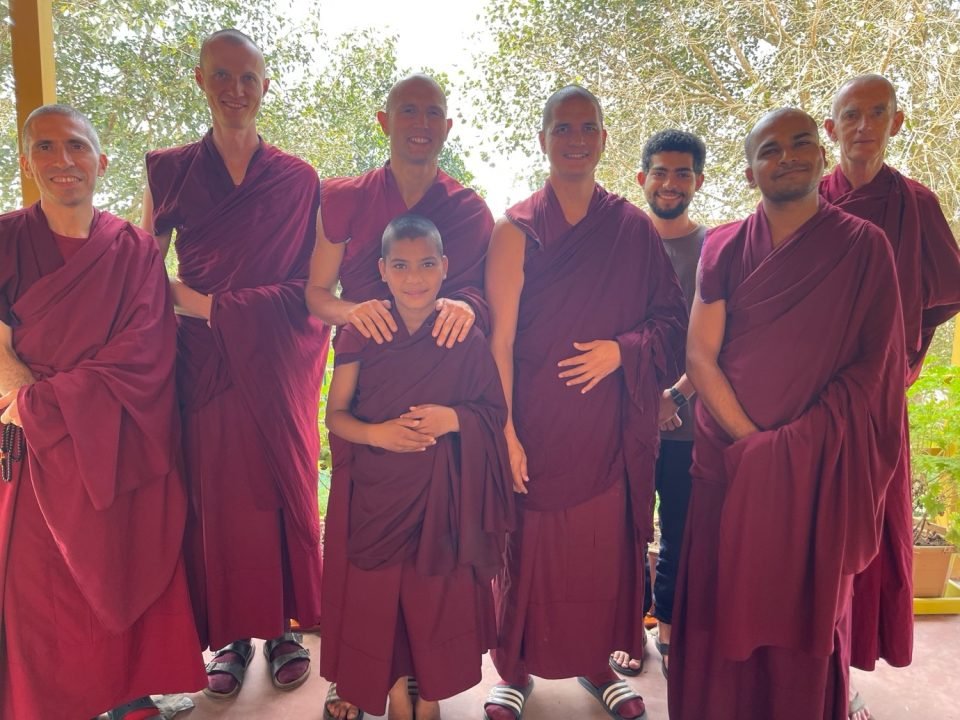
The resident Sangha at Sera IMI House, October 2023
International Mahayana Institute (IMI) represents a devoted community of Buddhist monks and nuns associated with the FPMT. Within the surroundings of Sera Jey Monastery, the IMI House stands as a resilient and determined minority, striving to make meaningful contributions to the cherished traditions of the one of the Great Gelug Monasteries. This accomplishment is made possible through the whole-hearted and sustained efforts of its eight current resident monks and Sangha in the past.
Established in 2002, the Sera IMI House became a home, providing a supportive environment for Western monastics seeking to engage in the profound program of studying Tibetan Buddhist philosophy according to Lama Tsongkhapa tradition. It serves as a place where these dedicated individuals can come together, offering mutual support, and fostering growth in their spiritual journeys.
At present, the Sera IMI House finds itself in urgent need of renovation to continue its vital work. The priority improvements include the installation of a new tile roof, the acquisition of a water tank and solar water heater, and the necessary plumbing works. Additionally, there is a pressing need to refurbish the bathrooms and renovate the aging kitchen facilities. These improvements are crucial to maintain a conducive environment for the monks and to ensure a comfortable and efficient space for their daily activities.
We are delighted to share that the SOSF has extended their support to this noble cause. Their contribution of US$29,589 will significantly assist in meeting these renovation needs. The donation will go a long way in revitalizing the Sera IMI House and enable its residents to continue their essential studies, preserving and spreading the tradition of Tibetan Buddhism.
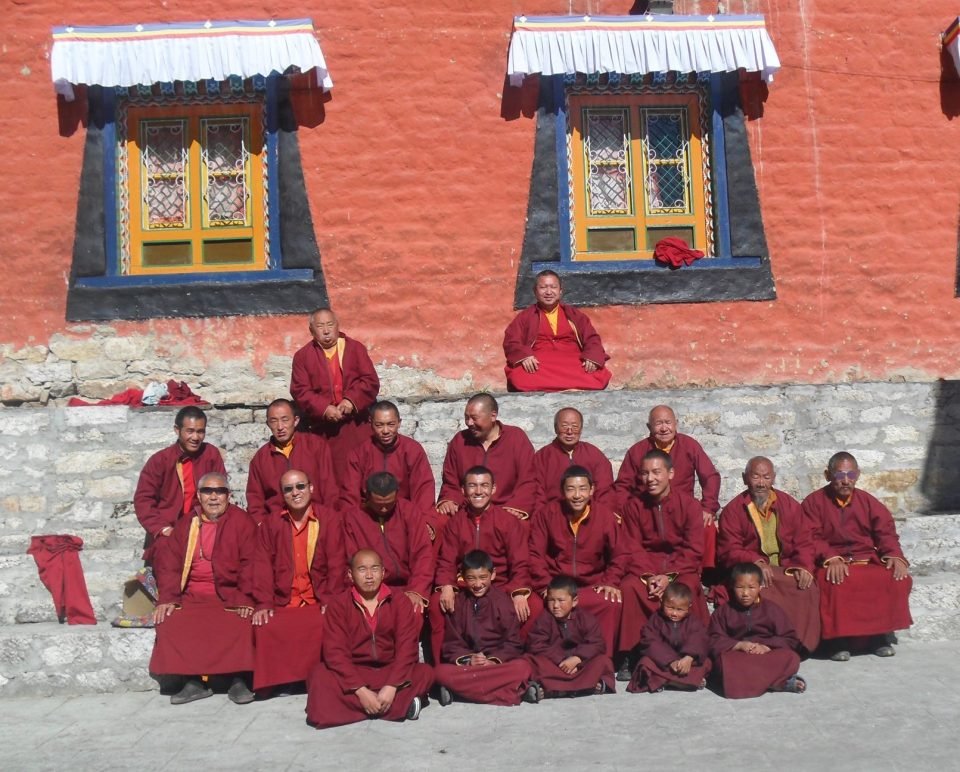
Thame Dechen Chokhorling Monastery monks.
Thame Dechen Chokhorling Monastery holds a special connection with the FPMT organization and is nestled in the breathtaking region of Solu Khumbu, high in the majestic Mount Everest area of Nepal. It carries a special significance as Thame is also the birthplace of Lama Zopa Rinpoche and is situated near Lawudo, which served as the residence of Rinpoche’s previous incarnation. Following the Nyima tradition of Tibetan Buddhism, the monastery is perched upon a rock, nearly four thousand meters above sea level, providing a picturesque panoramic view of the entire valley.
Dating back 350 years, the Thame Monastery holds a cherished place in history. Each year, it organizes the Mani Rimdu festival, a joyous occasion that spans 19 days. Buddhists in the Everest region of Nepal come together to celebrate the founding of Buddhism by Guru Rinpoche Padmasambhava during this festival. The festivities are characterized by vibrant masked dances, heartfelt prayers, and delightful feasts, creating an atmosphere of spiritual richness and cultural celebration.
Since 2017, the SOSF has been providing three nourishing meals per day to the 22 devoted monks residing in Thame Monastery. We are pleased to announce that this year, we have offered an annual grant of US$8,950.93 to support their well-being. This grant reflects our continued commitment to ensuring that the monks receive adequate nourishment, allowing them to focus on their spiritual practices and contribute to the growth and harmony of the monastery.
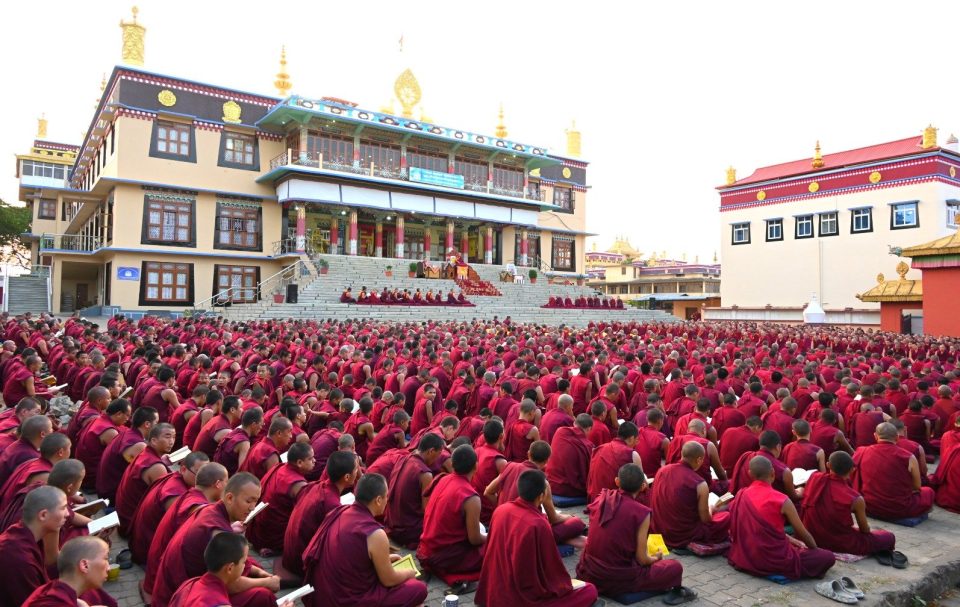
The monks of Sera Je Monastery gathering to offer prayers for the swift return of Lama Zopa Rinpoche. Photo courtesy of Sera Je Monastery.
During the 49-day period following Lama Zopa Rinpoche showing the aspect of passing, many heartfelt prayers were made for Rinpoche’s swift return. FPMT International Office offered US$170,551.97 and these funds were dedicated to making offerings to the various monasteries and nunneries in Nepal and India, with the sincere request for them to pray for Rinpoche’s swift return and for the FPMT organization to carry out Rinpoche’s legacy exactly as Rinpoche envisioned.
In support of this endeavor, the SOSF contributed US$74,896.99, forty percent of total amount offered. Geshe Ngawang Sangye personally visited a multitude of monasteries and nunneries on the 49th day, making offerings to the Sangha. Overall, offerings have been made to 15,000 dedicated Sangha members, as well as to the actual monasteries and nunneries, all with the sincerest intention of requesting them to make prayers for Rinpoche’s swift return.
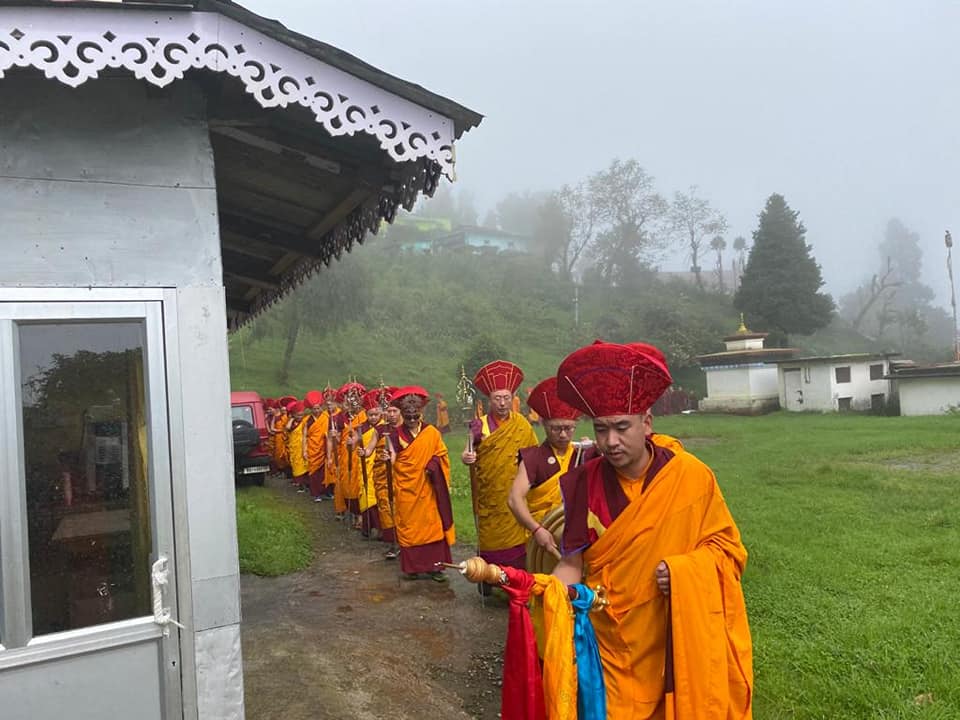
Monks of Zigar Thupten Shedrupling Institute.
Zigar Thupten Shedrupling Institute, located in the serene surroundings of Darjeeling, West Bengal, India, holds a profound significance as it diligently carries on the mission of preserving the lineage of Drukpa Kargyud. It is said that the first Zigar Rinpoche Sonam Gyatsho (1608-1669) was a manifestation of Guru Padmasambhava and that the following Zigar Rinpoches are incarnations of the King Trisong Detsen, that is manifestation of Manjushri, the Wisdom Buddha. In demonstrating a strong commitment to the monastery, Lama Zopa Rinpoche, through the compassionate endeavors of the SOSF, has pledged US$200,000 to assist in fulfilling the needs of this place. The SOSF is deeply honored to provide ongoing support to this exceptional monastery since 2019, specifically covering all necessary food expenses.
This year, the SOSF extends a contribution of US$34,000, enabling a two-year provision of necessary sustenance for the dedicated community of 62 monks who reside in the monastery. At present, a total donation of US$92,562 has been provided to the Zigar Monastery, which amounts to nearly half of the pledged amount by Lama Zopa Rinpoche.
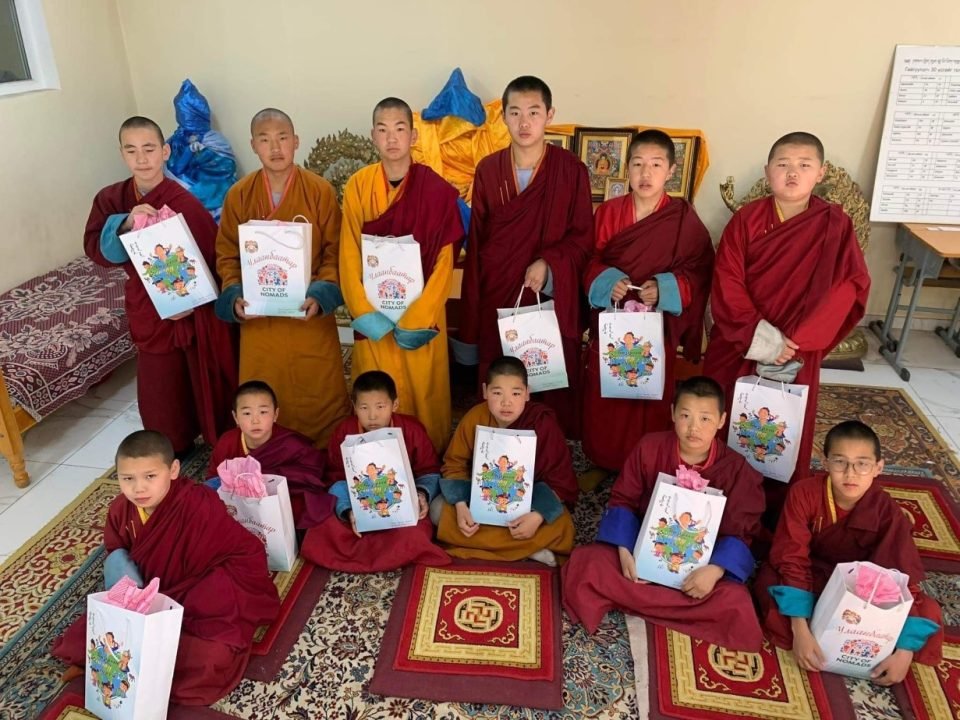
Monks of Idgaa Choinzinling Monastery.
In Ulaanbaatar, Mongolia, Idgaa Choinzinling Monastery shares a longstanding relationship with the FPMT organization. Understanding the importance of preserving the Buddhadharma in this region, Lama Zopa Rinpoche has wholeheartedly dedicated Himself to various charitable activities.
Among the initiatives undertaken, one significant contribution involves providing essential food support to the monks of Mongolia. Since 2015, the SOSF has been providing funds for sustaining the dietary needs of the monks, in addition to supporting the renovation and expansion of the monastery grounds.
In 2023 we are delighted to extend an offering of US$10,800 specifically allocated for lunch and dinner expenses. This contribution will ensure that the 32 Mongolian monks are provided with nourishing meals throughout the entire year, fostering their spiritual practice and well-being.
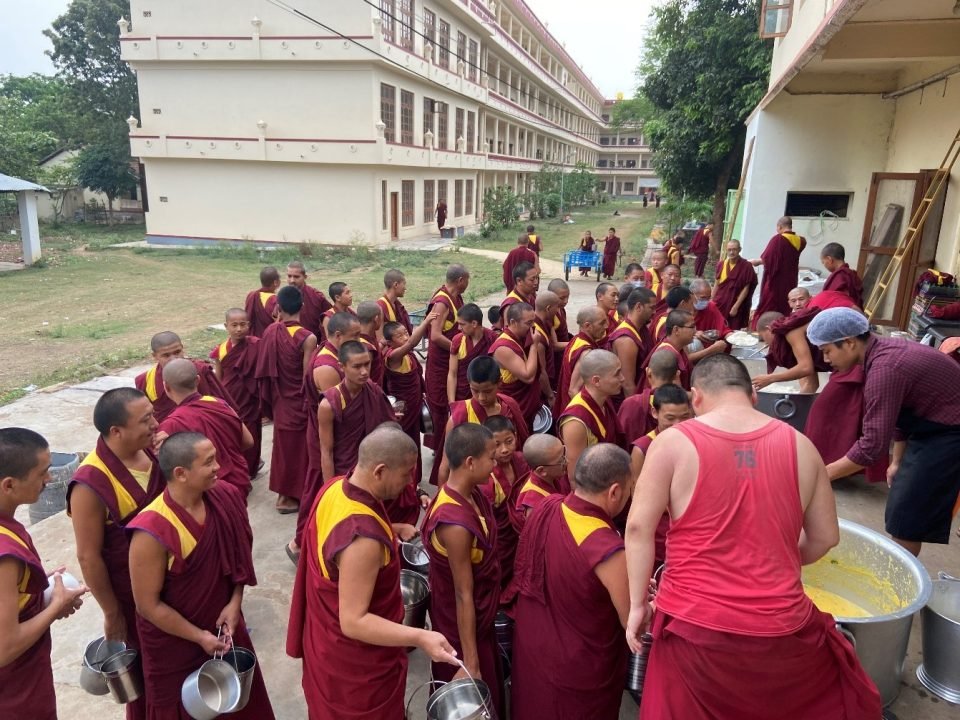
Lunch offering at Gyudmed Tantric Monastery.
Established in 1433, Gyudmed Tantric Monastery has served as a distinguished center for the study, practice, and preservation of the Guhyasamaja Tantra lineage in Tibet. Following the exile of His Holiness the Dalai Lama, the monastery was resettled in Hunsur, Karnataka, where it accommodates approximately 575 monks. In an effort to support the demanding study schedule of the monks, Lama Zopa Rinpoche wished to create a Food Fund project to ensure a stable source of funds for providing nourishing meals. This endeavor seeks to establish an endowment fund to cover the annual costs of daily meals for all monks, shielding them from food price fluctuations and inflation.
In 2022, the SOSF contributed US$500,000 to this vital initiative, with the aim of sustaining the monks’ education, allowing them to devote their full attention to their studies and continue enriching society through their teachings and spiritual practice. In 2023, according to the personal request of Lama Zopa Rinpoche, the SOSF allocated an additional US$100,000 to support the new Food Fund, a cause deeply cherished by Lama Zopa Rinpoche. Rinpoche’s extraordinary commitment is evident in the US$1,318,056 already raised or personally contributed. The overarching goal is to raise a total of US$2.1 million.
Detong Ling nuns visiting Monastère Dorje Pamo in France to meet the new Abbot of both the nunneries.
Situated in the Sierra Nevada, a mountain range around forty kilometers from the Mediterranean coast and within easy reach of Granada, Detong Ling Nunnery serves as a project of O.Sel Ling Centro de Retiros, an FPMT retreat center in Andalusia, Spain. The idyllic location offers a panoramic view over the vast valley and distant sea, nestled within a national park.
The nunnery structure includes a gompa, eleven single rooms for the nuns, a combined library and teaching room, a shared kitchen and dining area, and a spacious open terrace. During his visit to O.Sel Ling in May 2019, Lama Zopa Rinpoche blessed the nunnery, expressing his vision for it to serve as a place for older nuns to meditate and practice, and for newer nuns to engage in studying the Dharma. Rinpoche emphasized the importance, particularly for the Western Sangha, to have conducive living spaces where they can uphold their vows and dedicate themselves to study, contemplation, and meditation. The SOSF is delighted to dedicate a sum of US$10,648.44 toward constructing a separate cabin to house their new heating system.
The International Sangha Forum (ISF) in Bodhgaya, scheduled for December 20-23, 2023, aligns with His Holiness the Dalai Lama’s vision and falls under the World Buddhist International Programs series developed by the Southeast Asia Coordinator Office of His Holiness the Dalai Lama since 2018. This upcoming four-day program aims to gather over 2,000 monastics from different Buddhist traditions to initiate discussions on the three Higher Trainings and the role of Buddhism in the 21st century. Its ultimate goal is to foster continual dialogue and collaboration between practitioners of the Pali and Sanskrit traditions, recognizing commonalities, appreciating differences, and ensuring the adaptability of Buddhist teachings to contemporary challenges while safeguarding their timeless wisdom and relevance. The event will also feature a prayer session at the Mahabodhi Temple, attended by His Holiness the Dalai Lama and other distinguished Buddhist leaders, emphasizing the significance of this collaborative effort in promoting the accessibility and preservation of the Buddhadharma with a compassionate and inclusive spirit.
The SOSF is delighted to sponsor this event by donating US$15,000. This donation will be used to support travel, food, and accommodation for monastics attending the conference in Bodhgaya, reflecting our commitment to enabling the participation of a diverse and inclusive gathering of monastics from around the world.
We rejoice in the opportunity to support the Sangha in India, Nepal, and Mongolia, as we jointly work toward the preservation of the Buddhadharma in the world.
We also extend a heartfelt invitation for you to join us in celebrating these meaningful activities. We express deep gratitude to each and every donor who has generously contributed towards this noble cause, making these endeavors possible. Your support is truly valued and appreciated!
All are welcome to contribute to the Supporting Ordained Sangha Fund, to help ensure grants like these continue for the benefit of monks and nuns around the world.
Foundation for the Preservation of Mahayana Tradition (FPMT), is a Tibetan Buddhist organization dedicated to the transmission of the Mahayana Buddhist tradition and values worldwide through teaching, meditation and community service.
- Tagged: bigu nuns, detong ling nunnery, Gyudmed Monastery, idgaa choizinling monastery, international sangha forum, sera imi house, sera lachi, sera thekchenling lachi cultural society, shalu monastery, supporting ordained sangha, supporting ordained sangha fund, supporting sangha, tashi chime gatsal nunnery, thame monastery, zigar thupten shedrupling institute
6
Rejoicing in the Lama Tsongkhapa Teachers Fund Activities in 2022
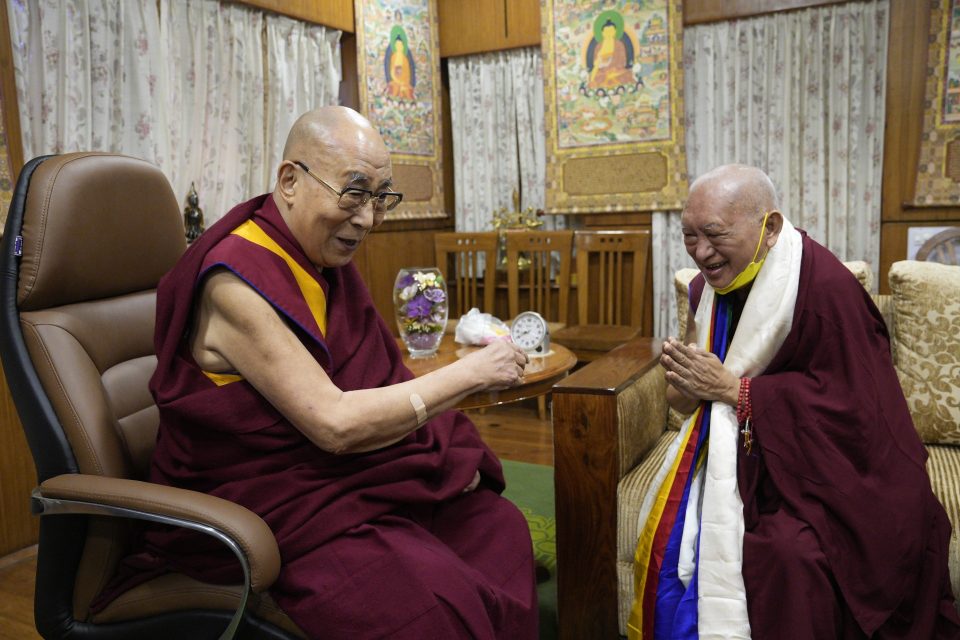
His Holiness the Dalai Lama meeting Lama Zopa Rinpoche in Dharamsala, India. November 2, 2022. Photo courtesy of the Office of His Holiness the Dalai Lama.
The Lama Tsongkhapa Teachers Fund was established by FPMT in 1997, at the request of His Holiness the Dalai Lama. Named after the great 14th-century founder of the Gelug tradition, the Lama Tsongkhapa Teachers Fund’s purpose is to invest in the preservation of the Gelugpa School of Tibetan Buddhism by supporting the teachers of tomorrow. Preserving the Mahayana tradition is the primary objective of the entire FPMT organization and the Lama Tsongkhapa Teachers Fund is one substantial way to help continue this work.
Below are the activities supported through a total of US$153,291 in grants offered in 2022. Please join us in rejoicing!
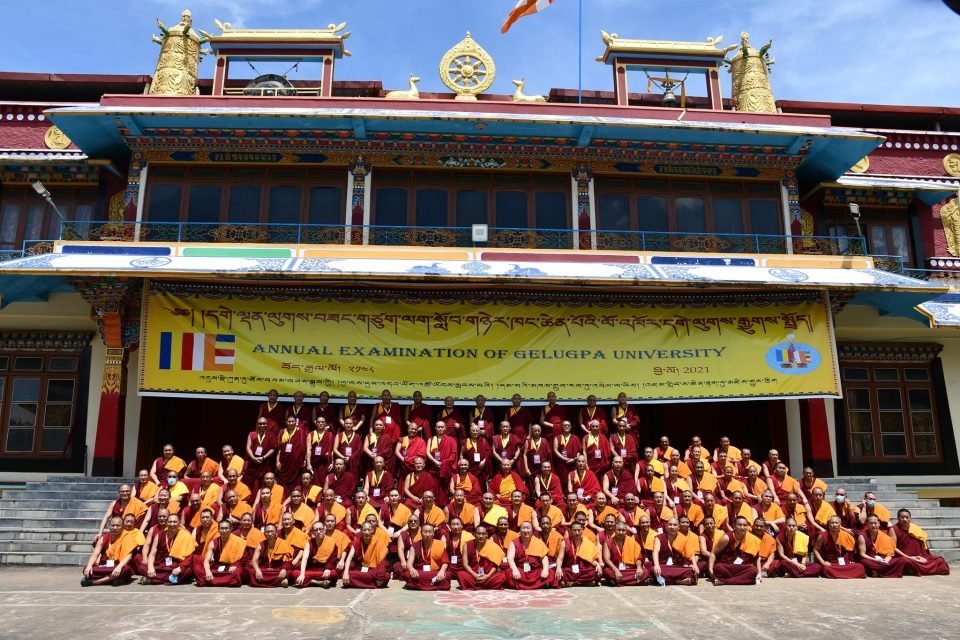
Gelug Exam participants.
Supporting Our Lineage Teachers & the Annual Gelug Exam
The Lama Tsongkhapa Teachers Fund has been covering the food and travel expenses of sangha participating in the annual Gelug Exam held at Sera Je Monastery, India. This great event draws the brightest scholars from the eight major Gelug monasteries each year, many of whom are already teaching or will go on to serve as teachers in the future. In 2022, 192 monks from eight monasteries participated in the Gelug Exam.
The Lama Tsongkhapa Teachers Fund also helps cover the basic needs of 137 main teachers of the tradition by providing small monthly stipends, freeing up their time to focus on their service in teaching students and deepening their own practice.
A total of US$22,891 was offered this year to sponsor the Annual Gelug Exam and provide monthly stipends to teachers.
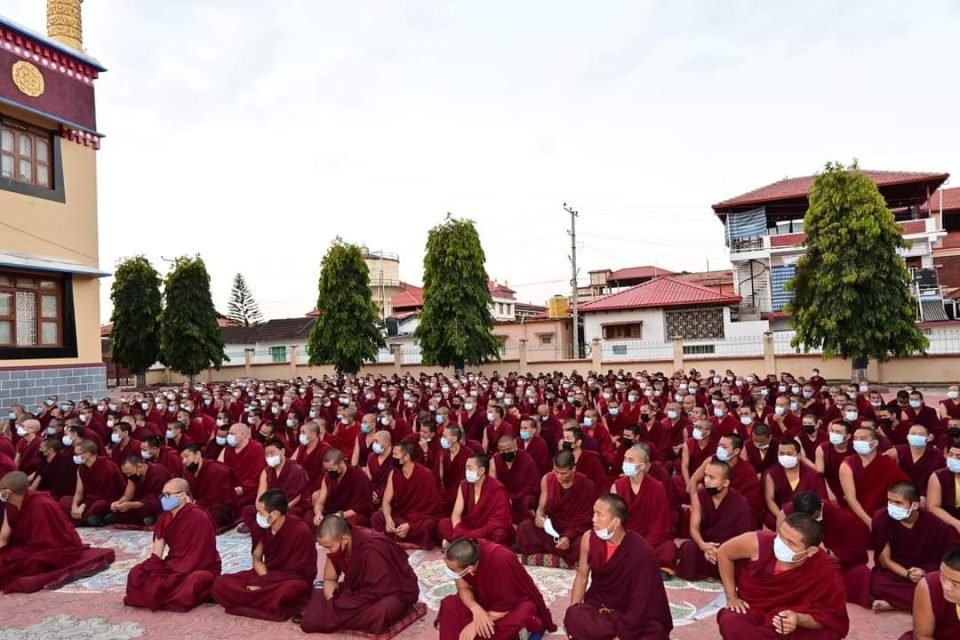
Monks during the Winter Debate at Sera Je Monastery.
Grants for Winter Debate & Memorization Exams
The Lama Tsongkhapa Teachers Fund also covered the travel expenses of sangha from Sera Je Monastery to attend the annual Winter Debate program at Gaden Monastery in Mundgod, India. Funds from a grant covered the travel costs of over 700 monks who attended, along with a few administrators and teachers who accompanied them from Sera Je.
A Special Memorization Exam is held at Sera Je Monastery each year, and the Lama Tsongkhapa Teachers Fund offered new robes and a cash offering to the monks who accomplished memorizing the following classic texts:
- 62 monks memorized Commentary of Clear Meaning by Haribhadra
- 49 monks memorized Essence of Eloquence by Lama Tsongkhapa
- 33 monks memorized Bodhisattvacaryavatara (Guide to the Bodhisattva’s Way of Life) by Shantideva
- 7 monks memorized the first chapter of General Meaning of Abhisamayalamkara Chapter One by Jetsun Chokyi Gyaltsen
- 3 monks memorized Six Collections of Reasoning by Arya Nagarjuna
- 2 monks memorized General Meaning of the Middle Way by Jetsun Chokyi Gyaltsen
- 2 monks memorized Five Treatises of Maitreya
US$27,900 was awarded in 2022 to Sera Je Monastery to support these beneficial activities.
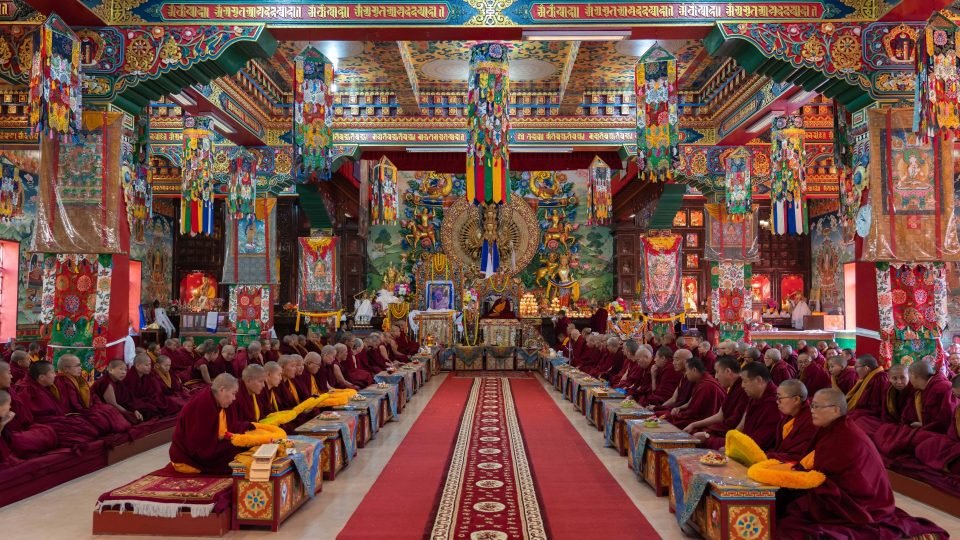
New geshema ceremony at Khachoe Ghakyil Nunnery Nepal, December 15, 2022. Photo by Ven. Lobsang Sherab.
Specialized Studies for Geshes and Geshemas
Each year a grant of US$87,500 is also provided to support specialized studies for 35 geshe lharampas and geshemas, allowing them to focus deeply on one of the five main monastic treatises in the subjects of Pramana, Prajnaparamita, Madhyamaka, Abhidharma, and Vinaya. This project is based on the advice by His Holiness the Dalai Lama, and was initiated by the Geluk International Foundation in 2020. Full funding has been received through the kind support of the U.S.-based Kaya Mandala Foundation, and the Lama Tsongkhapa Teachers Fund agreed to support the administering of grants until the geshes and geshemas complete their specialized studies. The recipients of the grant funds come from the six major monasteries in India and various nunneries.
“Taking responsibility for supporting these practitioners is extremely worthwhile because they are preserving and spreading the entire teaching of the Buddha.” – Lama Zopa Rinpoche
Funding Educational Research for Future Tibetan Medical Doctors
For the third consecutive year, the fund provided grants to Men-Tsee-Khang, the Tibetan Medical & Astro-science Institute in India, for the educational research of six doctors training in the traditional Tibetan medical tantras. Each doctor engaged in research to deepen their knowledge on specific topics, while they treated patients. Topics of research were centered in the three primary constitutional energies of loong, tripa, and baeken, and some focused on corresponding ailments related to imbalances of these constitutions in the body, such as asthma and hypothyroidism. In 2022, US$15,000 in grant funds were awarded through the Lama Tsongkhapa Teachers Fund.
Supporting this educational research and training for future doctors of Tibetan medicine serves to benefit Tibetan communities with new qualified doctors and preserves this precious medical science and cultural tradition.
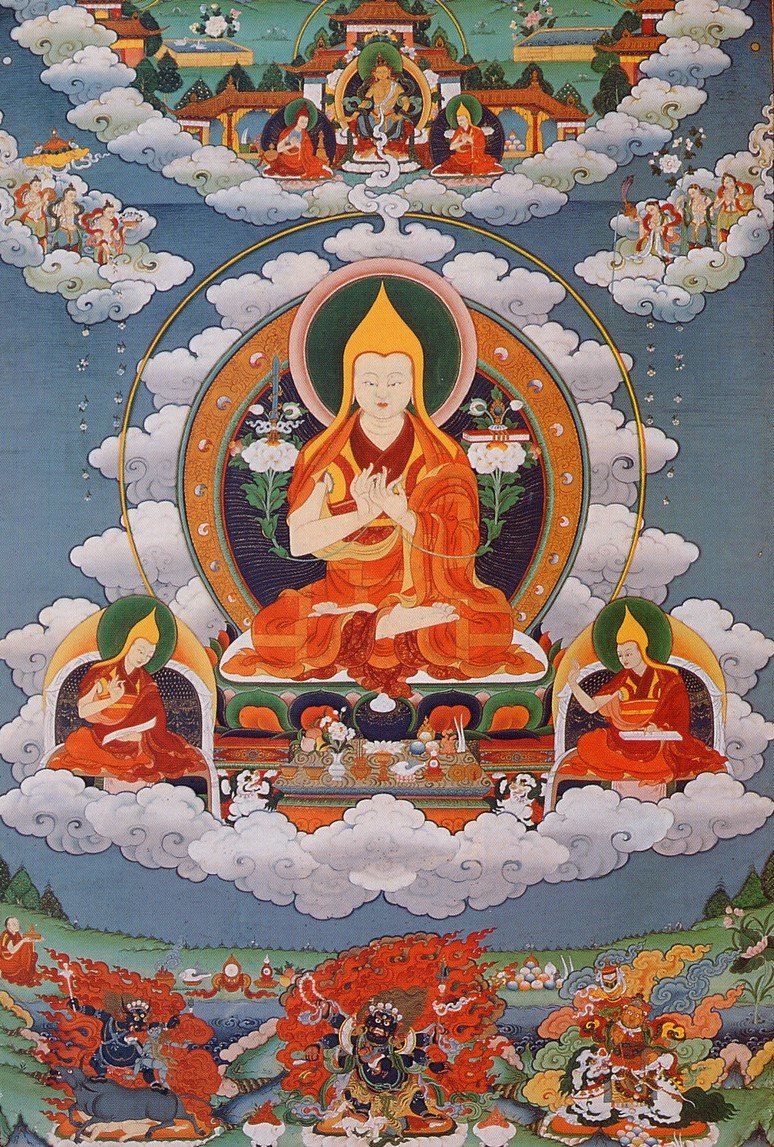
Lama Tsongkhapa with his two main disciples.
May the Lama Tsongkhapa Tradition Flourish
We invite a moment of rejoicing in all these inspiring activities that preserve the living lineage of Lama Tsongkhapa and the Buddha’s teachings, and serve to develop our current and next generations of Dharma teachers, practitioners, and scholars.
For the Dharma king Tsongkhapa’s
Way of Dharma to flourish,
May all signs of obstacles be pacified
And all conducive conditions be complete.
Due to the two types of merits
Of the three times of myself and others,
May the teachings of the victorious one, Lozang Dragpa,
Shine resplendent forever.
If you would like to support the Lama Tsongkhapa Teachers Fund, which preserves the unbroken Tsongkhapa lineage, and cultivates the foremost scholars of tomorrow. The fund provides support to the abbots and senior teachers of the Lama Tsongkhapa tradition, supports the annual Gelugpa exam and monks and nuns to attend the annual winter debate among many other activities.
- Tagged: lama tsongkhapa teachers fund
22
Rejoicing in Support Offered to Ordained Sangha in 2022
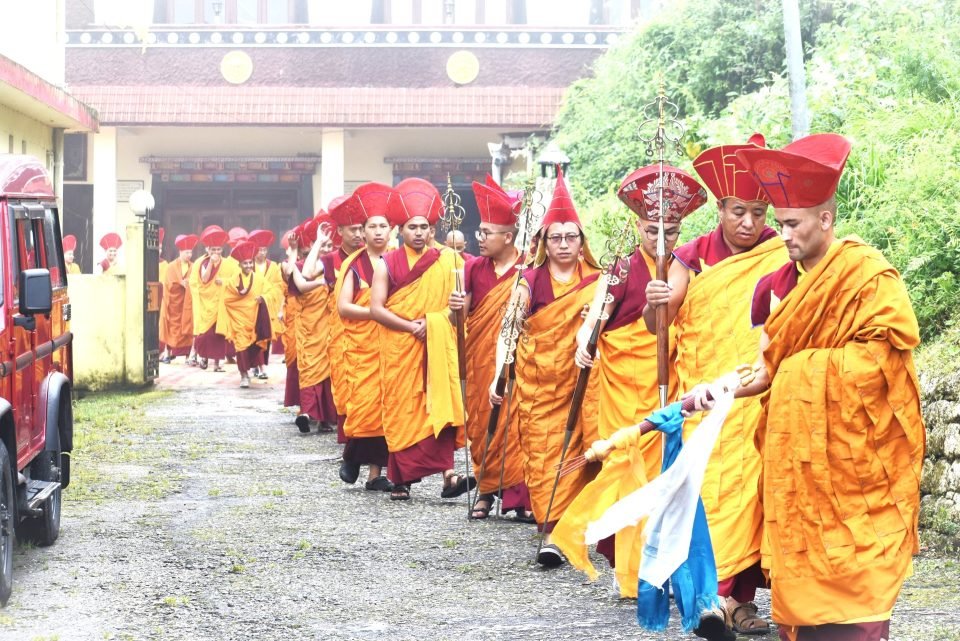
Monks of Zigar Monastery, Darjeeling, India.
Providing support to sangha living in vows is one of the highest priorities for the FPMT organization and the Supporting Ordained Sangha Fund offers food, accommodation, health care and education to sangha living in nunneries and monasteries around the world. “Taking responsibility for supporting these practitioners is extremely worthwhile,” Lama Zopa Rinpoche has explained, “because they are preserving and spreading the entire teaching of the Buddha.”
An amazing US$673,471 was offered for the support of sangha in 2022 and a further US$27,000 has been pledged and will be offered soon. We invite you to rejoice in these grants that FPMT has been able to make this year.
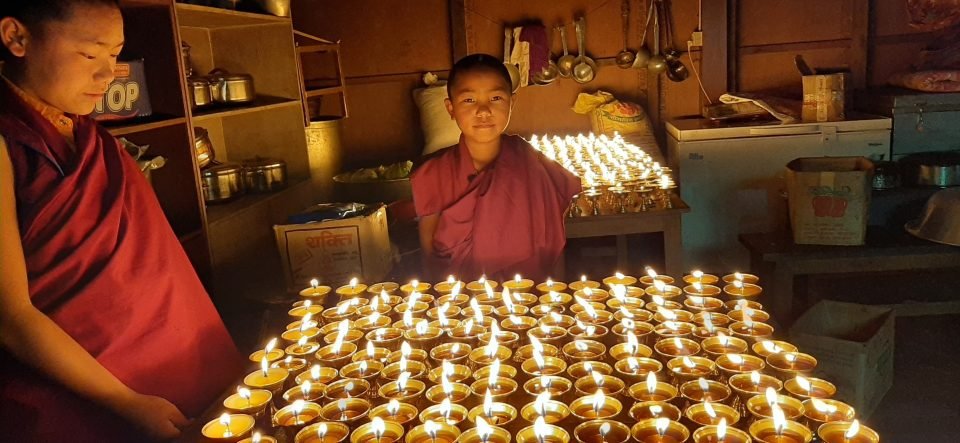
Young nuns of Tashi Chime Gatsal Nunnery, Nepal.
Since 2009 we have been sponsoring the nuns of Tashi Chime Gatsal Nunnery, a Kagyu nunnery in Nepal, to complete 100 million mani retreats (100 million recitations of the mantra OM MANI PADME HUM) each year. In addition to sponsoring the 100 million mani retreats, offerings are made to cover the cost of food for all during this period as well. Medical expenses were also offered for the nuns this year. US$19,269 was offered for these costs.
Over Lhabab Duchen (November 14-20) Lama Zopa Rinpoche visited the nunnery, joining Drukpa Rinpoche in blessing the newly opened gompa. Rinpoche also bestowed a two-day ordination to forty-five new nuns and offered Vajrayogini and Amitayus long life initiations.
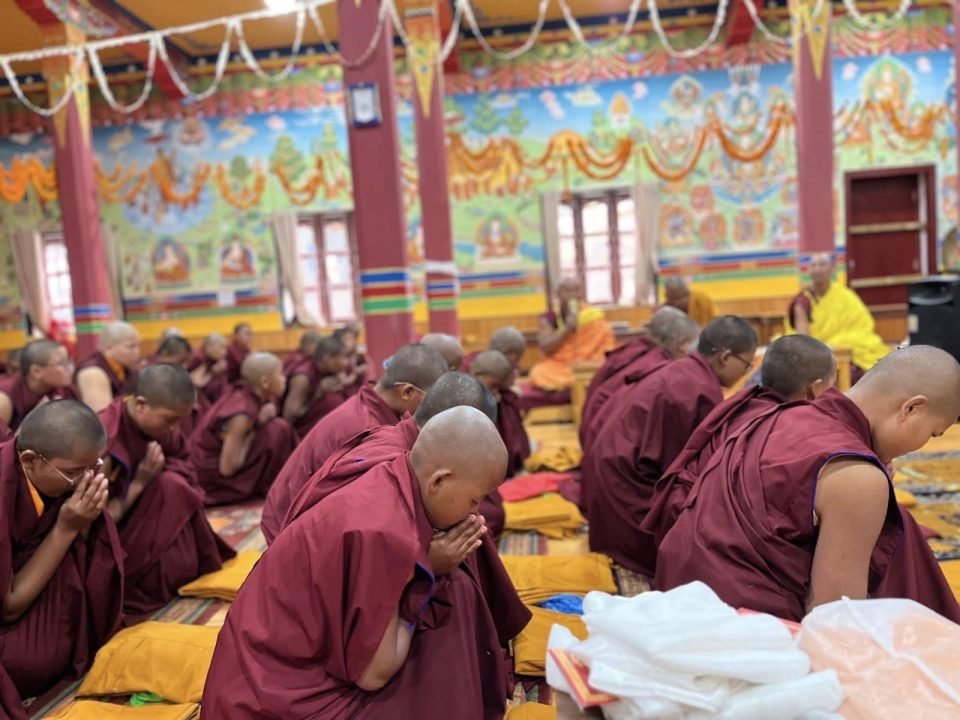
Lama Zopa Rinpoche offering ordination to forty-five new nuns at Tashi Chime Gatsal Nunnery in Bigu, Nepal. November 18, 2022.
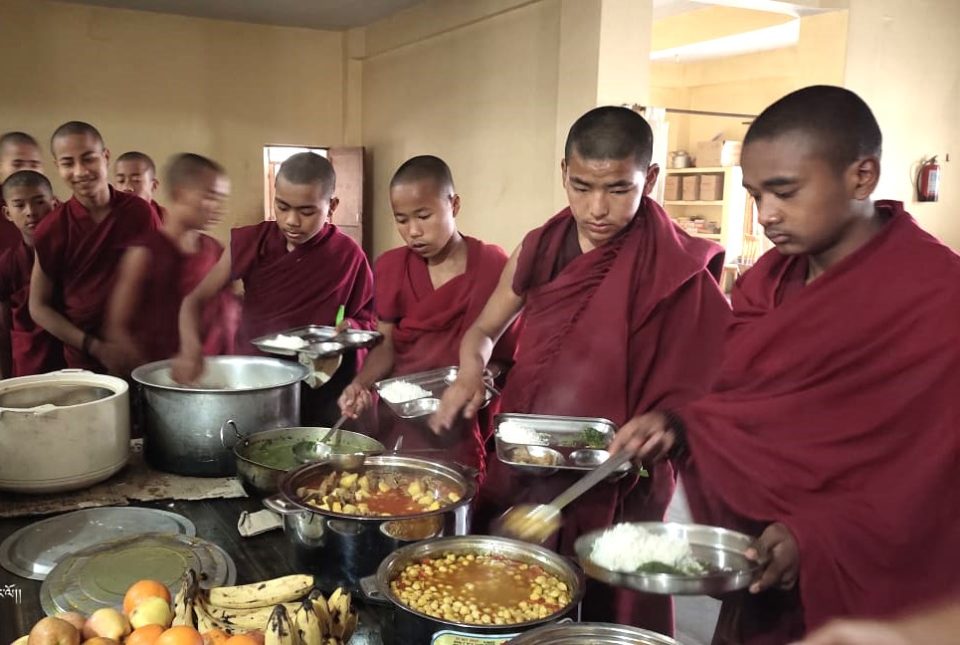
Monks of Shalu Monastery enjoying an offered meal.
For the last five years we have offered annual grants to Shalu Monastery, Himachal Pradesh, India, to cover the costs of food for the 50+ monks who study there. This year, US$16,930 was offered. In a letter of thanks and request for help, the monastery president, Ven. Tenpal, expressed, “How helpful this support has been in meeting the monastery’s daily necessities and solving our essential problem, especially during the past two years during the pandemic crisis which hampered global economics. Due to this, local visits to the temple have dropped significantly and the little bit of income we received was hampered.” We are extremely happy to be able to offer this essential support for the monastery. Offering support in this way is one of the core aims of the Supporting Ordained Sangha Fund.
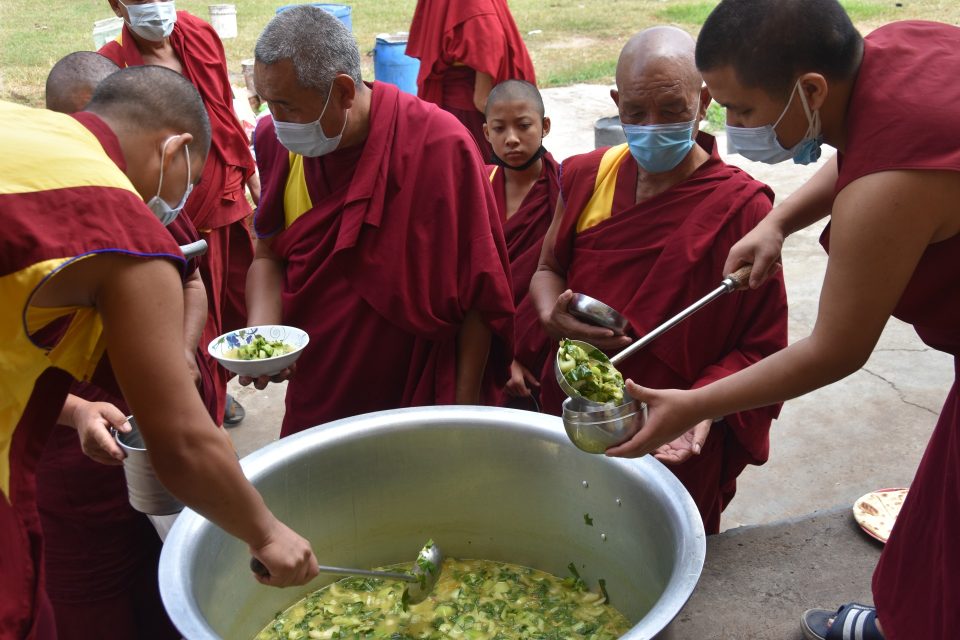
The monks of Gyudmed Monastery enjoying an offered lunch.
Earlier this year we announced that we had started offering sponsorship for a new food fund at Gyudmed Monastery which will provide support for quality meals to 575 monks studying at this extremely important monastery. The monastery has also created an endowment fund to cover annual costs from the interest of this fund. We are so pleased to have granted US$618,173 this year to the fund bringing the total offered to date to US$1,118,172. Rinpoche has been personally offering much of this money, as well as working hard to raise the rest. Rinpoche feels strongly that there is incredible benefit to establishing this food fund and long-term endowment that will support the monastery long in to the future.
Since 2019 we have been offering support to the sixty-two monks of Zigar Thupten Shedrupling Institute, a Kagyu monastery located in Darjeeling, India. This year, we have pledged and hope to be able to send the US$27,000 the costs of the monks’ food for two years.
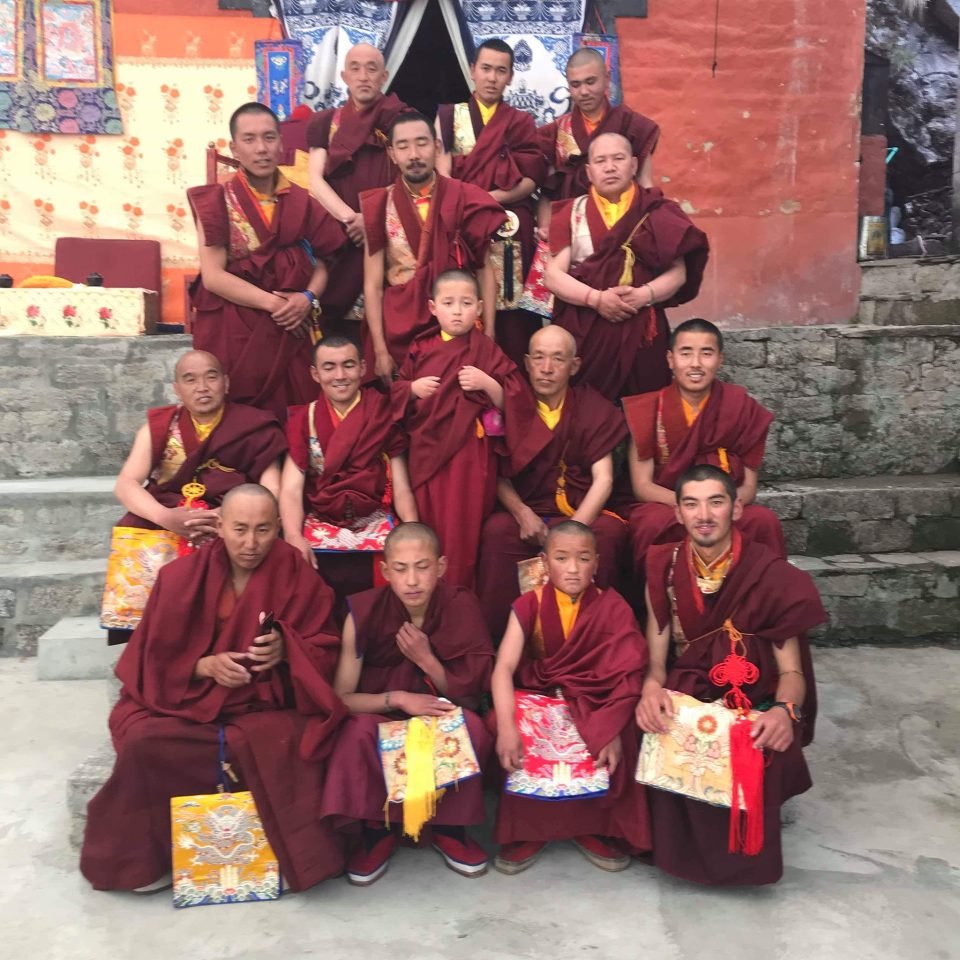
Monks of Thame Dechen Chokhorling Monastery, Thame, Nepal.
Since 2018 we have been offering three meals per day to the twenty-two monks of Thame Dechen Chokhorling Monastery. Thame is in Solu Khumbu, high in the Mount Everest region of Nepal which is a special place for FPMT as Lama Zopa Rinpoche was born there and it is located near Lawudo which was the home of Rinpoche’s previous incarnation. This year the cost of the food for the monks was US$9,660.
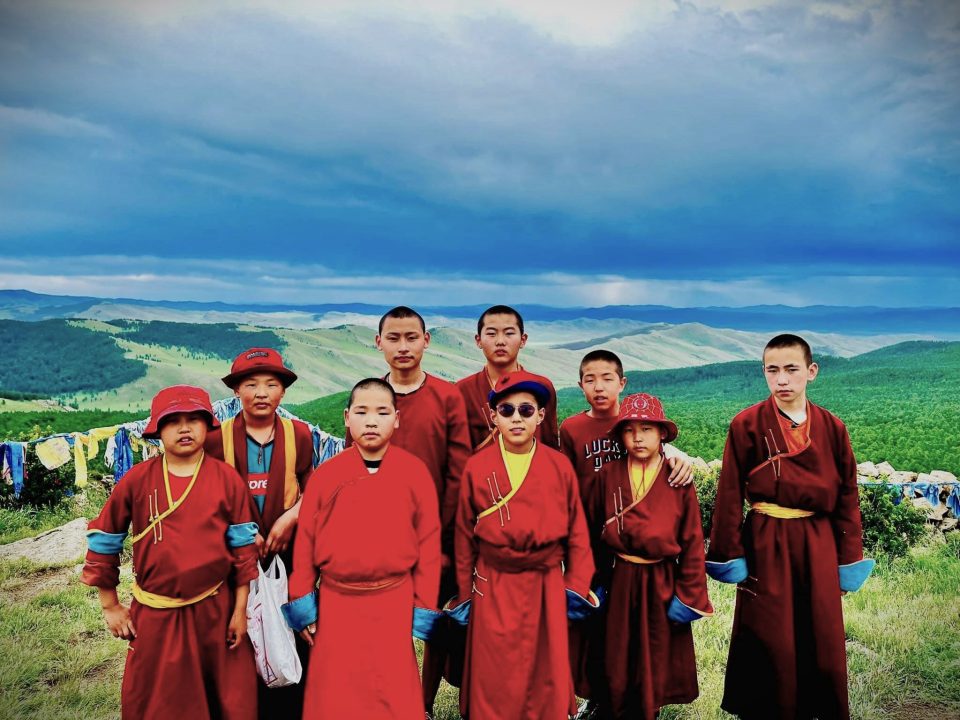
Some of the young monks of Idgaa Choizinling Monastery, Mongolia.
We have been offering food to the sixty monks of Idgaa Choizinling Monastery, Mongolia, since its inception in 2003. Idgaa Choizinling also has a branch in Sera Je Monastery, India, and serves as a focal point of Buddhist learning in Mongolia. This year we offered US$9,840 for lunch and dinner for the monks.
In addition to these grants, FPMT offers support to sangha through the International Mahayana Institute, which supports the non-Himalayan sangha of FPMT through the Lama Yeshe Sangha Fund; the Practice and Retreat Fund, which provides grants and sponsorships to individuals engaged in retreats such as 108 nyung ne retreats and 100 million mani retreats; the Lama Tsongkhapa Teachers Fund, which helps to preserve the Gelugpa school of Tibetan Buddhism by offering monthly stipends and annual offerings to all the main teachers of the main Gelugpa monasteries, the past and current abbotts, and also the top scholars.
Thank you to all the donors of this fund, who make these offerings possible. If you would also like to contribute to supporting sangha in meaningful and essential ways please consider donating here: https://fpmt.org/support/supporting-ordained-sangha
If you would like to support monastics, please learn more about the Supporting Ordained Sangha Fund and the ways it supports monasteries and nunneries around the world.
- Tagged: Gyudmed Monastery, idgaa choizinling monastery, shalu monastery, supporting ordained sangha fund, tashi chime gatsal nunnery, thame monastery, zigar thupten shedrupling institute
6
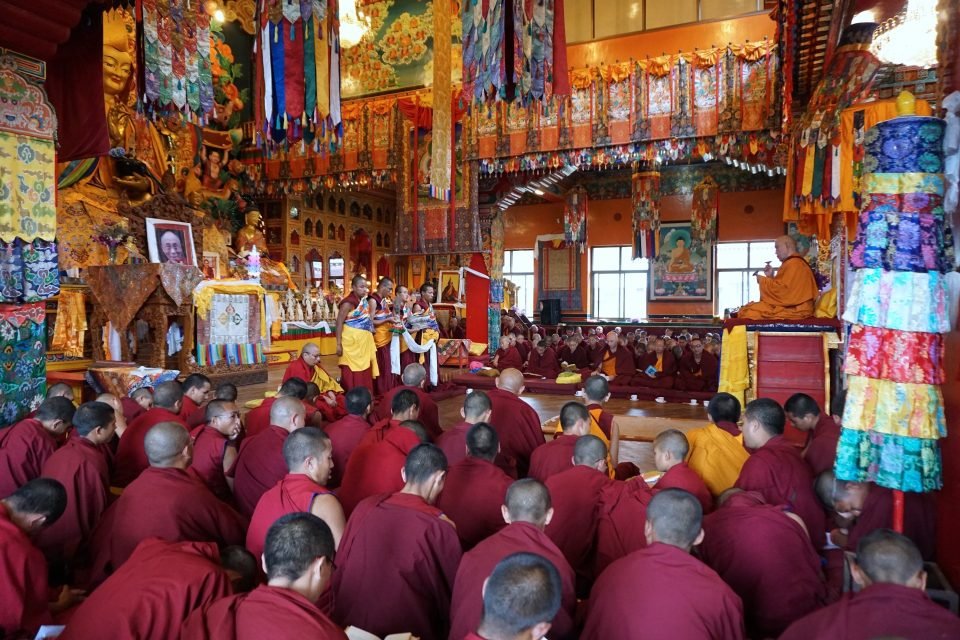
Jangtse Choje Rinpoche presiding over the Monlam prayer festival at Kopan Monastery, 2017. Photo by Ven. Lobsang Sherab.
Since 1998, the Gelug Monlam—known as the Great Prayer Festival—has been held at Kopan Monastery, Nepal, in the tradition of Lama Tsongkhapa, who founded the festival in 1409. The Monlam is regarded as one the “four great activities” of Lama Tsongkhapa’s life. It is held on the first Tibetan month of the year, during Chotrul Duchen, or the “Fifteen Days of Miracles.”
We reached out to Geshe Losang Sherab, who has served as the umze, or chant leader, for the Gelug Monlam at Kopan since 2001, to help share how this tradition, now over six centuries old, is preserved and carried on at Kopan today.
From Lhasa to Kopan – A Brief History of the Great Prayer Festival
Chotrul Duchen is one of the four major anniversaries celebrating the extraordinary deeds of Shakyamuni Buddha. According to the vinaya text Treasure of Quotations and Logic, karmic potential on these special Buddha Days are increased by a 100 million. Chotrul Duchen marks the time when Shakyamuni Buddha, while in Sravasti, India, displayed a series of miraculous acts in response to a public challenge by six ascetics, as a means to instill faith and inspiration.
The first Great Prayer Festival to celebrate Chotrul Duchen was led by Lama Tsongkhapa at the Jokhang temple in Lhasa, Tibet, during the Tibetan New Year of 1409. The Monlam tradition would become very popular and eventually adopted by all the major schools of Tibet.
Geshe Losang Sherab explains, “Lama Tsongkhapa started the festival to remember the kindness of the Buddha and also to create an environment for the people, both lay and Sangha, to create merit. Thousands of monks from all major monasteries around Lhasa such as Sera, Ganden, and Drepung took part every year. So many sponsors would come from all parts of Tibet to make offerings to the Sangha. It was a great opportunity for the both the Sangha, the sponsors, and all who took part in it to accumulate a great number of merits.”
The Gelug Monlam would continue to be held at the Jokhang in Lhasa until 1498, when it was stopped due to political strife at the time. The second Dalai Lama, Gendun Gyatso, revived the Monlam in 1517 while serving as abbot of Drepung Monastery. It was celebrated at the Jokhang Temple continuously until the invasion of Tibet by the Chinese army in 1959.
Geshe Losang Sherab continues, “After 1959, the three great monasteries held Monlam in Buxa, and after the three great monasteries were re-established in south India, they celebrated it in their own monasteries. I think the reason was the distance between the monasteries, which made it difficult, costly, and time consuming to assemble together as in Tibet”
The Gelug Monlam began to be held in Nepal in 1992. Kopan Monastery’s location, up in the hills outside of Kathmandu, was seen to be less ideal than other monasteries at the time, so Kopan never hosted the festival during its first years in Nepal.
According to Geshe Losang Sherab, it was around 1998 that new challenges arose for preserving the continuity of the Gelug Monlam. After His Holiness the Dalai Lama’s request for the discontinuation of the practice of Shugden, some monasteries were still continuing to do the practice. Under the circumstances, Lama Zopa Rinpoche and Khensur Rinpoche Lama Lhundrup offered to hold the Monlam at Kopan. A few other monasteries joined, and a new Gelug Monlam committee also formed around this time. The committee requested Lama Zopa Rinpoche to lead the Gelug Monlam that year.
Geshe Losang Sherab remarks about the 1998 prayer festival:
“With blessings of Kyabje Lama Zopa Rinpoche, the Monlam that year at Kopan went very well, with many locals attending despite the distance they had to travel, and with donations from locals, generous benefactors from other countries, FPMT’s Lama Tsong Khapa Teachers Fund, and some FPMT centers. From that year, almost every year the Monlams were held at Kopan. Some of the other monasteries that didn’t give up the worship of Shugden at first gave it up and joined Monlam at Kopan. After that, many great lamas such as the 100th Ganden Tripa Geshe Lobsang Nyima Rinpoche, (then Jangtse Choje Rijong Rinpoche), Denma Locho Rinpoche, the present Ganden Tri Rinpoche and presently Jangtse Choje Gosok Rinpoche presides over the Monlam.”
How the Gelug Monlam Tradition is Carried Forward Today
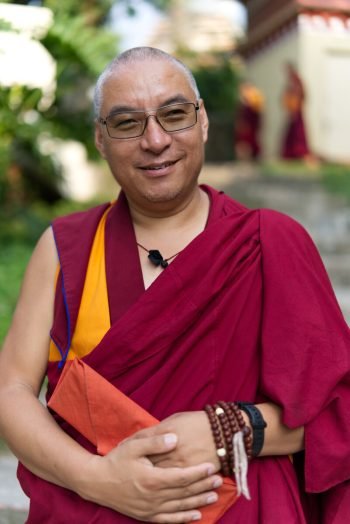
Chant Master of Gelug Monlam at Kopan Monastery, Geshe Losang Sherab.
Geshe Losang Sherab has been the head chant master for the Gelug Monlam for twenty-one years. He describes the position:
“Being the umze of the Monlam I have the responsibility of the leading the chanting and to make sure that it’s done in as authentic a way as possible. I prepare a group of monks who are called Kesang (“good voice”) and Donsang (“having memorized many texts”) and teach them the tunes, and also make them memorize the texts they haven’t memorized. I also do at least six to seven days of training with all Kopan monks and a full rehearsal before the actual Monlam.”
The progression and practice of the Monlam is very elaborate and specifically organized. We asked Geshe Losang Sherab to help describe a picture of the tradition. He kindly offered a detailed account below:
“The prayers that are recited during Monlam are common in all Gelug monasteries, but the tune that is used during the actual Monlam is always from Drepung Monastery, as it was done since the time of the second Dalai Lama.”
Geshe Losang Sherab explained that it was the second Dalai Lama who “restored the great Monlam in Lhasa and established rules and regulations, including the set of prayers that are recited during the Monlam.”
The rest of the prayers, apart from the main Monlam activities, are chanted in the Sera Je Monastery tradition – the monastery that Kopan is most closely connected with.
“During the first session in the morning, many prayers are recited, mainly the homage to Buddha, confession to Thirty-five Buddhas, Ornament for Clear Realization (Abisamayalankara ) by Venerable Maitreya, Introduction to the Middle Path (Madhyamakavatara) by Chandrakirti and Manjushri Nama Samgiti, etc. Tea and bread is served during this session.
“During the second session, monks and nuns from all the monasteries and nunneries would debate on logic to the geshes from Kopan who are appointed to answer the debate.
“During the third session, the head lama of Monlam is invited with procession of gyaling [horns], victory banners and yellow parasol. The chant master chants Migtsema prayers until the lama sits on the throne. Then all Sangha sit on the floor offering three prostrations to the lama. The lama would lead the Heart Sutra followed by the prayers to lineage lamas. After that, the chant master makes three prostrations and chants the mandala offering, after which the lama would teach on the Jakata Tales. After it’s completed, the lama would do dedications, and then he’s invited to his quarters in the same way he was invited to the teaching venue.
“After that, there’s a session during which tea and lunch is served. During this session, Lama Tsongkhapa guru yoga, lamrim Lines of Experience, Triple Ground of Glory, prayers to sixteen Arhats, eight powerful prayers, mantras such as the Namgyalma long mantra, and Medicine Buddha mantras are recited.
“Then after half an hour break, the fourth session begins. During this the monks and nuns from all the monasteries and nunneries debate on the paramitas and on view of the Middle Way to the appointed answers from Kopan.
“Then the actual Monlam begins after the Head Lama is invited with a procession of gyaling [horns], victory banners, and parasol. The lama makes three prostrations to the altar and then sits on the throne. After this all the Sangha sit down. The chant master leads prayers standing on his seat, beginning with the Likdrima (praise to Tara), Kapsumpa (praise to the Buddha by Lama Tsongkhapa), Losang Gyalkunma (supplication to the lineage gurus), prayers of Maitreya, and the Prayers at the Beginning, Middle and End by Lama Tsongkhapa. During the last two prayers, the chant master would walk with huge steps during each verse which is called Cham (“dance”), and offer a khata [scarf] to the lama. The chant master then walks backwards and sits on the seat.
“After that, the assistant chant master and his three companions stand up and start the bath offering prayers and offering the five objects of desire, the seven royal possessions, etc., then an extensive mandala offering followed by prostrations, reciting the confession to Thirty-five Buddhas, and sits down. Then the head lama starts the torma offering to the landlord, after which the chant master stands up and leads the prayer of secret biography of Lama Tsongkhapa. During this, the chant master performs the Cham dance with huge steps at the end of every verse. Then the Foundation of All Good Qualities is chanted. While chanting, the chant master goes back to his seat, walking backwards with huge steps and sits down on his seat. After this, the head lama recites the dedication prayers.
“At the end of the session, the chant master, the assistant chant master and his three companions stand up, wearing the yellow hat and recite the auspicious prayers. Then the lama is invited to his quarters. During the fifth session, extensive White Umbrella prayers and prayers to Lion-face Dakini, and Twenty-one Tara praises are recited. Dinner is served during this session.
“During every prayer session, the Gegu (“master of discipline”) reads the dedication forms with the names of sponsors. During every prayer session, the Heart Sutra and the Hundred-syllable mantra are recited, and at the end of every prayer session, the torma offering to Palden Lhamo and other protectors are recited. The program ends with debate on Vinaya and Abhidharma in the evening.
“On the fourth day of Monlam, which falls on the full moon day, the beautiful butter sculpture made by Kopan monks is displayed outside for the people to get blessed. On the last day of Monlam, Maitreya Buddha statue is invited with a huge procession. And in the afternoon [of the last day], Kopan Lama Gyupas offer the Torgyak which they have prepared and consecrated for three days. Then a dinner session is held and during which the secretary of the Monlam reads out the account of income and expenses of Monlam, and then the Monlam of that year concludes auspiciously.”
Please join us in rejoicing in the preservation of this incredible tradition at Kopan Monastery! The Lama Tsongkhapa Teachers Fund is a sponsor of the Gelug Monlam which is essential for preserving the Lama Tsongkhapa tradition.
Since its inception, the Lama Tsongkhapa Teachers Fund, an extension of the Supporting Ordained Sangha Fund, has supported the preservation of the Gelug School of Tibetan Buddhism.
With tremendous thanks to Geshe Losang Sherab for his time and information about this rich tradition.
16
Supporting the Food Fund of Gyudmed Tantric Monastery
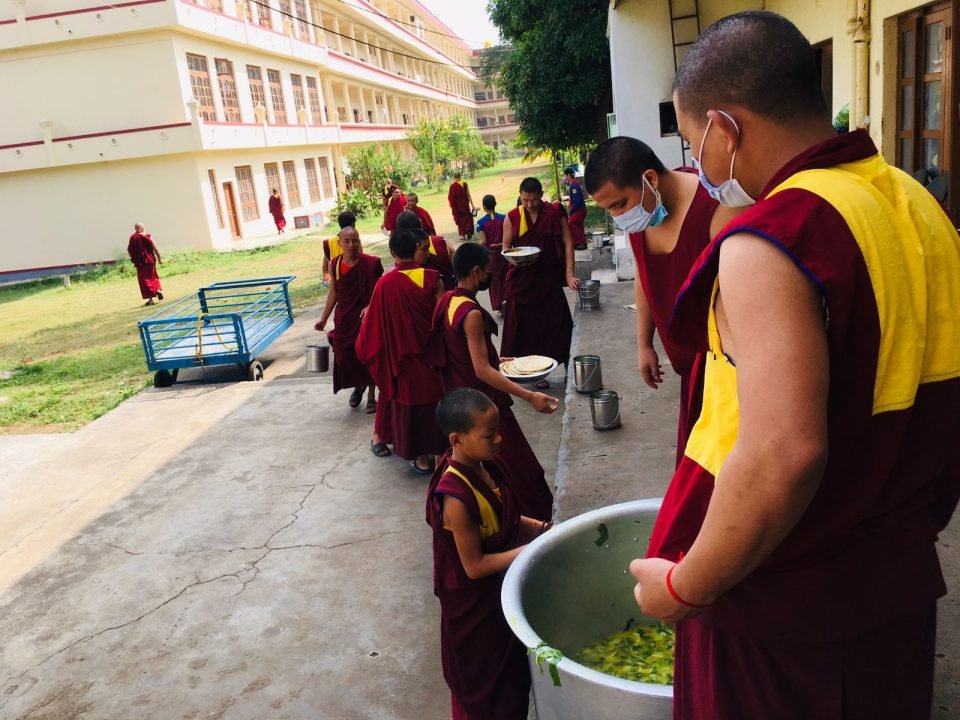
Some monks of Gyudmed Tantric Monastery, Hunsur, India, enjoying a meal offered through the new Food Fund.
Since 1433, Gyudmed Monastery has been providing the highest education to many of the top Buddhist scholars and teachers. Through the Supporting Ordained Sangha Fund, and the kindness of Lama Zopa Rinpoche, we are pleased to now be supporting this monastery’s new Food Fund which will provide support for quality meals to 575 monks studying at this extremely important monastery. The Food Fund has also created an endowment fund to cover annual costs from the interest of this fund.
History of Gyudmed Tantric Monastery
Gyudmed Tantric Monastery was founded by Jetsun Sherab Sengye, one of the four supreme disciples of Lama Tsongkhapa who was entrusted with the responsibility of the preservation and the promotion of the most sacred lineage of Guhyasamaja Tantra. Based on the personal instructions received from Lama Tsongkhapa, he established Segyud Monastery in upper Tibet and Gyudmed Monastery in Central Tibet in 1433. Of the two, Gyudmed Monastery flourished and became the most important seat for the study and practice of Guhyasamaja Tantra in Tibet over many centuries.
When His Holiness the Dalai Lama came into exile, around 180 monks from the Gyudmed Monastery followed him to India. They initially established the monastery in a transit camp at Dalhousie in northern India, which was then re-established in Hunsur in Karnataka state in 1972. The unique traditions, such as the sacred chanting, rituals, and other practices, have been continually maintained consistently through the years.
Gyudmed now has around 575 monks and is one of the only two established Gelug lineage centers for studies of Vajrayana Buddhism in Tibet. Apart from the studies of the great Guhyasamaja Tantra and its commentaries, this monastery also contains the sacred lineages of chanting rituals, the art of making sand mandalas, butter sculptures, and so on—lineages which have survived intact from Lama Tsongkhapa. Geshes, who have more than twenty years of sutra studies, come to this monastery to do further studies on tantra. Additionally, whomever holds the seat of the great Ganden Tripa or the Throne Holder of Ganden, the figurehead of the Gelug lineage of Tibetan Buddhism, has to come through this Gyudmed Monastery.
Food Fund Project
At the time of its re-establishment in South India, there were 370 monks at the monastery. In the early years they had to do farming, construction, carpet making, and other jobs in addition to their academic responsibilities. The situation improved after 1989, when the monks were able to devote more of their time to their study and practice. The tough schedule of the monastery requires very strenuous long hours of study from early morning to late night. The health of the monks was affected in early years due to lack of nutritious meals. Individual monks had to find their own meals and teachers who had many students had to work hard to feed their students.
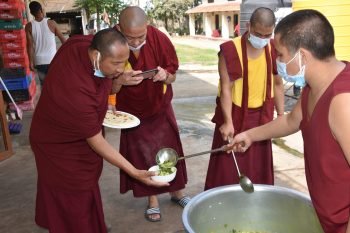
Monks of Gyudmed Monastery receiving a meal offered through the new Food Fund.
This led to the creation of a meal program for the saṅgha, so the food and nutritional needs of all the monks would be taken care of by the monastic administration. For many years the monastery has worked hard to provide three nutritious meals a day to the monks but has recently faced many challenges due to inflation, lack of gas, and a concrete source of funds for the meal program.
The administration came up with a concrete plan to address this challenge by setting up a Food Fund project. This project will help protect the monastery against the seasonal variations of food prices and the overall general inflation in prices seen in India. Moreover, the administration can have a stable source of funds for the monks’ meals. Like the highly successful Sera Je Food Fund, the concept would be to build up an endowment fund large enough to support the long-term health of their own food fund, whereby the interest from the endowment would cover the annual costs associated with offering meals daily for all the monks of Gyudmed Tantric Monastery, for as long as the endowment remains.
The Supporting Ordained Sangha Fund is delighted to have already offered US$500,000 toward the creation of this new Food Fund. This great monastery has an excellent reputation and has produced so many educated and highly realized practitioners which benefit the world in incalculable ways. To sustain this high level of achievement it is essential that the monks can dedicate themselves completely to the extensive studies at the monastery.
Please join us in rejoicing in this wonderful opportunity for the monks of Gyudmed Tantric College to be able to devote their precious time to their studies, without the strenuous burden of providing for their food, and please consider also contributing to the Supporting Ordained Sangha Fund, so that we can continue to help sangha with essential needs such as food and education.
To learn how the Supporting Ordained Sangha Fund is directly benefiting monasteries and nunneries around the world, you can read all the latest news of this project: fpmt.org/projects/fpmt/supporting-ordained-sangha-fund/supporting-ordained-sangha-fund-news/
7
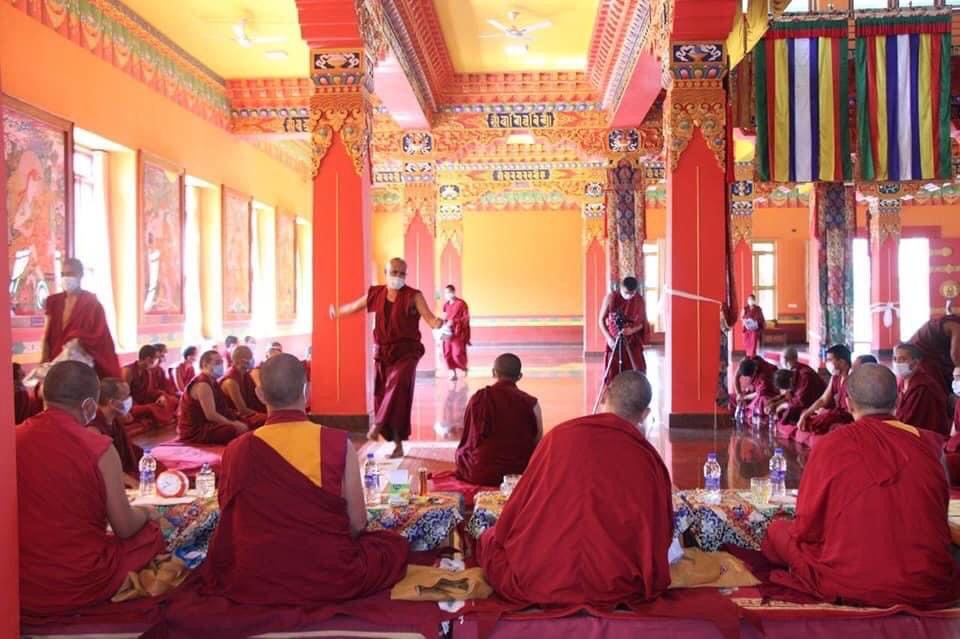
Monks of Tashi Lhunpo Monastery engaged in debate.
Tashi Lhunpo Monastery, located in Bylakuppe, Southern India, and seat to the Panchen Lama, has grown significantly over the last few decades and is now home to 415 monks and one of the major centers of Tibetan Buddhist study and practice in exile in India.
Tashi Lhunpo Monastery was founded by His Holiness the 1st Dalai Lama, Gyalwa Gedun Drupa in 1447, and became the most vibrant monastery in U-Tsang province of Tibet. Over the years, the monastery flourished as a center of learning, and played a vital role in the preservation of Mahayana Buddhist Philosophy and practice. By 1959, this monastery was responsible for the education of 7,000 monks from within and outside of Tibet. Following the Chinese invasion of Tibet, the monastery was not able to continue in its previous form. In 1972, under the guidance of His Holiness the Dalai Lama and with determination of the senior monks, the monastery was re-established in Bylakuppe, Karnataka State.
The monastery is comprised of Tashi Lhunpo Monastic School for young monks, Higher Buddhist Studies which takes twenty-four years to complete, and Tashi Lhunpo Tantric College to complete the lifetime study curriculum and program.
As the monastery continues to grow, additions are needed to support the conditions needed to ensure quality education. A courtyard was added in 2012, a new prayer hall was completed in 2015, an expansive library was added in 2016, and now we are so happy to offer a grant for a new 27,000 square foot debate courtyard being built with permanent canopies over it. This courtyard was needed for several reasons. Primarily, during monsoon season the monks have limited space to debate due to the months of heavy rain. Additionally, the heat can become intolerable without shade and when the monks are cramped into limited indoor space, the echo of their voices disturbs the quality of sound and understanding each other properly during debate becomes difficult. An additional benefit of this extension will be that the monastery can utilize this space for ceremonies, functions, and for grand debate sessions with additional monasteries (Upper Chotok Chemo). In short, this new courtyard will enable the monks to debate uninterrupted through the year without any external hindrances and space limitations.
Lama Zopa Rinpoche wanted very much to support the monastery with this project and through the Supporting Ordained Sangha Fund, US$430,575 was granted for this debate courtyard which will benefit the monks studying there for generations to come.
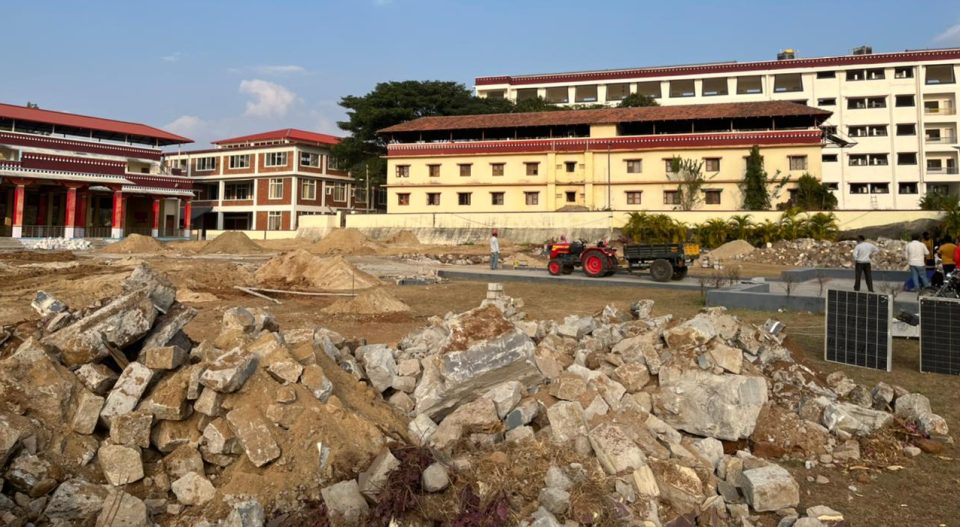
Site of the new debate courtyard being built at Tashi Lhunpo Monastery.
Debate is a very special way to develop wisdom and explore different subjects and helps the monks understand the teachings in a deep and clear way. This way, Dharma education becomes very real and sharp, not shallow or just words. As Lama Zopa Rinpoche has explained, “It is like an inner science of the two truths: absolute truth and conventional truth.”
Please join us in rejoicing in the offering of this grant which will benefit this monastery and help spread and preserve Mahayana Buddhism far into the future.
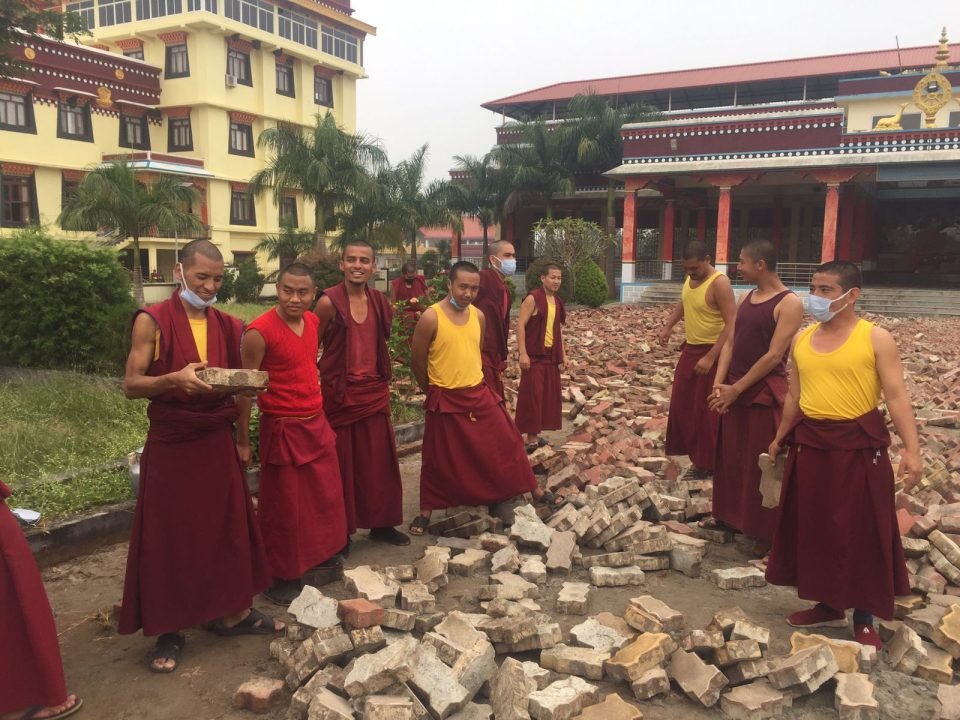
Monks of Tashi Lhunpo Monastery on the site of the new debate courtyard.
To support Sangha and learn how the Supporting Ordained Sangha Fund is directly benefiting monasteries and nunneries around the world, you can read all the latest news of this project: fpmt.org/projects/fpmt/supporting-ordained-sangha-fund/supporting-ordained-sangha-fund-news/
- Home
- News/Media
- Study & Practice
- About FPMT Education Services
- Latest News
- Programs
- New to Buddhism?
- Buddhist Mind Science: Activating Your Potential
- Heart Advice for Death and Dying
- Discovering Buddhism
- Living in the Path
- Exploring Buddhism
- FPMT Basic Program
- FPMT Masters Program
- FPMT In-Depth Meditation Training
- Maitripa College
- Lotsawa Rinchen Zangpo Translator Program
- Universal Education for Compassion & Wisdom
- Online Learning Center
- Prayers & Practice Materials
- Overview of Prayers & Practices
- Full Catalogue of Prayers & Practice Materials
- Explore Popular Topics
- Benefiting Animals
- Chenrezig Resources
- Death & Dying Resources
- Lama Chopa (Guru Puja)
- Lama Zopa Rinpoche: Compendium of Precious Instructions
- Lama Zopa Rinpoche: Life Practice Advice
- Lama Zopa Rinpoche Practice Series
- Lamrim Resources
- Mantras
- Prayer Book Updates
- Purification Practices
- Sutras
- Thought Transformation (Lojong)
- Audio Materials
- Dharma Dates – Tibetan Calendar
- Translation Services
- Publishing Services
- Teachings and Advice
- Find Teachings and Advice
- Lama Zopa Rinpoche Advice Page
- Lama Zopa Rinpoche: Compendium of Precious Instructions
- Lama Zopa Rinpoche Video Teachings
- ༧སྐྱབས་རྗེ་བཟོད་པ་རིན་པོ་ཆེ་མཆོག་ནས་སྩལ་བའི་བཀའ་སློབ་བརྙན་འཕྲིན།
- Podcasts
- Lama Yeshe Wisdom Archive
- Buddhism FAQ
- Dharma for Young People
- Resources on Holy Objects
- Ways to Offer Support
- Centers
- Affiliates Area
- Teachers
- Projects
- Charitable Projects
- Make a Donation
- Applying for Grants
- News about Projects
- Other Projects within FPMT
- Support International Office
- Projects Photo Galleries
- Give Where Most Needed
- FPMT
- Shop
Translate*
*powered by Google TranslateTranslation of pages on fpmt.org is performed by Google Translate, a third party service which FPMT has no control over. The service provides automated computer translations that are only an approximation of the websites' original content. The translations should not be considered exact and only used as a rough guide.Don’t think of Buddhism as some kind of narrow, closed-minded belief system. It isn’t. Buddhist doctrine is not a historical fabrication derived through imagination and mental speculation, but an accurate psychological explanation of the actual nature of the mind.







